
О. В. Афанасьева, И. В. Михеева, К. М. Баранова
РАБОЧАЯ ТЕТРАДЬ Тестовыезадания
эа;ханИЯ оеаниеумении и качесхе
ВЕ РТ И КАЛ Ь ррофа
О. В. Афанасьева, И. В. Михеева, К. М. Баранова
РАБОЧАЯ ТЕТРАДЬ Тестовыезадания
В Е РТ И К АЛ Ь
МОСКВА
дг Грофа
2015
удк 373.167.1:811.111 ББК 81.2Англ-922
А94
Условные знаки:
—
предлагаемое задание имеет формат ОГЭ (общий государственный экзамен); ![]()
![]() личностные качества; метапредметные
результаты.
личностные качества; метапредметные
результаты.
Афанасьева, О. В.
А94 Английский язык. 7 класс : рабочая тетрадь / О. В. Афанасьева, И. В. Михеева, К. М. Баранова. — М. : Дрофа, 2015. — 160 с. : ил. — (Rainbow English).
ISBN 978-5-358-14677-8
Рабочая тетрадь является составной частью УМК по английскому языку для 7 класса серии «Rainbow English» и соответствует ФГОС основного общего образования. Пособие предназначено для самостоятельной работы учащихся в школе и дома и содержит задания для повторения и закрепления изученного по учебнику материала.
Специальными значками отмечены задания, направленные на формирование метапредметных умений и личностных качеств учащихся. удк 373.167.1:811.111
ББК 81.2Англ-922
![]()
Серия «Rainbow English»
Учебное издание
АНГЛИЙСКИЙ ЯЗЫК
7 класс
Рабочая тетрадь
Зав. редакцией Е. Ю. Шмакова. Редактор И. П. Гончарова
Художественный редактор Л. П. Копачева. Художественное оформление О. М. Войтенко Технический редактор Е. Ю. Кваскова. Компьютерная верстка Н. В. Троицкая Корректор Г. Н. Кузьмина
Сертификат соответствия № РОСС RU. АЕ51. Н 16602.
Подписано к печати 02.02.15. Формат 60 х 90 Е Л.
Бумага офсетная. Гарнитура «Школьная». Печать офсетная. Усл. печ. л. 20,0. Тираж 10 ООО экз. Заказ Уе 3753.
ООО «ДРОФА». 127254, Москва, Огородный проезд, д. 5, стр. 2.
Предложения и замечания по содержанию и оформлению книги просим направлять в редакцию общего образования издательства «Дрофа»:
127254, Москва, а/я 19. Тел.: (495) 795-05-41. E-mail: chief@drofa.ru
По вопросам приобретения продукции издательства «Дрофа» обращаться по адресу:
127254, Москва, огородный проезд, д. 5, стр. 2. Тел.: (495) 795-05-50, 795-05-51. Факс: (495) 795-05-52.
Сайт ООО «ДРОФА»: www.drofa.ru
Электронная почта: sales@drofaxu
Тел.: 8-800-200-05-50 (звонок по России бесплатный)
Отпечатано в филиале «Тверской полиграфический комбинат детской литературы» ОАО «Издательство • Высшая школа»
170040, г. Тверь, проспект 50 лет Октября, д. 46
Тел.: +7 (4822) 44-85-98. Факс: +7 (4822) 44-61-51
ISBN 978-5-358-14677-8 © 000 «ДРОФА, , 2015
![]()
Unit Schools and Schooling
|
|
4 |
|
|
|
6 |
|
|
|
10 |
|
|
IV. Use of English. |
12 |
3 |
|
V. Writing .. |
25 |
|
|
VI. Just
for Fun . Unit The Language of the World |
26 |
|
|
l. Listening. . |
29 |
|
|
Il. Reading |
30 |
|
|
|
37 |
|
|
IV. Use of English. |
39 |
|
|
V. Writing |
58 |
|
|
VI. Just for Fun |
60 |
|
|
Unit |
61
62
 66 IV. Use of English. 68
66 IV. Use of English. 68
|
|
V. Writing .. |
|
79 |
|
|
|
VI. Just for Fun . |
|
82 |
|
|
|
Unit Living Things Around |
Us |
|
|
|
|
l. Listening. . IV. Use of English. . V. Writing . VI. Just for Fun .. Unit The ABC of l. Listening. . Ill. Speaking IV. Use of English . V. Writing VI. Just for Fun |
Ecology |
|
83 84 88 90 108 110 1 1 1 112 116 119 131 133 |
|
Unit Living Healthy |
||||
|
|
l. Listening. . |
|
135 |
|
|
|
|
|
137 |
|
|
|
|
|
142 |
|
|
|
IV. Use of English |
|
144 |
|
|
5 |
V. Writing |
|
158 |
|
|
|
VI. Just for Fun |
|
159 |
|
.
![]()
![]() Schools and Schooling
Schools and Schooling
4 ![]()
c
![]() Four people are speaking about their life at school. Listen, (1), and
match the speakers (1—4) with what they say (a—e). There is one statement you
don't have to use.
Four people are speaking about their life at school. Listen, (1), and
match the speakers (1—4) with what they say (a—e). There is one statement you
don't have to use.
Statements
a) The student says that his/her teacher changed his/her attitude l to one of the school subjects.
b) The student says his/her test results were always worse than his/her knowledge.
c) The student says his parents were surprised at his/her marks in sciences.
d) The student says his/her father and mother liked their child's results in school subjects.
e) ![]()
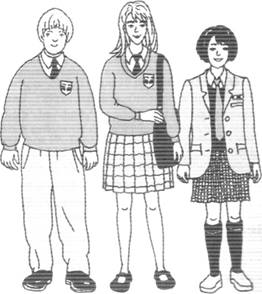
![]()
1 attitude [ lætltju:d] — OTH01L1eHHe
Listen to the text "School Uniform", (2), and write answers to
these questions.
1. Do all schools in Britain have school uniforms?
![]() 5
5
2. Is the speaker for school uniforms or against them?
c
![]()
![]()
3. Why does the speaker say that a uniform saves l time?
![]()
4.
5. Pupils in Britain usually have to wear grey or black trousers when they are at school, don't they?
![]()
6. Why does the speaker think jeans are the best thing for a school uniform?
![]()
7. What uniforms in the speaker's view
are good for the summer?![]()
![]()
![]()
1 to save [sew] — 3ð.: 3KOHOMHTb
8. Who thinks vidual dress
 6
6
c
Read the words in
[baitDlacËi]
[tkemlstri]
[IdlkSnri]
[111tratSa]
['srzaz]
![]() Read the words, check, @ (4).
Read the words, check, @ (4).
|
|
|
transcriptions, then listen and check, (3).
word combinations and sentences, then listen and
a) age, backpack, chalk, examination,
science, foreign, geo![]() graphy, glue, noisy, paint, physical education, pencil
graphy, glue, noisy, paint, physical education, pencil ![]() sharpener, pencil case, secondary,
subject
sharpener, pencil case, secondary,
subject
b) ![]() a good education, my best schoolmate,
a primary school, a long ruler, to speak loudly, his exercise book, a famous
college, a noisy street, to pay money, a lot of glue, a pair of scissors
a good education, my best schoolmate,
a primary school, a long ruler, to speak loudly, his exercise book, a famous
college, a noisy street, to pay money, a lot of glue, a pair of scissors
c) Yesterday we painted the walls of our
classroom. This ![]() school is the best place in the town to get secondary ed
school is the best place in the town to get secondary ed![]() ucation. Joe doesn't know mathematics
very well. Phys
ucation. Joe doesn't know mathematics
very well. Phys![]() ics is a difficult science. My elder sister (brother) is
ics is a difficult science. My elder sister (brother) is ![]() fond of linguistics. Lizzy took off
her coat and entered
fond of linguistics. Lizzy took off
her coat and entered ![]() the classroom. We decided to talk our holidays plans
the classroom. We decided to talk our holidays plans ![]() over. Secondary education is free in
this country. He is interested in stamps and has a good collection of them. Are
only children different?
over. Secondary education is free in
this country. He is interested in stamps and has a good collection of them. Are
only children different?
![]() Read the paragraphs of the text (a—f) and put them in their logical
order.
Read the paragraphs of the text (a—f) and put them in their logical
order.
![]()
a)
We parted at the
school gates, I joined my schoolmates ![]() and my father went off. Ours was just
a small village
and my father went off. Ours was just
a small village ![]()
 school, with no rooms upstairs at all.
There were about sixty boys and girls in our school, and their ages went from
five to eleven. We had four classrooms and four teachers.
school, with no rooms upstairs at all.
There were about sixty boys and girls in our school, and their ages went from
five to eleven. We had four classrooms and four teachers.
b)
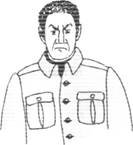 The next
day was Thursday, and before we set out for the walk to my school that morning,
I went around behind the house and picked two apples from our tree, one for my
father and one for me.7 c) A teacher, called Captain [ I kæptln]
Lancaster, taught the nine- and ten-year-oldsc and my year too. He was an awful
man. (During the war against Hitler he was a captain in the army.) He told us
to call him Captain Lancaster instead of just mister. My father said it was an
idiotic thing to do. Millions of people wanted to forget those military titles.
Captain Lancaster was a violent man, and we were afraid of him.
The next
day was Thursday, and before we set out for the walk to my school that morning,
I went around behind the house and picked two apples from our tree, one for my
father and one for me.7 c) A teacher, called Captain [ I kæptln]
Lancaster, taught the nine- and ten-year-oldsc and my year too. He was an awful
man. (During the war against Hitler he was a captain in the army.) He told us
to call him Captain Lancaster instead of just mister. My father said it was an
idiotic thing to do. Millions of people wanted to forget those military titles.
Captain Lancaster was a violent man, and we were afraid of him.
d)
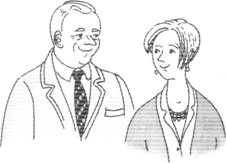 Miss Birdseye taught
the five-year-olds and six-year-olds, and she was a really nice person. Mr
Corrado took the sevenyear-olds. He was also a decent person. He was a very old
teacher, probably sixty or more, but that didn't stop him being in love with
Miss Birdseye. We knew he was in love with her because he always gave her the
bits of meat at lunch when it was his turn to do the serving. And when she
smiled at him, he would smile back in the most romantic way you can imagine.
Miss Birdseye taught
the five-year-olds and six-year-olds, and she was a really nice person. Mr
Corrado took the sevenyear-olds. He was also a decent person. He was a very old
teacher, probably sixty or more, but that didn't stop him being in love with
Miss Birdseye. We knew he was in love with her because he always gave her the
bits of meat at lunch when it was his turn to do the serving. And when she
smiled at him, he would smile back in the most romantic way you can imagine.
e) At eight o'clock we started walking down the road to my school in the pale autumn sunshine, eating our apples. I really loved those morning walks to school with my father. We talked practically the whole time. Mostly it was he who talked and I who listened, and just about everything he said was interesting. He was a true countryman and knew a lot about all the trees and the wildflowers and the different grasses that grew in the fields. f) It is a most wonderful thing to be able to go out and get your own apples whenever you feel like it. You can do this only in the autumn, of course, when the fruit is ripe but all the same how many families are so lucky? Not one in a thousand, I guess.
1. 2. 3.
4. 5. 6.
![]() Read the text and mark the sentences
after it as true (T), false (F) or
Read the text and mark the sentences
after it as true (T), false (F) or ![]() not stated (NS).
not stated (NS). ![]()
The holidays were over. Dave,
Jenny and Debbie met in the 8 schoolyard.
![]() We've got school on c Monday. Yuck!
We've got school on c Monday. Yuck!
Jenny: True. I can't believe that just a few days ago I was in the mountains in Scotland. What about you, Dave? You were somewhere in the sun. Your face is very brown. nave: Yes. I was in Greece with my parents. It was really hot there.
Debbie: Were you by the sea?
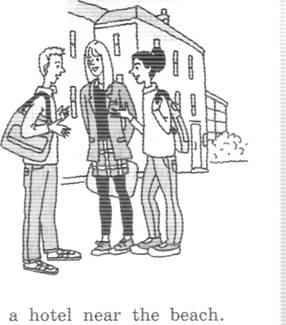 nave: Yes, we were. We stayed at a
hotel near the beach.
nave: Yes, we were. We stayed at a
hotel near the beach. ![]() What was it like?
What was it like?
![]() nave: It was really nice and there
was a fantastic open
nave: It was really nice and there
was a fantastic open ![]() swimming pool there. I can't tell you what I liked more
swimming pool there. I can't tell you what I liked more ![]() swimming in the sea or in the
swimming pool.
swimming in the sea or in the
swimming pool.
![]() Jenny: You must be joking, Dave.
Nothing can be better
Jenny: You must be joking, Dave.
Nothing can be better ![]() than swimming in the sea. But Debbie, you didn't tell us anything about
your holidays. What were they like? Where were you?
than swimming in the sea. But Debbie, you didn't tell us anything about
your holidays. What were they like? Where were you?
![]()
![]() I spent July with my grandparents in
the country-
I spent July with my grandparents in
the country- ![]() side. In August I was in Paris together with my cousins.
side. In August I was in Paris together with my cousins.
But we returned in the middle of the month.
Jenny: Why?
![]() They go to school in Berlin and they had to be back there before the 18th
August.
They go to school in Berlin and they had to be back there before the 18th
August.
![]() School in August? Yuck.
School in August? Yuck.
![]() Things do happen. But, honestly speaking, I feel that I already miss
school, and classes and our teachers.
Things do happen. But, honestly speaking, I feel that I already miss
school, and classes and our teachers.
So do I. By the way, we are going to have a new teacher, Miss Richardson.
Are we? What subject is she going to teach?
How interesting! Is she young? Where is she from?
I can't answer all your questions, guys. I don't know. But I'm sure on Monday we'll find it out.
1. Dave stayed at a five-star hotel in Greece.
2. Jenny enjoyed her holidays in Scotland.
3. Jenny thinks that swimming in the pool is worse than swimming in the sea.
|
4. Debbie spent the summer with her parents. |
9 |
|
5. Debbie's cousins are pupils of a school |
c |
|
in Germany. |
|
6. The friends' new teacher will be at school on Monday.
![]() Read the texts (1—4) and match them
with the titles (a—e). There is one title you don't have to use.
Read the texts (1—4) and match them
with the titles (a—e). There is one title you don't have to use.
a) Fashion and Climate d) Angry and Surprised
b) Useful Advice e) Positive Changes
c) Not Wanted
1.
2. I soon understood that our classes with the new teacher were quite different from Mr Florian's lessons. Every day they were becoming more and more interesting. The lessons were very informal, we could ask any question and discussed lots of problems important for us. The new teacher gave us much more than the textbook information.
3. When I began my teaching career, dad told me not to bring my pupils' works home. "It shows your poor planning, son," he said. "You'll find soon that you're busy every night. Teaching is like having a bank account. You should have new funds or you are in difficulties. Every teacher should have a fund of ready information and that means new ideas, new meetings, new discoveries, moving around among people."
4. One morning in our geography lesson we discussed the type of dress people wore in different climatic zones: Eskimos of Alaska and their dress of animal skins, people living in the south and their thin cotton or silk clothes. Larry said that many people in the tropics put very little on and some of them just used a bit of paint here and there.
1. 2. 3.
4. Extra
10
c
Read the poem with a dictionary and say if you feel the same as its author. Why is it so or why is it not so? Is there any difference between what teachers can do and what pupils can do? What do you feel about it?
![]()
The teachers all sit in the staffroom
The teachers all drink tea The teachers talk to each other As cosy as can be.
![]()
![]() We have to go out at playtime
We have to go out at playtime
Unless we bring a note
Or it's raining heavily
Or we haven't got a coat. We have to do so many things.
Whether we like it or not.
And freeze to death if it's freezing.
And boil to death if it's hot.
The teachers can sit in the staffroom.
And have a nice little chat.
We have to do so many things; Where's the fairness 2 in that?
![]() Speak about the system of education in Britain. Mention:
Speak about the system of education in Britain. Mention:
e the age people start schooling;
• the number of school years pupils spend at school;
• stages of education;
• if schooling is private or state, if it is free;
• subjects pupils do at school;
•
school uniform;  school exams.
school exams.
![]() 10 Work in pairs. Complete the dialogue. Act it out with your partner. On
Sunday Tracy talked to Betty on the phone.
10 Work in pairs. Complete the dialogue. Act it out with your partner. On
Sunday Tracy talked to Betty on the phone.
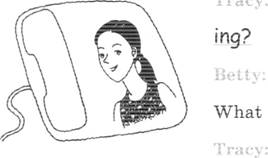 Tracy: Hi, Betty! (1) What are you
do-
Tracy: Hi, Betty! (1) What are you
do-![]()
11 I'm reading a really good book.
What are you doing? c
I'm phoning you.
![]() Very funny, indeed, Tracy. And (2)
Very funny, indeed, Tracy. And (2) ![]()
Tracy: Because I want to ask you to come to my house. Do you remember we have to make a talk about my mountain animals in our biology class?
![]() Good idea! (3)
Good idea! (3)
![]() Must it be Tuesday? I always help my mum with the shopping on Tuesdays.
Must it be Tuesday? I always help my mum with the shopping on Tuesdays.
'Vracy: What about Wednesday?
![]() No, (5) I always go to the swimming pool after school on Wednesdays.
No, (5) I always go to the swimming pool after school on Wednesdays.
![]() You can go there (6) We have our biology class on Thursday as far as I
know. Betty, I don't think you like my idea of doing the task together.
You can go there (6) We have our biology class on Thursday as far as I
know. Betty, I don't think you like my idea of doing the task together.
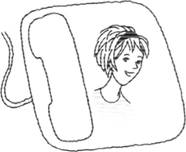 getty: I do. But I don't like to go
to the swimming pool on Saturday.
getty: I do. But I don't like to go
to the swimming pool on Saturday.
There are so many people there.
Look, why don't we meet tomorrow?
be late.
Comment on these proverbs.
|
Spell the words. |
|
|
|
|
|
1. |
[tsAt*1kt] |
subject |
9. |
[Imju:zlk] |
|
2. |
[mrs'terk] |
|
10. |
[tedjulker§n] |
|
3. |
['prarmari] |
|
11. |
['kD11(Ë] |
|
4. |
[isalans] |
|
12. |
|
|
5. |
['form] — |
|
13. |
['dole] |
|
6. |
['kemßtri] |
|
14. |
|
|
7. |
['finks] |
|
15. |
[t3:ml |
|
8. |
|
|
16. |
[hæpn] |
![]()
![]()
![]()
![]()
![]()
![]()
![]() Learn to walk before you run. 12 Knowledge
is power.
Learn to walk before you run. 12 Knowledge
is power.
![]()
c
|
|
|
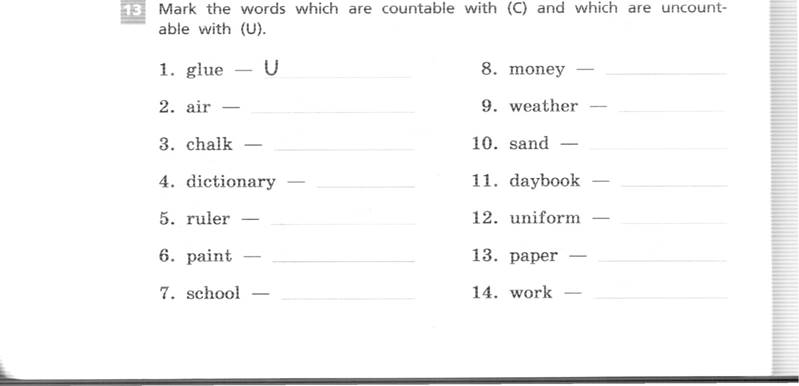
![]()
Write the names of these things.

 13
13
1. exercise ![]()
![]() book
book

![]()

![]()

10. 11. 12.
![]()
![]()
15 Complete the sentences with the new words from the box.
![]()
backpack, brushes, classmates, dictionary, foreign, loudly, paints, paper, pencil case, pencil sharpener, subjects, uniform
![]()
|
14 |
1. There are pens |
and pencils of different colours in my |
|
|
pencil case. 2. |
I must look this word up in the |
c
![]() 3. Bring and
3. Bring and
to
your art class. 4. I need some ![]() to write down your address. 5. I carry my exercise books, textbooks and
my daybook to school in
to write down your address. 5. I carry my exercise books, textbooks and
my daybook to school in
the 6. Grace is a very good student.
She always has good and excellent marks in all the
![]()
![]()
![]()
![]()
![]()
![]()
![]()
![]()
![]()
![]()
![]()
![]()
![]()
![]()
![]()
![]()
![]()
![]()
![]()
![]()
![]()
![]()
![]()
![]()
![]()
![]()
it yesterday, and all my pencils became sharp in no time.
16 Match the names of the subjects and their definitions.
|
1. |
Biology |
a) the study of numbers and shapes including algebra, ge- |
|
2. |
Art |
ometry and arithmetic |
|
3. |
Mathematics |
b) the subject that gives you ideas about composers and |
|
4. |
Physics |
their works c) a class in which you exer- |
|
5. |
Music |
cise your body |
|
6. |
Literature |
d) the science that deals with |
energy, studies light,

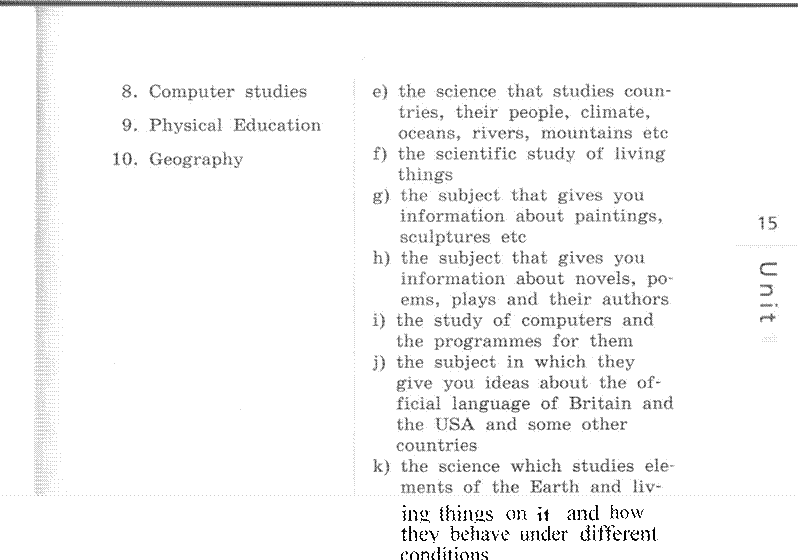
1. 2. 3.
![]()
4. 5. ![]() 6.
6.
7. 8. 9.
10. 11.
Write how many times a week you have these subjects.
|
|
|
2. ![]()
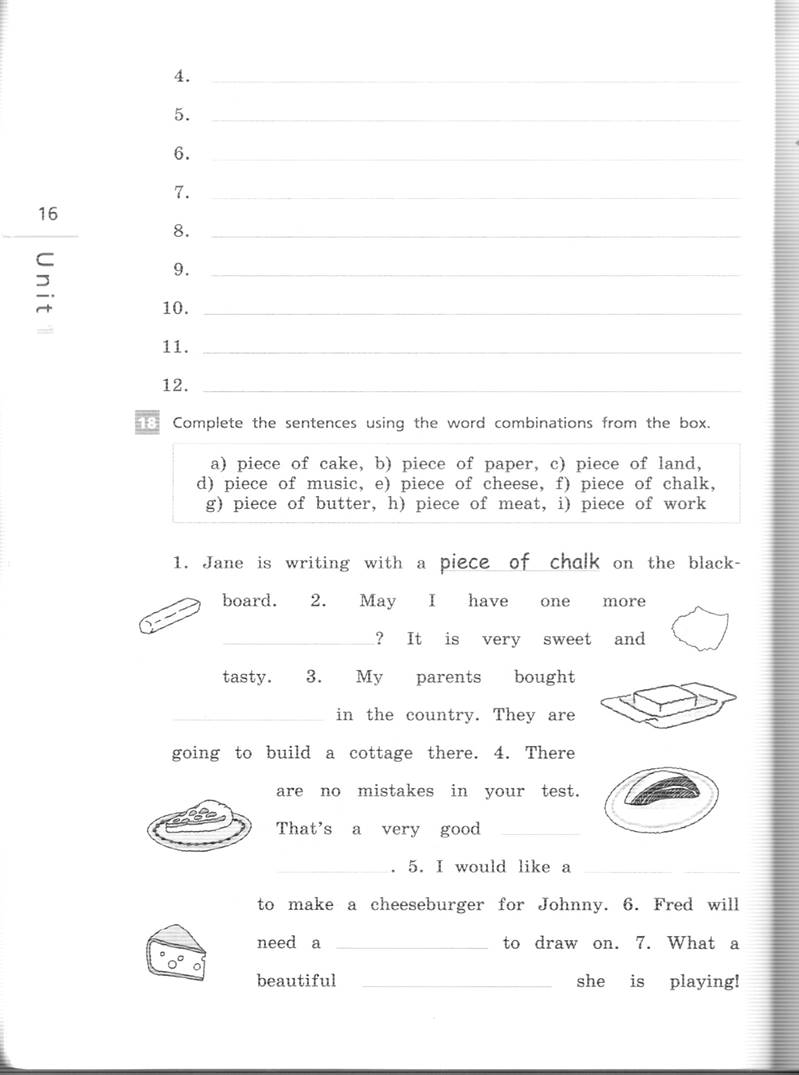 3.
3. ![]() 4.
4.
5. 6.
7.
16
8.
c
9.
10.
11.
12.
18 Complete the sentences using the word combinations from the box.
a) piece of cake, b) piece of paper, c) piece of land,
d) piece of music, e) piece of cheese, f) piece of chalk,
g) piece of butter, h) piece of meat, i) piece of work
1. Jane is writing with a piece o€chalk on the black-
board. 2. May I have one
![]() ? It is very sweet and tasty. 3. My parents bought
? It is very sweet and tasty. 3. My parents bought
in the country. They are
8. I'll need a bigger ![]() to make soup. 9. I would like a
to make soup. 9. I would like a ![]() on
on
my porridge.
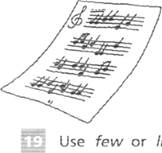
![]() 19 Use few or little to complete
these phrases.
19 Use few or little to complete
these phrases.
17
1. little cheese 9. rubbers
2. glue 10. paper
3. boots 11. butter
4. classes 12. paints
5. rulers 13. brushes
6.
![]() juice 14.
juice 14.![]() bread milk 15. water
bread milk 15. water
8.work 16. chalk
![]()
1.
those boots 9. ![]() pair of trousers
pair of trousers
2. mistakes 10. slippers
3.
pair of shoes 11. ![]() pair of stockings
pair of stockings ![]() trainers 12.
trainers 12. ![]() pair of mittens
pair of mittens
5. gloves 13. jeans
6. pair of socks 14. pair of specs
7.
scissors 15.![]() spectacles
spectacles
8. pair of leggings 16. pair of shorts
![]() Choose the appropriate forms of the verbs in brackets to complete the
sentences.
Choose the appropriate forms of the verbs in brackets to complete the
sentences.
1. Mathematics (was/were) was my favourite subject last year, now physics (is/are) 2. There (was/were)
![]() my granny's spectacles on the book she was reading. 3. There (was/ were)
a pair of shoes in the hall. 4. Linguistics (is/are) a very interesting
science. 5. Students should wear uniforms in this school. The
my granny's spectacles on the book she was reading. 3. There (was/ were)
a pair of shoes in the hall. 4. Linguistics (is/are) a very interesting
science. 5. Students should wear uniforms in this school. The
18
![]()
![]()
![]()
![]()
![]()
![]()
![]()
![]()
![]()
![]()
![]()
![]()
![]()
![]()
![]()
![]()
![]()
![]()
![]()
![]()
![]()
![]()
![]()
![]()
![]()
![]()
![]()
![]()
![]()
![]()
![]()
![]()
![]()
![]()
![]()
![]()
![]()
![]()
![]()
![]()
![]()
![]()
![]()
![]()
![]()
![]()
![]()
![]()
![]()
![]()
![]()
![]()
![]()
![]()
![]()
![]()
![]()
![]()
![]()
![]()
![]()
![]()
![]()
![]()
![]()
![]()
![]()
![]()
![]()
![]()
![]() uniforms (is/are) very traditional:
black skirts or c trousers, white shirts or blouses and black ties. 6. My jeans
(is/ are) a bit too long. 7. His shoes (is/are)
uniforms (is/are) very traditional:
black skirts or c trousers, white shirts or blouses and black ties. 6. My jeans
(is/ are) a bit too long. 7. His shoes (is/are)
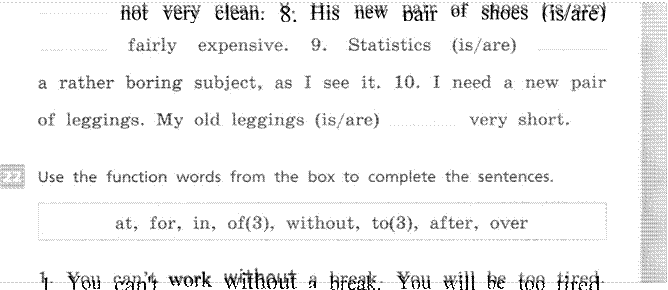
2.
Is Jane going
college school? 3. When are the classes on Friday? 4. I'm going to pay ![]() the chocolate
the chocolate ![]() dollars in the duty-free shop.
dollars in the duty-free shop.
5. I'm
not sure these facts. 6. Something very unusual happened Mr Carter when he was
walking through the park the other day. 7. Can you talk ![]()
Helen, please? She looks so sad. 8. John says he is tired your constant lies. 9. what age do children

Complete the sentences with the appropriate function words.
1. Who paid for the dinner? 2. What mark did Jack get science last Thursday? 3. I don't know what happened them. 4. Brian became a university student
|
|
|
||||||||||||||||||||||||||||||||||||||||
so
8. We didn't know anything about his
|
|
|
|
of badges. |
collect |
|
20 |
9. |
The |
Mississippi is a great and river in North America. |
power |
|
|
10. |
What |
uniforms these of- |
beauty |
c
ficers are wearing!
Complete the text using the derivatives of the words on the right.
Soon I understood I began to like my new
|
school. I didn't feel (1) unhappy any more. |
happy |
|
All my classmates were quite (2) |
friend |
|
My new (3) s explained the rules |
teach |
|
and other things (4) well. I could understand everything and very soon I became |
fair |
|
really (5) Practically all the les- |
success |
|
sons were (6) Soon I made friends with many girls and boys of my class. |
interest |
|
At first I was rather (7) about the clothes they were wearing. I thought their |
critic |
|
skirts and jeans were (8) for school wear but then I understood they wanted |
suitable |
|
to look (9) from each other and I |
differ |
just ignored their clothes.
Write American English words for these British English nouns.
1. autumn fall 3. holidays
2. pupil 4. football
27 Choose the appropriate verbs in brackets to complete the sentences.
1. People often (say/tell) tell me about their problems.
2. Gwen doesn't (talk/speak) German very well.
3. Mr Brown was (speaking/talking) in front of 21 the school for half an hour. 4. My classmates and me often
c
(talk/ tell) about our favourite TV shows. 5. Never (tell/say) lies. 6. Try to (say/ tell) the
truth. 7. I don't like physics very much. Everybody (says/ tells) it is a difficult subject, and I agree.
8.
![]() Could you
(tell/say) us the time, please?
Could you
(tell/say) us the time, please?
9.
Brussels. "
Choose the appropriate words in brackets to complete the sentences.
1. I hope I'll talk him (back/into) into learning Chinese.
It is important for his job. 2. Never talk (back/out) ![]() to your parents. 3. The journey to
to your parents. 3. The journey to
Australia is very tiring l , let's talk him (out of/over) ![]() it. 4. I don't understand what the
programme of his visit is. Let's talk it (out of/over)
it. 4. I don't understand what the
programme of his visit is. Let's talk it (out of/over)
5. I know that the expedition will be very dangerous. Let's
talk him (out of/over) ![]() taking part
taking part
in it. 6. Mike's parents should talk to their son. He always
![]()
1 tiring ['talarll)] — YT0MwreJ1bHb1ii
talks (back/over) to his teachers. 7. There is a ![]() very nice and fashionable dress in
the local shop. I want to
very nice and fashionable dress in
the local shop. I want to ![]() talk you (into/over) buying it.
talk you (into/over) buying it.
|
c |
1. How do you say |
a) Your lesson began 10 minutes |
|
|
in |
ago. You open the door and |
|
|
English? |
come in. You say... |
|
|
2. Shall I go to the blackboard? |
b) Your lesson began 10 minutes |
|
|
3. May I come in? |
ago. You open the door and |
|
|
4. What do we have |
before entering you ask... |
|
|
to do next? |
c) You are not sure what to do |
|
|
5. I'm sorry, I'm |
after you finish your task. |
|
|
late. |
You say... |
|
|
6. May I take my |
d) You didn't come to biology |
|
|
seat now? |
class yesterday. You want |
|
|
7. I couldn't come |
to explain to your teacher |
|
|
to school yester- |
why. You say... |
|
|
day. I was un- |
e) You left the book where teach- |
|
|
well. |
ers put your marks at home. |
|
|
8. I'm sorry, I |
You say... |
|
|
haven't got my |
f) You are not sure if you should |
|
|
daybook with me |
leave your seat or can answer |
|
|
today. |
from it. You say... g) You are not sure if you can go back to your seat. You say... h) You do not know the English |
Match the sentences (1—8) with the situations where you can use ![]() 22 them (a—h).
22 them (a—h).
equivalent for some Russian word. You say...
2. 3. 4.
7. 8.
5. 6.
a 30 You already know some English words with school as the first element. Look up in the dictionary what some other words with school as the first element mean. Write down their meanings in Russian.
1. schoolyard — UJKOJ1bHb1ÿ1
ABOP![]()
2. schoolkid ![]()
3. school friend ![]() 23
23
4. school dinner ![]() c
c
5. school room ![]()
6. schoolwork![]()
7. schoolbook![]()
8. school time ![]()
![]() How well do you know the English
system of education? Complete the sentences in writing.
How well do you know the English
system of education? Complete the sentences in writing.
1. English pupils start schooling at the age Of five.
2.
3. Secondary education in England lasts ![]()
4, Pupils in England usually leave school at but some of them stay at school for 2 more years.
5. Most children in England do not go to private schools, they go to
6. English schools have no numbers, they
![]()
7. Parents do not pay for their children's education
8.
English school
year never begins ![]()
9.
In primary
schools pupils usually don't wear ![]() but in secondary schools
but in secondary schools
10.
11.
![]() The
English school year has terms.
The
English school year has terms.
12. Classes are over at
![]() 24 13.
Pupils go to schooldays a week.
24 13.
Pupils go to schooldays a week.
14.
15. ![]() Lunch break usually lasts
Lunch break usually lasts
|
It was autumn. The |
weather became (1) cold- |
cold |
|
er and the days |
(2) Anna |
dark |
|
(3) to |
feel very tired. One day |
begin |
|
she (4) |
back home from school. |
walk |
|
Suddenly she (5) |
she couldn't |
feel |
|
stand it any longer. |
(6) work at |
she |
|
school was getting |
(7) and not |
bad |
|
(8) |
No matter what she |
good |
|
(9) |
there a lot of |
|
|
(10) in her tests and dictations. |
|
|
![]()
![]()
![]()
![]()
![]()
![]()
![]()
![]() 33
33
Use a/an, the or no article to complete these sentences.
3. When do you go to bed? 4. My favourite bed in
the country house is bed near the window. 5. Many ![]() families in the USA go to church on
Sundays.
families in the USA go to church on
Sundays. ![]()

o 6. Many churches are beautiful old buildings. 7. Our house is opposite Baptist church. 8. Church of England is very important in Great Britain. 9. On Sundays
I like to spend some time just lying in bed. 10. When
John became ill, they took him to hospital. 11. The 25 s grey low building is not school, it's hospital.

![]()
![]()
![]()
![]()
![]()
![]()
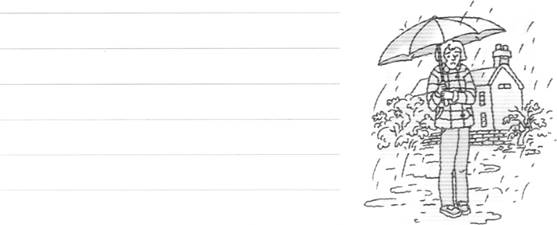 they have done is really successful.
14. Nelly goes to school five days a week. 15. hospital where Doctor Farrel
works is not very famous.
they have done is really successful.
14. Nelly goes to school five days a week. 15. hospital where Doctor Farrel
works is not very famous.
Describe your first day at school. Write what you did on that day (8—10 sentences).

36 See if you know the right answer2 .
![]() 1896, where were the first modern Olympics held?
1896, where were the first modern Olympics held?
a) France
b) the United
c) Greece
d) Russia
2. Which is the
a) alpha
b) beta
c) iota
d) omega
3. Which is not
a) sight
b) touch
c) smell
d) speech
4. Who painted
 27
27
States
c
last letter of the Greek alphabet?
13 ![]() one of the five senses?
one of the five senses?
The Last Supper?
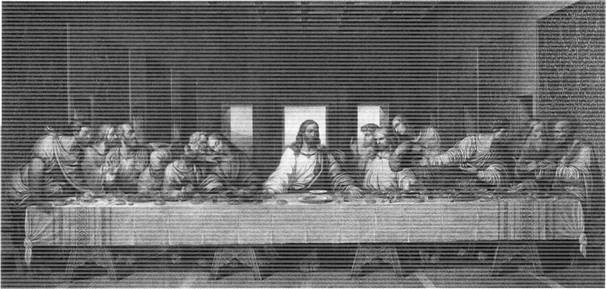
a) Leonardo da Vinci d) Bellini
b) Michelangelo c) Raphael
![]()
1 Use a dictionary for this section
2 See the answers on page 29
28
c
![]()
![]() order.
order.
sheep?"
e) "Me!"
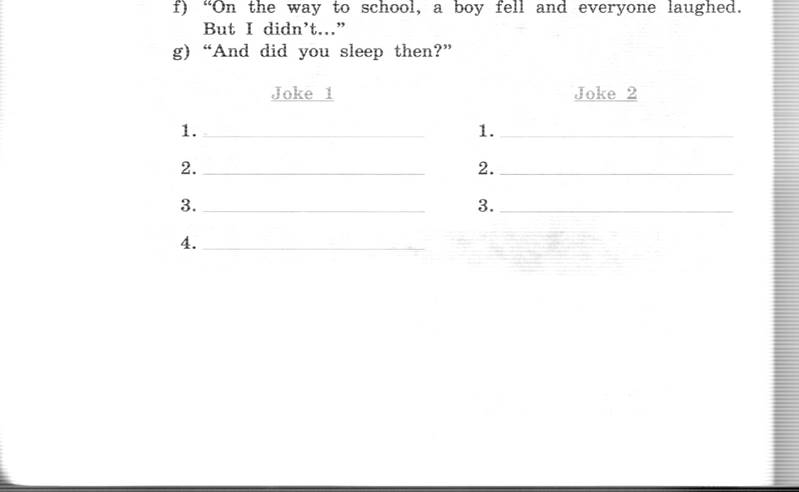
![]()
![]()
![]() U nit f byo
U nit f byo
The Language of the World
![]() 29
29
1. The speaker and his friends are classmates.
2. The three friends are interested in football.
3. The three friends went to Copenhagen to watch a football match.
4. It took the friends about half an hour to find the Irish pub.
5. The boys could hardly understand Danishl .
6. The boys enjoyed their trip to Europe.
7. English helped them in all European countries.
![]()
1 Danish [ idem1S] — AaTCKHii
![]()
![]()
![]() Listen, (6), and decide which of the
problems (1—5) Glenda Morrison, a linguist, doesn't speak about.
Listen, (6), and decide which of the
problems (1—5) Glenda Morrison, a linguist, doesn't speak about.
1. It's natural for people to have a "lingua franca".
2. Some European languages were a kind of "lingua franca" at different times.
303. People use English nowadays in different areas of our lives.
4. If your native language is dying out, you must try and keep it alive.
5. Some people dislike the fact that English is becoming the global tongue.
 Read the words in transcriptions,
then listen and check, (7).
Read the words in transcriptions,
then listen and check, (7).
[tfDlau] [pratnauns] ['probabli]
['endlas] [vao'kæbjulari] [ju:slas]
[Imi:nll)] [fæn I tæstlk] [dllvelap]
[idlk§nari] [o:fl] [o:liredi]
[pr11f3:] [saund] [tAÏ)]
![]() Read the words, word combinations and sentences, then listen and check,
(8).
Read the words, word combinations and sentences, then listen and check,
(8).
a) air, already, beginning, borrowing, carry, develop, dislike, even, ever, happening, meeting, speechless, children, borrow, need
b)
fresh air, a
French borrowing, an unusual beginning, to ![]() carry a suitcase, to develop slowly,
to dislike swimming,
carry a suitcase, to develop slowly,
to dislike swimming, ![]() an awful story, to borrow a book, an endless meeting,
an awful story, to borrow a book, an endless meeting, ![]() a fantastic sound
a fantastic sound
c)
![]() I have just
finished doing my homework. Bob has read a fantastic book. There was a yellow
balloon in the air. Sara has come to an important meeting. Can you pronounce
this sound, please? I have taken an English dictionary from the library. They
don't know any foreign languages, so they speak their mother tongue. Could you
follow me? He hasn't read the letter yet. The student
I have just
finished doing my homework. Bob has read a fantastic book. There was a yellow
balloon in the air. Sara has come to an important meeting. Can you pronounce
this sound, please? I have taken an English dictionary from the library. They
don't know any foreign languages, so they speak their mother tongue. Could you
follow me? He hasn't read the letter yet. The student  has pronounced the new words slowly.
has pronounced the new words slowly.
rri- Read the text and answer the questions after it.
![]()
My name is Kate and this summer, in August, I was at the International Camp in Germany, where I studied German. We lived in a small town of Stein 31 [stain], which is situated in Bavaria [be l veeriê]. We lived in sin- c gle or double rooms in the building of the castle. Most of the day we spent outside, where the weather was always warm and sunny.
On the second day the lessons started. My teacher's name was Norbert, he lived in Bonn. The lessons were never boring even when we studied grammar. Norbert always knew how to turn the rule into a game. Because there were people from many countries in my group, I was unable to speak Russian, and that helped my German greatly.
We also visited the Alps and took in the fresh air. What I liked most about this trip were the cows, which I've never seen so close before.
We went to big cities twice: first to Salzburg [ßæltsb3:g] 1- and then to Munich [ I mju:nlk]. They are really beautiful. In Salzburg we visited Mozart's house, and in Munich — the German Museum, the section of space and air travel.
![]()
![]() It was really important for me in
Stein to talk to people from other countries. Because you don't often talk to
young foreigners in Moscow, do you? They were from the USA, England, Wales,
France, Spain, Venezuela [,venl t zwerla], d Hungary, Morocco,
Croatia, Latvia, Lithuania and so on. But Russians won 18 of 96 were from our
country.
It was really important for me in
Stein to talk to people from other countries. Because you don't often talk to
young foreigners in Moscow, do you? They were from the USA, England, Wales,
France, Spain, Venezuela [,venl t zwerla], d Hungary, Morocco,
Croatia, Latvia, Lithuania and so on. But Russians won 18 of 96 were from our
country.
I really liked my journey; I met a lot of interesting and unforgettable people and probably became a little bit more daring l . I am sure that life in a foreign country makes people think in a different way. It makes them stronger and more understanding.
1 daring ['dearll)] — OTBaYHb1ii
![]() Read the paragraphs (a—f) of the text
and put them in the logical order.
Read the paragraphs (a—f) of the text
and put them in the logical order.
![]()
a) "No wonder you can't do your homework," mama said. "You put it off until you're too tired. You'll never learn anything if you work like that." 33
![]() That was exactly what I felt and I
began crying. "I do try," I cried, "but I'm not able to learn
French!" "Of course you can do it," said mama. "Look, if I
help you..." But I shouted, "No."
That was exactly what I felt and I
began crying. "I do try," I cried, "but I'm not able to learn
French!" "Of course you can do it," said mama. "Look, if I
help you..." But I shouted, "No."
Mama smiled and said, "Well, I don't think you'll be able to do any homework today. I have to buy some fish for supper. Come with me and get some fresh air."
b) "All right," I said. We stayed for a while longer because it was such a pleasant place to be.
"Nice to go out to tea with my daughter," said mama at last and smiled. I smiled back.
The bill came and we understood there was not enough money left for fish, but it did not matter.
c) My name is Anna and I am living now in Paris which is a beautiful city. We moved here half a year ago. I go to a French school and have to learn French. I find it very difficult. And we usually have a lot of homework to do each day. History and geography teachers tell us to learn texts by heart and to write essays, we also do grammar exercises and all that in a language which I still don't understand.
d) We sat down at one of the little tables.
"Look," said mama. "I know it's difficult for you and I know you're tired. But what can we do? We're living in France and you have to learn French."
"I get so tired," I said, "and I'm getting worse instead of better. I think I'm just one of those people who can't learn languages. "
![]() "That's nonsense, Anna,"
mama said. "You have done very well so far. And you will learn French, I
know you will. I'll tell you what we'll do. It's only two months till
Christmas. Will you try just once more? If you feel you still can't manage by
Christmas, we'll do something
"That's nonsense, Anna,"
mama said. "You have done very well so far. And you will learn French, I
know you will. I'll tell you what we'll do. It's only two months till
Christmas. Will you try just once more? If you feel you still can't manage by
Christmas, we'll do something
about it. I don't quite know what, but I promise you ![]() I'll think of something. All
right?"
I'll think of something. All
right?"
e) ![]() One evening in my room I was looking
at my homework instead of doing it. I thought that my work was getting worse
and worse. In class I often knew the answers, but it took me so long to
translate them into French in my 34 mind that it was usually too late to give them.
I was really tired of trying. Suddenly mama came and looked c at my exercise
book. It was maths. There was only one word on the page "Problems,"
nothing more.
One evening in my room I was looking
at my homework instead of doing it. I thought that my work was getting worse
and worse. In class I often knew the answers, but it took me so long to
translate them into French in my 34 mind that it was usually too late to give them.
I was really tired of trying. Suddenly mama came and looked c at my exercise
book. It was maths. There was only one word on the page "Problems,"
nothing more.
f)
We walked down
the street together without talking. ![]()
There was a cake shop next to the fish shop.
"We'll go in here," mama said to my surprise.
![]()
![]() "I'll have a cup of tea and you
can have a cake; then we'll have a talk."
"I'll have a cup of tea and you
can have a cake; then we'll have a talk."
"Isn't it too expensive?" I asked.
''MTe can buy one cake," mama said.
2. 3.
4. 5. 6. ![]()
![]() Read the text and complete it with the phrases (a—f).
Read the text and complete it with the phrases (a—f).
a) often last longer than sixty minutes
b) like the air
c) an American linguist
d) except i on very cold days
e) people create languages
f) and it is not from Guinea2
Have you got any problems with English? Does it sometimes seem too
difficult or illogical? Richard Lede-![]()

![]()
![]()
![]()
![]()
![]() ou[1] esting
things about his native language. Here are some
ou[1] esting
things about his native language. Here are some
of them. irk
ng Let's face it English is a crazy language, the most luna-
Jut ny tic of all languages.
|
ras |
35 In the crazy English language, blackboards can be green or |
![]() c
c
neblue, and blackberries l are green, then red and black only
in the end.
g.
There is no egg in eggplant[2] , no grape in grapefruit, and enno room in mushroom, neither pine nor apple in pineapple[3] ,
and no ham in hamburger.
(2)
Language is
(3) we breathe ![]()
we just use it. But when we take the time to listen to what we say, we find that hot dogs can be cold and we
can do homework at school. Hours especially rush
hours (4) and most bath-
rooms don't have any baths in them but have showers. Why is it that a king rules a kingdom but a queen doesn't
rule a queendom?
If the plural of tooth is teeth, shouldn't the plural of
booth[4] be beeth?
If [5]people make olive, what do they make
baby oil from? If hard is the opposite of soft, why is hardly not opposite of
softly? If harmless actions are the opposite of harmful ![]() actions, why are shameful behaviour
and shameless behav-
actions, why are shameful behaviour
and shameless behav-![]()
36
iour
the same? Why are priceyl objects less expensive than ![]()
c priceless ones?
![]()
![]() Why is it that the Sun or the Moon or
the stars are out,
Why is it that the Sun or the Moon or
the stars are out, ![]() they are visible[6][7] , but when the lights are
out, they are invisible3?
they are visible[6][7] , but when the lights are
out, they are invisible3?
And in what other language can your nose run?
![]()
![]()
![]()
![]()
![]()
![]() because (5) not computers.
because (5) not computers. ![]() That's why six, seven, eight and nine
change to sixty, sev-
That's why six, seven, eight and nine
change to sixty, sev- ![]() enty, eighty and ninety, but two, three, four and five do
enty, eighty and ninety, but two, three, four and five do ![]() not become twonty, threety, fourty
and fivety. That's why
not become twonty, threety, fourty
and fivety. That's why ![]() we wear a pair of pants but, (6) not a pair of shirts. That's why when I
wind upd my
we wear a pair of pants but, (6) not a pair of shirts. That's why when I
wind upd my ![]() watch, I start it, but when I wind up[8] a
speech or an essay[9] , I end it.
watch, I start it, but when I wind up[8] a
speech or an essay[9] , I end it.
1. 2. 3.
4. 5. 6.

Speak about English as a global language. Use these word combinaul tions.
37
It, ![]()
n-
![]() 's s.
's s.
10
s-
![]()
![]() Speak about how English developed.
Mention the following:
Speak about how English developed.
Mention the following:
• English in the 16th century (on the British Isles and on the continent);
• the
importance of English nowadays; ![]() people's wish to learn English.
people's wish to learn English.
Describe some place you have visited (in Russia or abroad). Mention:
![]()
![]() what place you have visited; when it was; with
whom you went there; what places of interest you saw; t what you liked/disliked
there;
what place you have visited; when it was; with
whom you went there; what places of interest you saw; t what you liked/disliked
there;
• if you used English during your journey.
![]()
![]()
![]()
![]()
 Complete the
dialogue and act it out in class.
Complete the
dialogue and act it out in class.
![]() So, Linda, you have decided to go to university after school, (1) haven't
So, Linda, you have decided to go to university after school, (1) haven't
38
c Yes. I think that a university is important nowadays.
![]() True, especially, if you are certain
about the kind of education you want to get.
True, especially, if you are certain
about the kind of education you want to get.
![]() Oh, I'm sure of it. I would like to be a linguist.
Oh, I'm sure of it. I would like to be a linguist.
![]() So, you are interested in languages, (2)
So, you are interested in languages, (2) ![]() Very much so.
Very much so.
![]() But why (3)
But why (3)
![]() Because languages are like living things, they grow and develop, Some
words appear, some disappear. People be
Because languages are like living things, they grow and develop, Some
words appear, some disappear. People be![]() gin to pronounce old words in
different ways. Almost all
gin to pronounce old words in
different ways. Almost all ![]() languages change. English is also changing.
languages change. English is also changing.
![]() (4) 9.
(4) 9.
![]() Yes, I'm going to study it scientifically.
Yes, I'm going to study it scientifically.
![]() (5)
(5)![]()
![]() I mean that I would like to know when English appeared, and how it has
changed, how many people know or
I mean that I would like to know when English appeared, and how it has
changed, how many people know or ![]() learn it.
learn it.
![]() Everybody knows the answer to the last question.
Everybody knows the answer to the last question.![]()
![]() Do they? And (6)
Do they? And (6) ![]()
 of languages you know.
of languages you know.
|
|
|
tongue |
9. |
|
|
|
2. |
[ikæri] |
|
|
10. |
[saund] |
|
3. |
[pryif3:] |
|
|
11. |
[o:llredi] |
|
4. |
[pra'naunsl |
|
|
12. |
[I:vn] |
|
5. |
[spi:tf] |
|
|
13. |
[Ineva] |
|
6. |
['probablil |
|
|
14. |
[dwelop] |
![]()
![]()
![]()
![]()
![]()
![]() Who does not know another language
does not know his own. (Goethe)l
Who does not know another language
does not know his own. (Goethe)l
![]() English is a
trap? for a foreigner. 39
English is a
trap? for a foreigner. 39
Spell the
words. ![]()
7. [ifDlau] ![]() 15. [ aonli]
15. [ aonli] ![]()
8. [greitl ![]() 16. [lealas]
16. [lealas]![]()
Use the new words from the box to complete the sentences.
borrow, develop, even, only, maybe, prefer, probably, pronounce, speech, vocabulary
1. Are only children really special? 2. My little cousin can
hardly the sound 3. Languages like people are born, change, and can die. 4. I had to
![]()
![]() several rubles to pay for the
dictionary, the money I had wasn't enough. 5. If you read a lot, your
several rubles to pay for the
dictionary, the money I had wasn't enough. 5. If you read a lot, your
1 Goethe [ Iga:ta] — IdoraHH
B0J1b(þraH1' I'ërre (1749—1832), ![]() 1109T 2 trap [træp]
— J10BY111Ka
1109T 2 trap [træp]
— J10BY111Ka
![]() becomes larger. 6. Do you
becomes larger. 6. Do you  a strong cup of tea to a cup of
coffee for breakfast?
a strong cup of tea to a cup of
coffee for breakfast?![]()
![]() I'll
start learning French next year but
I'll
start learning French next year but ![]()
I haven't decided yet.
8. Mr Farrell's ![]() at the
at the ![]()
40 opening ceremony was successful. 9. a child
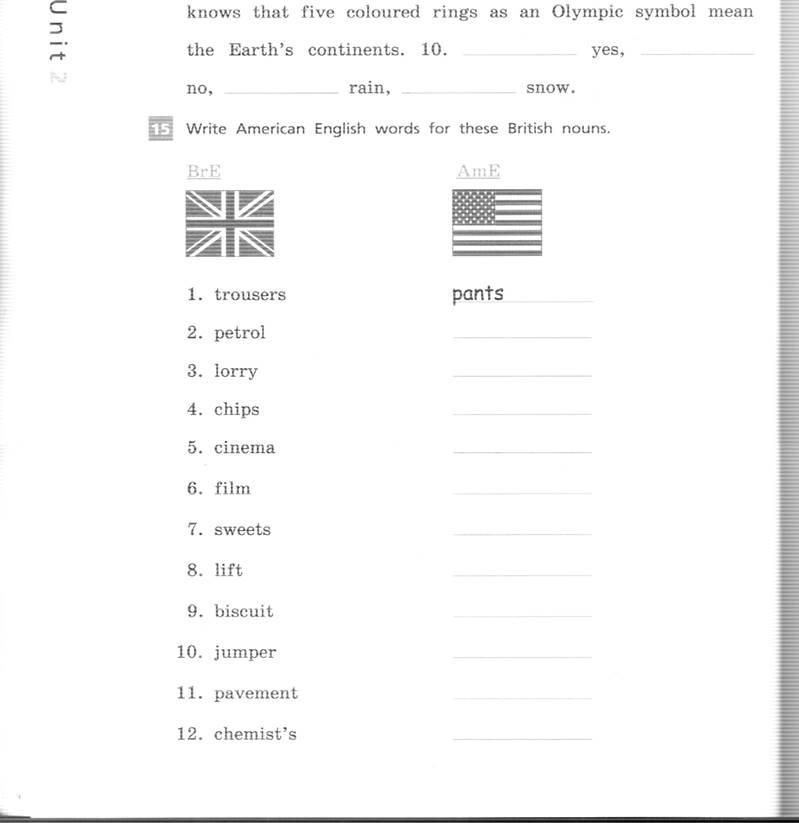

1. There are one thousand five hundred and twenty-eight jut pages in Longman (Dictionary/Vocabulary) Dictionary of
he the English language. 2. Our physics teacher gave us test
41
![]() ildpapers and asked us to hand them
(in/out) on an Wednesday. 3. Could you hand (in/out)
ildpapers and asked us to hand them
(in/out) on an Wednesday. 3. Could you hand (in/out) ![]() these gifts c
these gifts c
to the children after dinner? 4. Mrs Thompson looked through my notes and
handed them (back/out) ![]() to
to
me. 5. "Rebecca, Mr Brian needs a Russian-English dictionary. Can
you hand it (out/over) ![]() 'P" 6. Wherever we go, Paul (borrows/ follows) us. 7. The pupil was
not sure (of/ from) the word spelling. 8. They have never been (in/to)
'P" 6. Wherever we go, Paul (borrows/ follows) us. 7. The pupil was
not sure (of/ from) the word spelling. 8. They have never been (in/to) ![]() Japan. 9. My little cousin already
has the (dictionary/vocabulary) of 50—60
Japan. 9. My little cousin already
has the (dictionary/vocabulary) of 50—60
words. 10. The details of the future project are not clear.
Would you like to talk them (in/over) now?
17 Use the derivatives of the words on the right to complete the sentences.
|
1. The new show was really colourful and impressive. |
|
colour |
|
2. Mr Rogers stood for several sec- |
|
speech |
![]()
![]()
![]() onds, he did not know what to
onds, he did not know what to ![]() simple say.
simple say.
3. While reading, Gerald couldn't pronounce several words correctly and the teacher asked
him to the text. read
|
|
|
4. "Mike, you shouldn't be that |
care |
|
42 |
|
when you write s. You have missed several words again!" 5. Susan Scott is going to become a |
dictate |
|
|
|
|
paint |
|
c |
|
school. |
|
|
|
|
6. The sun was shining in the |
bright |
|
|
|
blue sky. |
cloud |
|
|
|
7. Professor Springle had a mixed |
feel |
|
|
|
of joy and sadness at
their final |
meet |
|
|
|
8. They are indeed to live on this fantastic island. |
luck |
|
|
|
9. Mr Pullin saw rows of serious faces in front of him. |
smile |
|
|
|
10. Robert was a nice boy. |
friend |
|
|
|
Complete the text with the derivatives of the words on the right. |
|
![]() In one of his stories Oscar Wilde
said that the English have (1) really real everything in common with
In one of his stories Oscar Wilde
said that the English have (1) really real everything in common with
nowadays,
except, of course, language. That was (3)![]() certain
certain
a joke. But
speaking
Oscar Wilde

|
(5) languages?
Their grammar sys- |
differ |
|
|
terns are practically the same, lots of words are the same, but not all of them. The word "home- |
|
43 |
|
ly" (6) |
Britain |
|
|
(7) and in American
English not very good-looking. There is a whole |
please |
|
|
(8) of such words. Sometimes the |
collect |
|
|
same words have not the same (9) |
mean |
|
![]()
![]()
![]()
![]()
![]()
![]()
![]()
![]()
![]()
![]()
![]()
![]()
![]()
![]()
![]()
![]()
![]()
![]()
![]()
![]()
![]()
![]()
![]()
![]()
![]()
![]()
![]()
![]()
![]()
![]()
![]()
![]()
![]()
![]()
![]()
![]()
![]()
![]()
![]()
![]()
![]()
![]()
![]()
![]()
![]()
![]() s. For example the verb "to
guess" is "to
s. For example the verb "to
guess" is "to ![]() think" in America. Yet, both the nations speak the same language
English.
think" in America. Yet, both the nations speak the same language
English.
Write out international words from the box.
house, foreigner, play, football, banana, word, grapefruit, orange, television, hockey, drama, paper, primadonna, tennis, import, again, faucet, cousin, coffee, medicine, physics, sports, vocabulary, motherland, language, avocado, book, golf, progress, school, revolution, tragedy, circus, philosophy, computer, bookcase, president, Internet
![]()
![]()
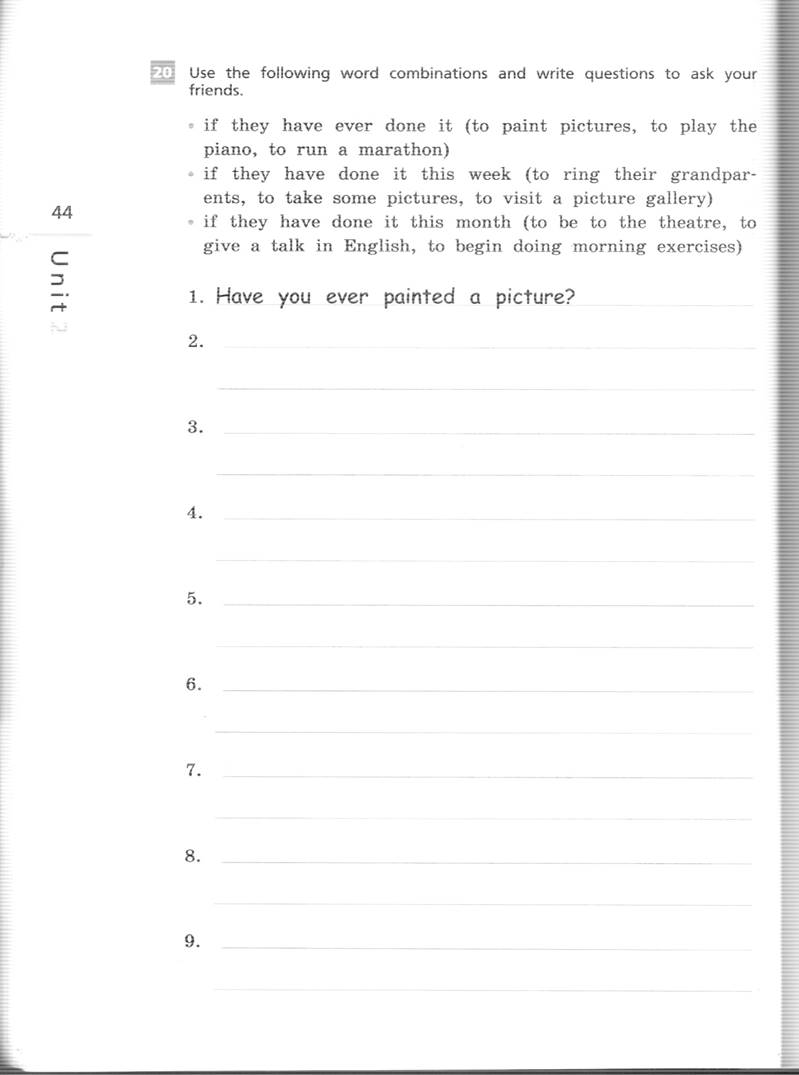
tour Write which of these Russian cities you and the members of your family have visited and what cities you haven't been to.
the ar-
to
1. Moscow 2. St Petersburg
3. Rostov 4. Vologda
5. Smolensk 6. Omsk
7. Vladivostok 8. Tver
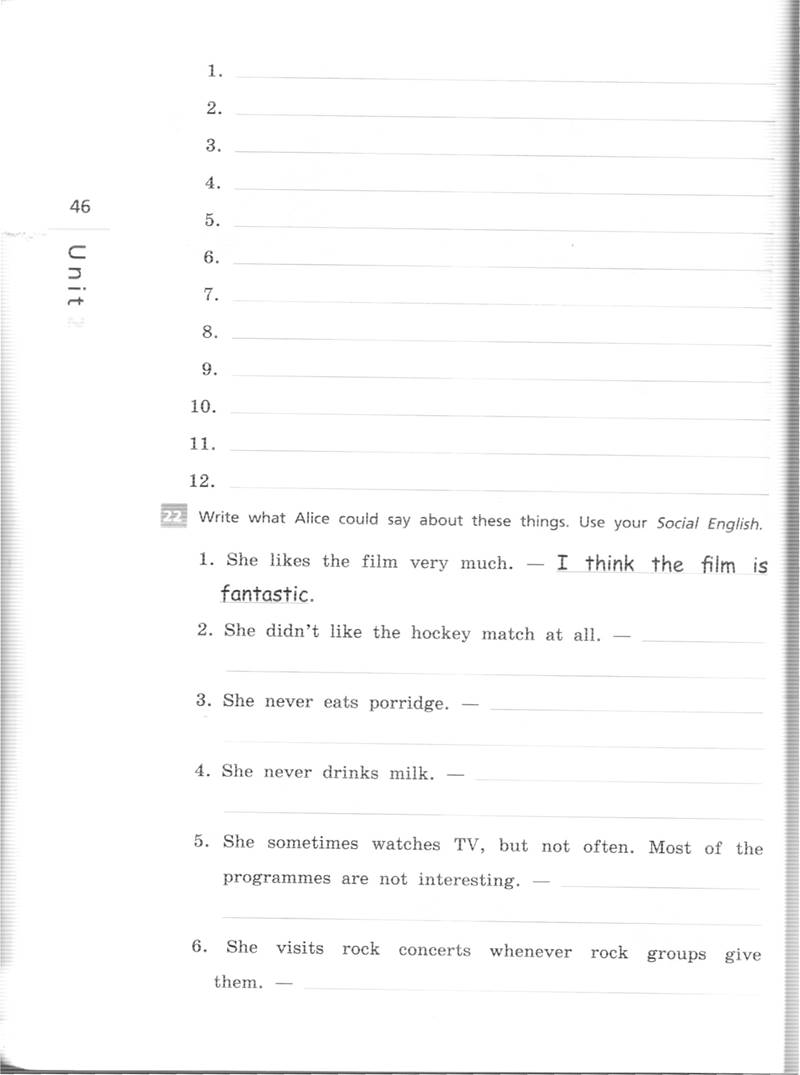
7.
She goes to the
swimming pool five days a week. ![]()
![]()
8.
She goes to any
place by car. ![]()
9.
She has five pets
at home. ![]()
10. ![]()
![]() She doesn't live in town any more.
She has moved to the country.
She doesn't live in town any more.
She has moved to the country.![]()
![]()
23 Write the three forms of these verbs.
![]()
![]()
![]() 1. aeJ1aTb do did done
1. aeJ1aTb do did done
![]()
![]() 3. 6e}KaTb
3. 6e}KaTb
![]()
![]() 4. TOBOPHTb
4. TOBOPHTb
![]() 5. ÓpaTb
5. ÓpaTb
![]()
![]() 6. CTaHOBHTbCS1
6. CTaHOBHTbCS1
![]() 7. HaqHHaTb
7. HaqHHaTb
8.
![]()
![]()
![]()
![]() llaÅaTb
llaÅaTb
9. ecrrb
10. qwrarrb
11. 3BOHHTb
![]()
![]()
![]()
![]()
![]()
![]()
![]()
![]() 12. BHAeœb
12. BHAeœb
![]() 13. 6b1Tb
13. 6b1Tb
14. AaBaTb
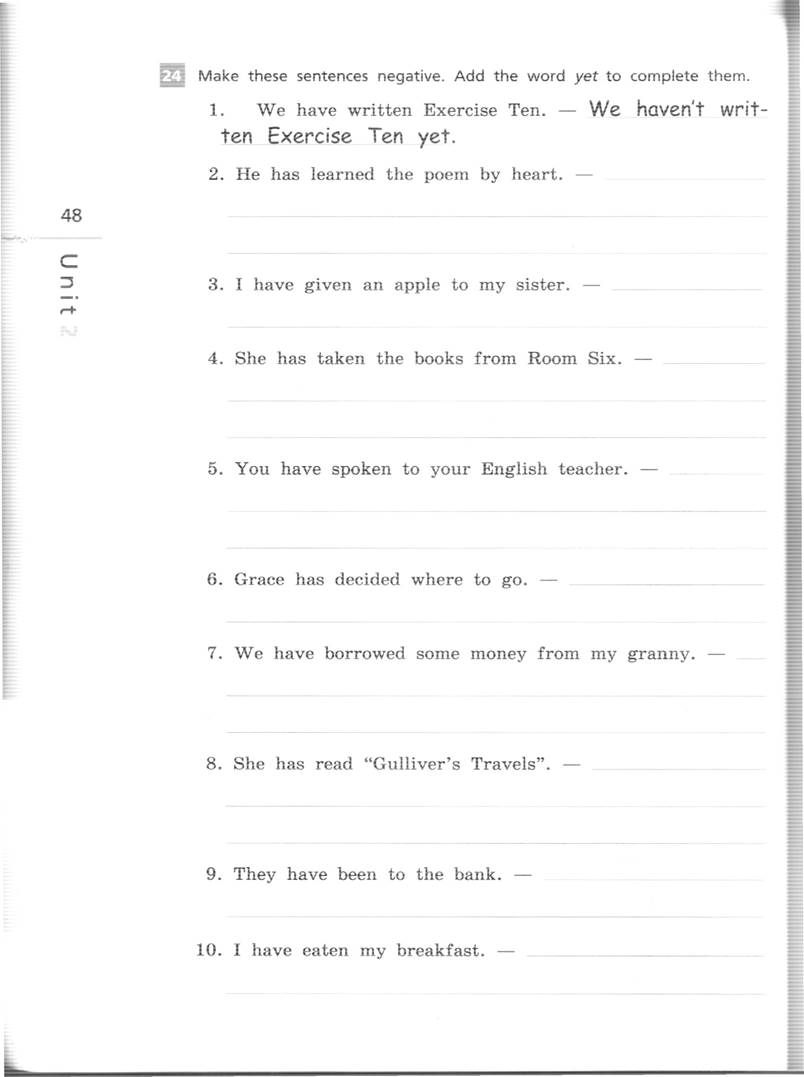
25 Look at the pictures and write
a) what countries David has visited
1. David has visited Italy.
49
b) to what countries he has not been
c) in what seas he hasn't swum
50
d) to what rivers and lakes he hasn't swum
Volga Baikal 0b
e) what dishes he hasn't eaten
borsch biyni sushki

![]()
![]()
![]()
![]() 2.
2. ![]()
c
3. ![]()
26 Write questions and ask your friend to answer them. You want to know if he/she:
1.
has spoken to
his/her maths teacher — Have you SPOken to your maths teacheû![]()
2.
has eaten his
lunch ![]()
3. has ever fallen from his/her bike —
4.
has done his/her
homework ![]()
5.
has ever swum in
the ocean ![]()
6.
has begun doing
the project ![]()
7.
has read
"War and Peace" by Leo Tolstoy ![]()
8.
has rung his/her
parents ![]()
9.
has handed out
the test papers ![]()
10. ![]() has run the 100-metres race l
has run the 100-metres race l
11. has been to the Bolshoi Theatre
52
12. has seen Red Square
c
Write questions to the underlined words.
1.
I have been to
Africa two times. HOW many times have you been to Africa?![]()
2. Helen has seen some European cities.
3. George has carried three bags downstairs.
4. Chris has done his room very well.
5. They have borrowed a lot of money.
6. The Browns have moved to a three-room flat because
their old flat is too small.
7. They have eaten the whole cake.
8. They have written a very sad letter.

1.
![]()
![]()
![]()
![]()
![]()
![]()
![]()
![]()
![]()
![]()
![]()
![]()
![]()
![]() I have used this information in my
lectures (never).
I have used this information in my
lectures (never). ![]()
I have never used this information in my ![]() lec-
lec-
tures.
53
2.
We have washed
our jeans (already). ![]()
3.
He has decided to
take chicken and rice (just). ![]() les
les
4.
He has not
planted any flowers (yet). ![]()
5.
Have they been to
the museum (already)? ![]()
6.
Have they spoken
to their parents (yet)? ![]()
7.
Has Linda seen
mountains (ever)?![]()
8.
I have eaten
Greek food (never). ![]()
9.
You have come
back (just).![]()
10.
She has cleaned
the windows (already). ![]()
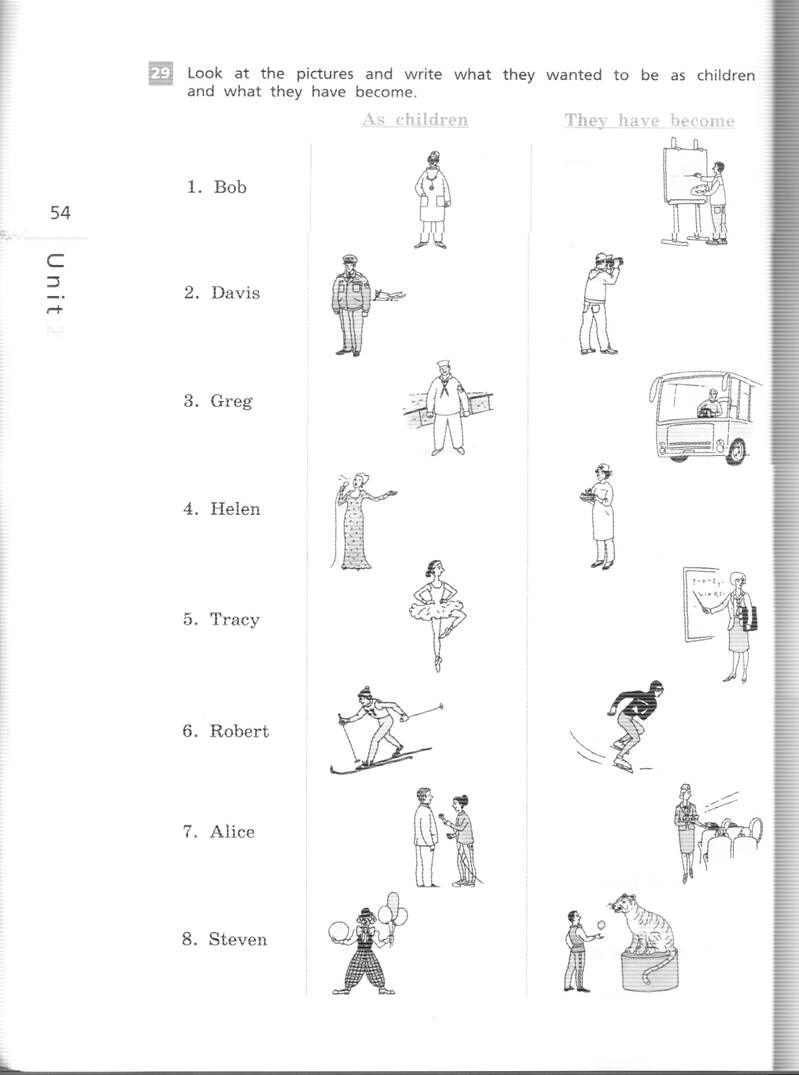
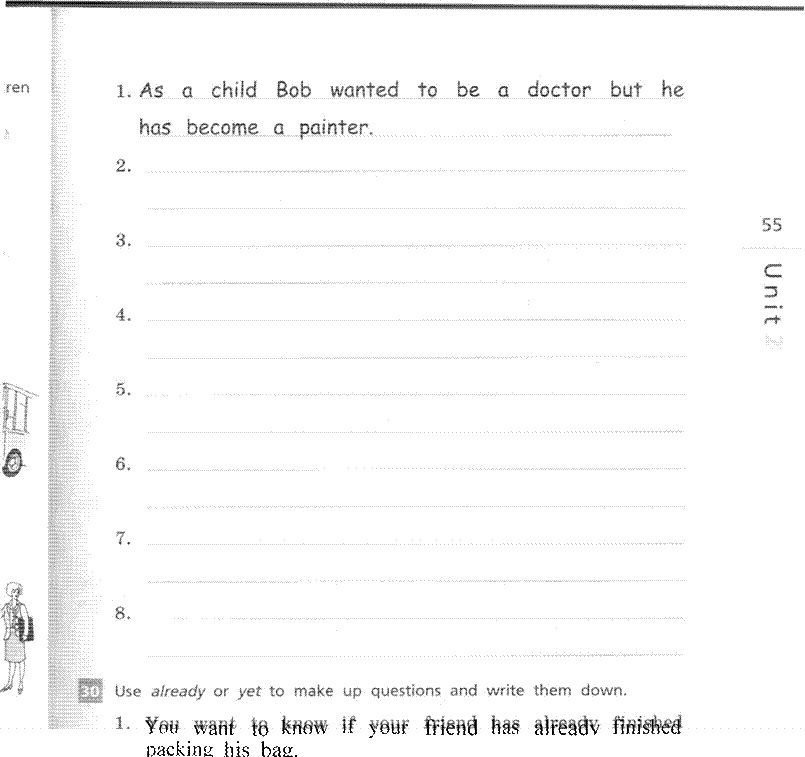
You ask: Have you finished packinB>tour bag yet?
2. ![]() You can't believe your eyes. Your
friend has already finished packing his bag.
You can't believe your eyes. Your
friend has already finished packing his bag.
You ask:![]()
3. You ask your sister to wash up after
dinner. In ten minutes you want to know if she has already done It![]()
You shout from the bedroom:
![]() 4. You ask your sister to wash up after dinner and leave.
4. You ask your sister to wash up after dinner and leave. ![]() In ten minutes you come back and see
that your sister is playing some computer game. You want to know if
In ten minutes you come back and see
that your sister is playing some computer game. You want to know if ![]() she has already washed up.
she has already washed up.
You ask:
5. Your brother is doing his homework. You know that he has a lot of exercises to write. In 20 minutes he says he is going for a walk. You want to know if he has al56 ready done everything.
![]() You ask:
You ask: ![]()
6. Your cousin is cleaning the windows in your country house. There are 5 windows in it. In half an hour she sits down in the armchair and begins watching TV. You want to know if she has cleaned all the windows.
You ask:![]()
7. Your friend is not sure what to take for dinner in the restaurant. You want to know if she/he has already decided what to take.
You ask: ![]()
8. You want to know if your friend has already seen the new film.
You
ask: ![]()
9. You are surprised that your friend has so quickly learned the poem by heart. You want to know if she/he has already done it.
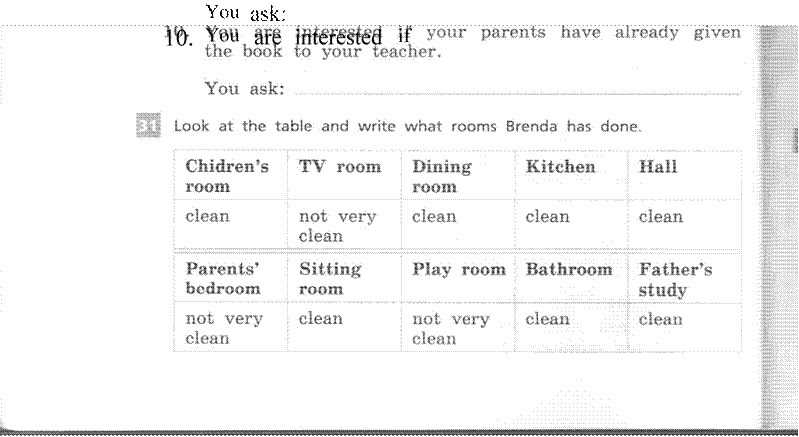
![]()
![]() try she tou
try she tou
32 Use a/an or no article to complete these sentences.
1. I have just read such an interesting book! 2. It is such
the de-clear water! 3. Penguins are such funny animals!
4. Jane has become such good actress! 5. We have thenever been to such expensive restaurant. 6. They have
never seen such tall building. 7. It was such un-
usual meeting. 8. Richard has given me such tasty
kly
(hesweets. 9. His was such endless speech! 10. It is such
![]() vast territory. 11. You can do nothing with such children. 12. It is
such big money! 13. This is such helpful information. 14. We are having such
lovely weather today! 15. It is such lovely autumn day!
vast territory. 11. You can do nothing with such children. 12. It is
such big money! 13. This is such helpful information. 14. We are having such
lovely weather today! 15. It is such lovely autumn day!
Complete the dialogues using the verbs in brackets in the appropriate
forms.
1. You ever (be) to France?
to France?
— Yes. 1
— When you (be) there? ![]()
![]() 1 (be)
1 (be) ![]()
Have you ever been
there last summer.
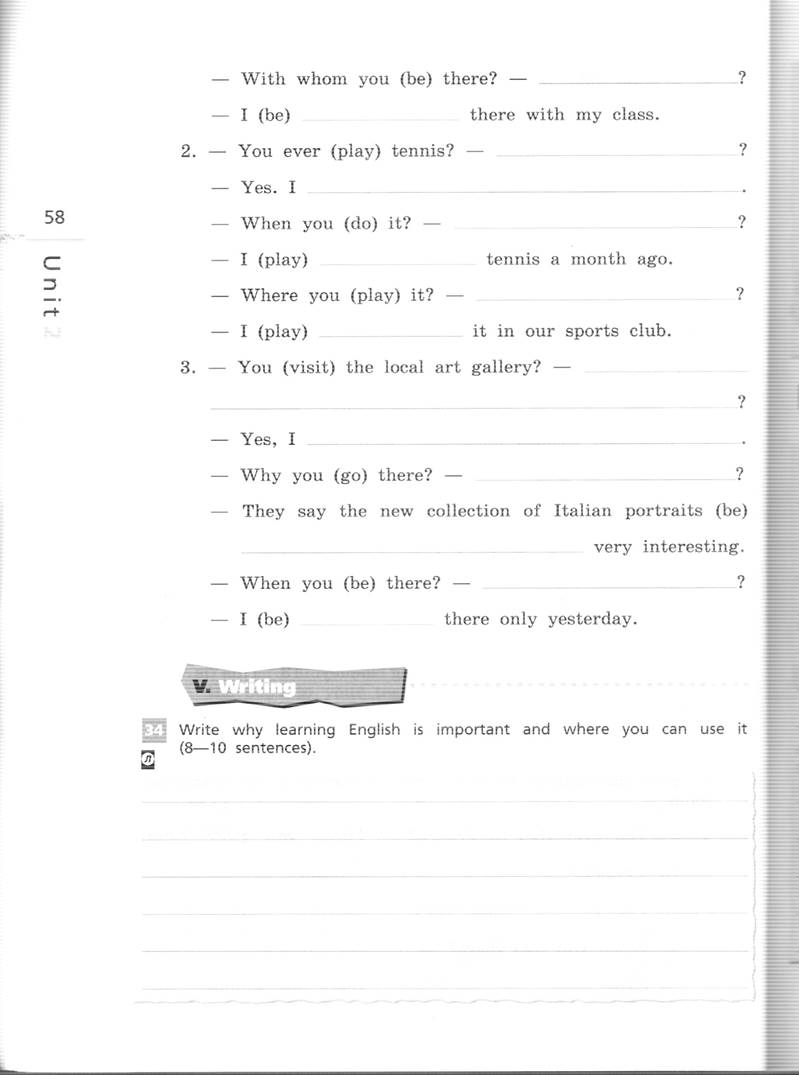
![]()
59
![]()
 c
c
|
|
35 |
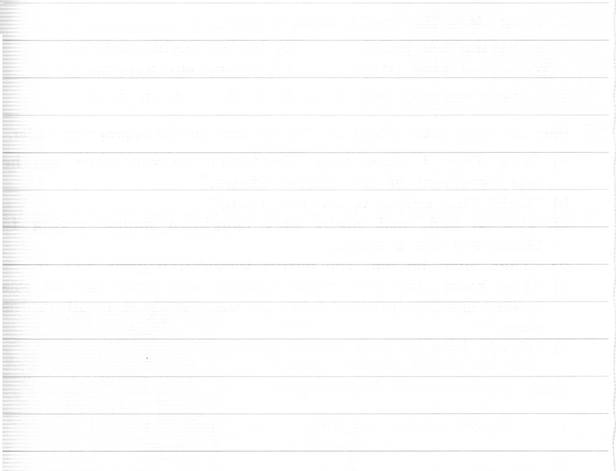
![]()
1 to master ['ma:sta] — y.nyt111.1HTb
![]()
1. What does the
a) fire
b) air
2. What does the
a) air, gas
b) fly
3. What does the
Greek prefix pyro- mean?
c) water
d) land
Greek prefix aero- mean?
c) more
d) none of the above prefix re- mean?
a)
b) to do something again d) none of the above
|
|
4. a) too small c) too bright b) too slow d) too much 5. What does the prefix octo- mean? a) having ten parts c) having eight parts b) having nine parts d) having seven parts The right answers are: 1. a, 2. a, 3. b, 4. d, 5. c. Here are three jokes mixed up. Put the lines in the appropriate order. a) "Yes, Dad, I know that. But when he was your age he was President of the United States. " b) "Ugh! This coffee tastes like soap." c) "It's so bad, last night they caught a mouse trying to phone out for a pizza. " d) "That must be tea, the coffee tastes like glue." e) "You know, my boy, when Lincoln was your age he was a very good pupil. In fact, he was the best pupil in his class. " f)
1. 1. 1. 2.
See the answers on page 60. |
|
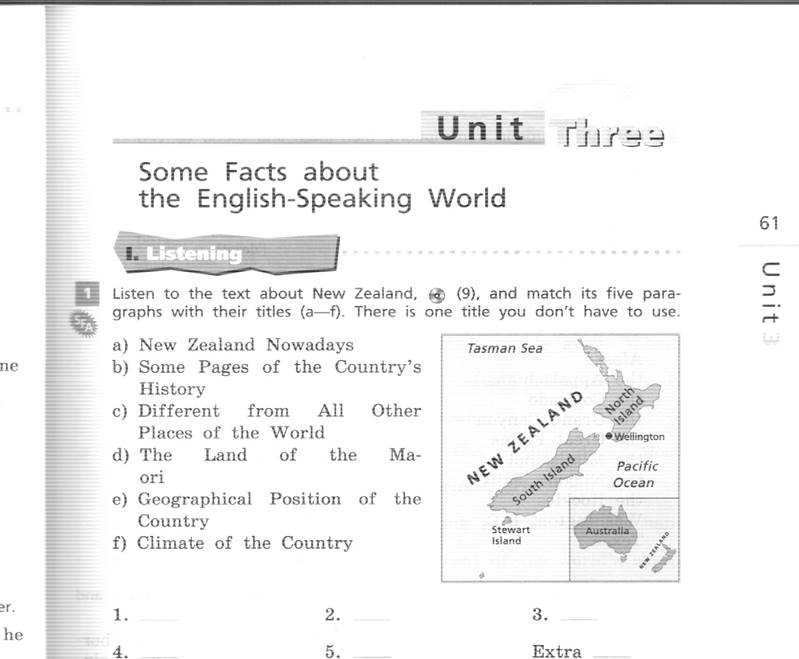
![]() Listen
to the text about Canada, (10), and decide which of the folto
Listen
to the text about Canada, (10), and decide which of the folto
lowing is not mentioned in it.
![]() 1.
The size of the country.
1.
The size of the country.
![]() vas
his2. The country's geographical position.
vas
his2. The country's geographical position.
3. Some animals living on the territory of the country.
4. A place of natural beauty in Canada.
5.
Some
old Indian traditions. ![]()
big cities.
|
|
|
|
-neadiny |
'kredabl] |
|
Read the words in transcriptions, [bra:ntS] [In [ju:kalllptas] [stretfi |
|
|
|
[la:f] |
[satpralzd] |
[dlizi:z] |
|
62 |
[plern] |
[frendll] |
[l'kldna] |
|
|
[tpxflkt] |
[cba'pæn] |
[Idezat] |
|
Alaska |
Canberra |
|
the Appalachians |
Great Australian Reef |
|
the Colorado |
Melbourne |
|
the Grand Canyon |
Perth |
|
the Great Plains |
Sydney |
|
the Mississippi the Niagara Falls the Rockies |
Uluru Rock
|
|
Washington, D.C. |
China |
|
Texas |
Japan |
![]()
![]()
![]()
![]() then
listen and check, (11).
then
listen and check, (11).
[Ivæli]
['emptil
c
Read the geographical names, then listen and check, (12).
![]() Australia
Australia
Vietnam
Read the words, word combinations and sentences, then listen and check, (13).
a) laughter, flow, womanly, Frenchman, coast, empty, border, destroy, lately, leaves, ugly, suddenly, emu, chain, duckbill, journey
b) the border between two countries, a chain of mountains, situated on the coast, to flow into the ocean, to look perfect, to stretch as far as the eye can see, a desert island, an empty territory, a journey home, to begin suddenly, to my great surprise
c) ![]() Lucy
wants to have a room of her own. Suddenly we heard a loud laughter coming from
the nearby house. Our long journey was full of surprises. They have lately been
to Japan with a friendly visit. From the top of the mountain the valley looks
incredible. He liked to look at autumn leaves when they were falling to the
ground. The children have always wanted to visit the land of koalas and
eucalyptus trees. An endless desert was stretching in front of our eyes. They
destroyed the old market and built several houses in its place. Into what sea
does this
Lucy
wants to have a room of her own. Suddenly we heard a loud laughter coming from
the nearby house. Our long journey was full of surprises. They have lately been
to Japan with a friendly visit. From the top of the mountain the valley looks
incredible. He liked to look at autumn leaves when they were falling to the
ground. The children have always wanted to visit the land of koalas and
eucalyptus trees. An endless desert was stretching in front of our eyes. They
destroyed the old market and built several houses in its place. Into what sea
does this

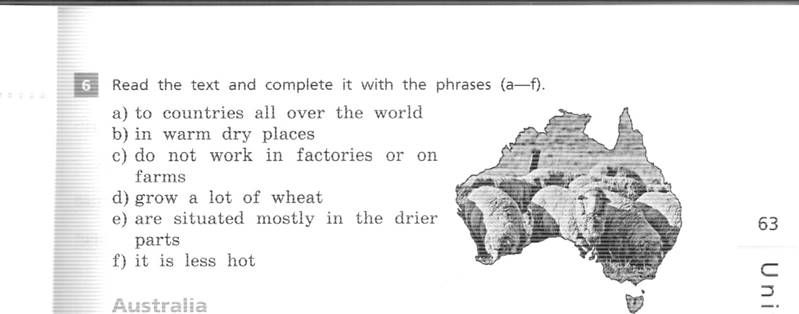
![]() Australia is a rich country and life there is good. Where
Australia is a rich country and life there is good. Where ![]() does its money come from? Sheep,
cattle l minerals, wheat,
does its money come from? Sheep,
cattle l minerals, wheat, ![]() fruit, and wine are some of the
answers.
fruit, and wine are some of the
answers.
![]() Sheep have been
important since the earliest days. Most
Sheep have been
important since the earliest days. Most
![]() Australian sheep are Spanish merinos. They appeared in
Australian sheep are Spanish merinos. They appeared in ![]() Australia in 1797. Merinos are
strong animals and live hap
Australia in 1797. Merinos are
strong animals and live hap![]() pily (1) Now twenty per cent of the world's sheep and live in Australia,
mainly in the states New South Wales
pily (1) Now twenty per cent of the world's sheep and live in Australia,
mainly in the states New South Wales
![]()
![]() and Victoria. Twenty-five per cent of
the world's wool )orfin,comes from there.
and Victoria. Twenty-five per cent of
the world's wool )orfin,comes from there.
ns,Cattle
stations (2) of the north and centre. The is- meat from Australian cattle goes
(3) ![]()
Gold made Australia rich in the 19th century. The country
![]() also has oil, silver and other minerals. They bring lots of see
also has oil, silver and other minerals. They bring lots of see ![]()
![]() money. But digging for minerals often
destroys the land.
money. But digging for minerals often
destroys the land.
![]() at The states Western Australia and
New South Wales the las They sell it to the USA, China and Japan.
at The states Western Australia and
New South Wales the las They sell it to the USA, China and Japan.
in nd Australia grows other kinds of food too. In Queensland, the lis
state in the east of the country, they grow bananas. Further south, where (5) apples appear. And in recent years Australia has been making very good wine too.
But Australia is like many other modern countries, because
64
now most of its workers (6) Two-thirds of them c work in shops, offices, banks or schools.
1. 2. 3.
4. 5. 6.
Read the paragraphs of the text (a—e) and put them in the logical order.
M. Twain
a) Mark Twain was in love with the great river. He even took his pen name from the call of the men on the boats. They cried "mark twain" when they wanted to say that the river was deep enough for their boats and safe for sailing. Now we can still see steamboats on the Mississippi River. They look very much like the steamboats in the pictures of Mark Twain's books.
b) A lot of big and important American cities are situated on the Mississippi's banks. Memphis, the third largest city in the country, is one of them, Thousands of tourists come here to visit Elvis Presley's home. Elvis Presley was one of the icons of the 20th century. He made rock 'n 'roll music very popular. The musician died in

Fur-![]() 1977, but there are people who still call him the greatest
1977, but there are people who still call him the greatest ![]() rock singer of all time.
rock singer of all time.
re- ![]() c) Hannibal is a lot smaller than Memphis. In fact, it is just a little
town on the Mississippi River, but its name 30.
c) Hannibal is a lot smaller than Memphis. In fact, it is just a little
town on the Mississippi River, but its name 30. ![]() is familiar to Americans and people
in other countries.
is familiar to Americans and people
in other countries. ![]() Young Sam Clemens (Mark Twain) lived here from 1844
Young Sam Clemens (Mark Twain) lived here from 1844
![]()
![]() •,ause1853. He copied many of his
characters from the
•,ause1853. He copied many of his
characters from the
![]()
![]() till boys and girls he knew when he
was a child. Mark 65 them
till boys and girls he knew when he
was a child. Mark 65 them
Twain's house is now a museum, and across the street is the house of his sweetheart, Laura Hawkins. She became the model for Becky Thatcher in his famous book about Tom Sawyer and his adventures.
d) After travelling all the way through the United States the great Mississippi ends in the Gulf of Mexico. This is the place where New Orleans [ i o:lienz] is situated. This city is the home of jazz music and one of the most incredible places in the US. First it was a French city. French culture is still here in the style of cooking, old buildings and some traditions. In New Orleans they still celebrate the old French festival of Mardi Gras. During this spring festival people dress in beautiful costumes, sing and dance in the streets.
e) ![]()
![]() The Mississippi River is the most
important river in the United States. Its name means "Father of the
Waters". Native Americans gave the river this name long, long ago. The
name shows their respect for the great size and the power of the river. The
Mississippi is 3,778 km long and flows from the US state of Minnesota to the
Gulf of Mexico. In the place where the river begins it is so narrow that you
can walk across it in 15 steps. But its water is very clear and cold. By and by
the river becomes wider and more powerful.
The Mississippi River is the most
important river in the United States. Its name means "Father of the
Waters". Native Americans gave the river this name long, long ago. The
name shows their respect for the great size and the power of the river. The
Mississippi is 3,778 km long and flows from the US state of Minnesota to the
Gulf of Mexico. In the place where the river begins it is so narrow that you
can walk across it in 15 steps. But its water is very clear and cold. By and by
the river becomes wider and more powerful.
2. ![]() 3.
3. ![]()
5. 6.
![]()
Read the text and mark the sentences after it as true (T), false (F) or
Jackson Hole is a beautiful valley situated in the state of Wyoming, USA.
The place got its name from David Jackson, a traveller and a hunter, who once
lived there. His friends called it Jackson Hole because it really looked like a
hole in the middle of the mountains. ![]()
|
66 c |
Jackson Hole still keeps its Old West traditions. There are shops with cowboy hats and boots and cafés which look like saloons of the American West. Holidaymakers can ride horses or go to a rodeo [rou t der] to see traditional competitions. The rodeo usually begins with a parade of cowboys and horses. Then comes the competition. Riders try to stay on a wild animal for eight seconds. They also ride wild horses and large bulls [bulz]. The animals try to throw the cowboys to the ground. The riders try not to fall off. Another thing that cowboys do is throwing a rope around a young cow's legs. The cowboy who does this in the shortest time wins. People come to Jackson Hole from all over the world to enjoy the best of cowboy and mountain culture. 1. It was David Jackson who gave the valley its name. 2. There are a lot of things people can enjoy doing in Jackson Hole. 3. The Snake River is the longest in Wyoming. 4. It is easy to sail along the Snake River. 5. Horses help people to win in a rodeo. 6. Visitors from abroad come to Jackson Hole for holidays. Speak about the USA. Mention: the country's geographical position; • the country's relief (mountains, plains, lakes and rivers); • the climate; •
some places of
interest; |
some cities (including New York and Washington, D.C.); c people and their traditions.
10 Speak about Australia. Mention:
![]() the
country's geographical position; the climate and nature in different parts of
the country;
the
country's geographical position; the climate and nature in different parts of
the country;
• some places of interest in Australia; the Australian Aborigines; some cities (including Canberra); some of Australian curious birds and animals.
Work in pairs. Make up a dialogue and act it out.
You and your good friend have won at the city contest of photographs. Your prize is a trip to the USA or Australia. You have to decide which of the two countries to choose. Both of you are interested in taking pictures of natural objects and want to travel together. Talk about where to go. Give different arguments. Try to come to some decision.
Complete the dialogue and act it out.
A: My greatest wish is to see the world. I'd like to go travelling.
Really? (1)
A: To some English-speaking country. I've already heard a lot about them, so I'd like to see them with my own eyes.
B: It's a very good idea. (2)
I think I'll go to Australia first.
(3)
A: Because it is such an unusual country.
Say as much as you can about the places of interest in English-speaking countries.
Comment on the following proverbs.
A thing of beauty is a joy for ever.
• So many countries, so many customs.
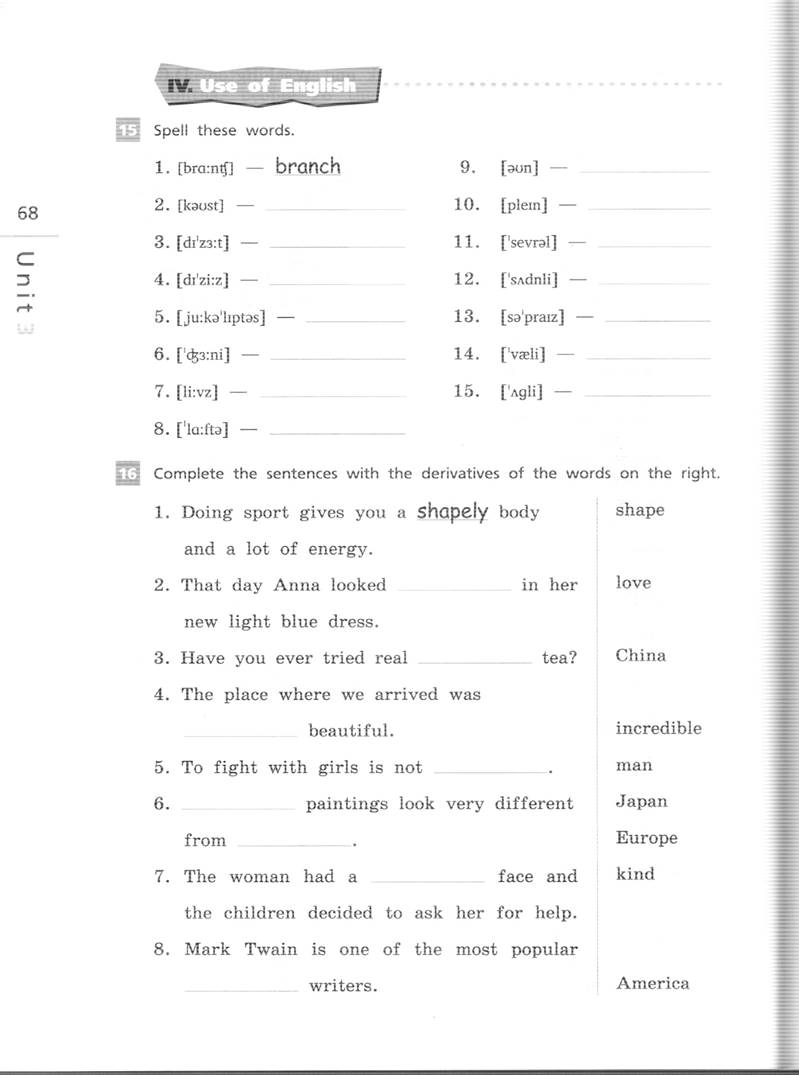
|
9. This mighty river flows
|
slow |
|
|
10. The Arctic Ocean. |
Norway |
69 |
|
line they called the "Frontier", the land was |
|
|
full
of (2) |
know |
|
It was the land of (3) tive Americans. The pioneers moved farther and farther west until they reached the Pacific Ocean and the frontier was there no longer. But the idea of the land of |
India |
|
|
man |
|
(5) |
hunt |
|
(6) still believe that if you are strong and |
America |
|
(7) |
skill |
|
(8)
|
end, rock |
|
mountains
and find your (10) |
happy |
![]() Complete
the text with the derivatives of the words on the right. The early (1)
Europeans in America lived Europe
Complete
the text with the derivatives of the words on the right. The early (1)
Europeans in America lived Europe
there.
![]() 18
These sentences have factual mistakes. Rewrite the sentences to make them
correct.
18
These sentences have factual mistakes. Rewrite the sentences to make them
correct.
1. Washington, D.C. is a city of skyscrapers. New
![]()
![]() 70
70
c
Complete the sentences with the appropriate function words.
1. Yesterday our teacher gave out some pictures and asked us to describe them in English. 2. the southeast Rus-
sia borders China. 3. We all laughed the funny
71 cartoon. 4. Young children must travel only the back
c
of the car. 5. I know how difficult it is to do sport but, please, don't give Sport is good your health.
6. When I asked my question, he looked me surprise. 7. The secret room was situated the back of the house. 8. I took out the key but my surprise the door was open. 9. The Mississippi River flows the Gulf of Mexico. 10. I always give books to the library
time.
Choose the correct words to complete the sentences.
1. Many rivers (fly/ flow) flow into the Pacific Ocean.
2. The volcano lava (flew/ flowed) down
the hill. 3. The beautiful birds (were flying/ were flowing)
over the water. 4. They (flew/ flowed) to Sydney early in the morning. 5. (May-
be/ May be) we can listen to this song
again, it's lovely. 6. They (maybe/may be) the most friendly people I've ever met. 7. Jane says she (maybe/may be) a little late for the beginning of the show. 8. (Maybe/ May be) the
story will surprise you but everything I'm going to say is true.
Match the words in the two columns and use the word combinations to complete the sentences.
72
|
|
1. |
incredible |
a) road |
incredible journey |
|
c |
2. |
great |
b) coast |
|
|
|
3. |
laughed |
c) surprised d) journey |
|
|
|
5. |
pleasantly |
e) loudly |
|
|
|
6, |
southeast |
f) leaves |
|
|
|
7. |
lonely |
g) surprise |
|
|
|
8. |
autumn |
h) times |
|
1. We went to East Africa and, believe me, it was an incredible journey. 2. They lived on the
of Florida enjoying the sunshine and the ocean.
3. They brought some colourful from the park to decorate the living room. 4. When 1
showed Colin my pictures, he but said nothing. 5. To my they gave
us everything we asked for. 6. Everyone feels uncomfort-
able on a at night. 7. I've seen
this film it's one of my favourite. 8. They were to find that
the hotel was so comfortable.

|
3. |
Melbourne |
11. |
|
Uluru Rock |
73 |
|
4. |
Grand Canyon |
12. |
|
USA |
|
5.
![]() Hawaii 13.
Hawaii 13.
![]() Australia
Australia
6.
Sahara Desert 14.
![]() Death Valley
Death Valley
|
7. Rockies |
15. |
|
Atlantic Ocean |
8. Colorado River
![]() Complete
the text with the articles a or the where necessary.
Complete
the text with the articles a or the where necessary.
(1) The
Dead Sea is really not (2) ![]() sea at all,
sea at all,
![]()
![]() salty lake. It's nine times saltier
than the ocean. (4)
salty lake. It's nine times saltier
than the ocean. (4) ![]() Dead Sea is three million years old. There is no life in (5)
Dead Sea is three million years old. There is no life in (5) ![]() Dead Sea: its water is too salty for
(6)
Dead Sea: its water is too salty for
(6) ![]() fish or (7) plants to live. (8)
fish or (7) plants to live. (8) ![]() Dead Sea is (9) lowest
Dead Sea is (9) lowest
place on
earth. It's very deep. Its depth is 378 metres. Salt crystals are everywhere on
(10) ![]() shore, they look like (11)
shore, they look like (11) ![]() ice. Water flows into (12)
ice. Water flows into (12)![]()
![]()
Dead Sea from several rivers,
but does not flow out.
(13) ![]() climate of this territory is sunny and dry. It has 330 full days of (14)
climate of this territory is sunny and dry. It has 330 full days of (14)
![]() sunshine
sunshine
(15) ![]() year.
year.
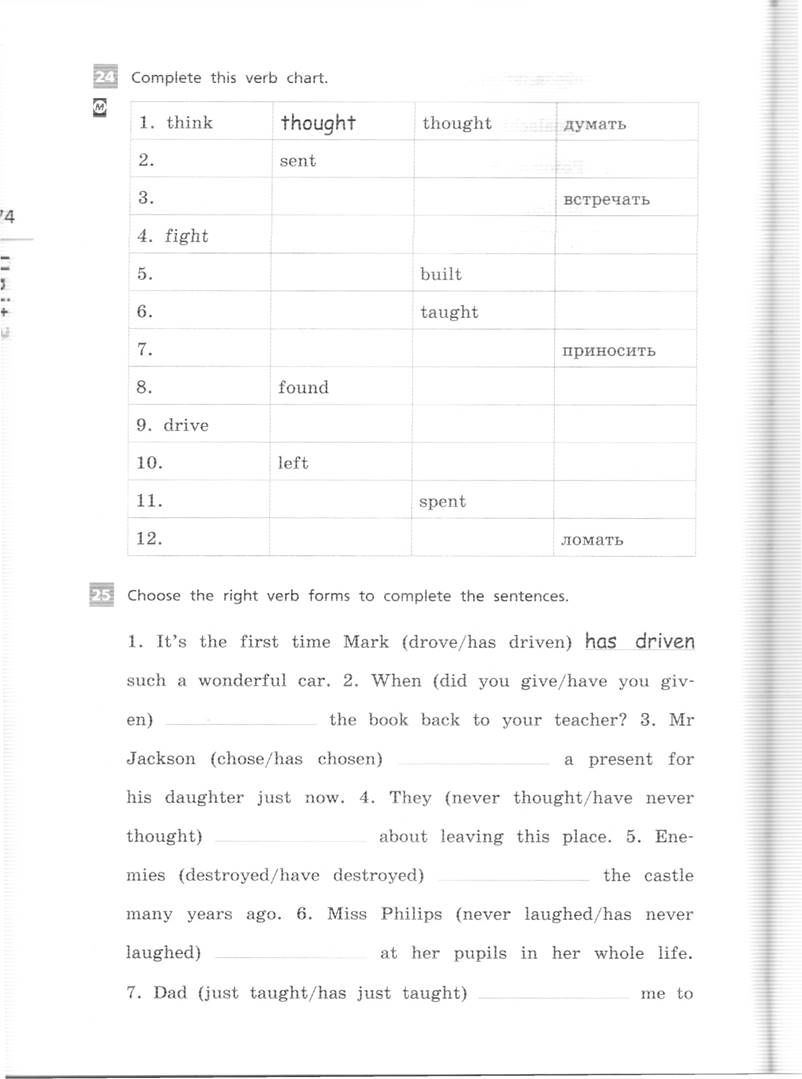
fish. 8. It (got/ has got) dark about an
hour ago. It's time to go home. 9. The other day we sud-
denly (found/have found) the museum we
wanted to visit. 10. Mary (just had/ has just had)
75 her lunch, she isn't hungry any more.
c
Use the verbs in brackets in the right tenses — past simple or present perfect.
1. I (meet) met Linda just now. She was talking to our teacher. 2. It's the second time Sally (read)
this story. She likes it a lot. 3. Jason
(buy) a new dictionary the other day. He
is already using it. 4. Colin (just break) his bike. That's why he looks so sad. 5. My sister (eat)
Chinese food several times, but I (never
do) it. 6. It's the first time he (spend)
a month at the sea. He loved it. 7. The
other day we (find) a lovely café and (have) tea there. 8. Some years ago the family (have) a small cottage at the seaside. 9. The children (already leave) home, they are on their way to school. 10. My friend (send)
me several e-mails today. 11. That day
they (hear) the good news and (go)
home at once. 12. Sam (not tell) us about his plans yet. I think he'll do it later.
Complete the sentences with gone or been.
1. Where is your grandad? He has just gone to visit his friend.
2. They haven't to 76
Australia yet, they are planning to
c
go there in the spring. 3. Where has Anna
I don't know. She may be in the market. 4. They've just to Hawaii. Ask them about the place.
5. Has she ever to an English-speaking country? 6. My brother isn't at home. He's to the swimming pool. 7. All my classmates have to the Pushkin Museum, but I haven't. 8. Luke has just
out. Please call him back later. 9. The family
has abroad on holiday. They'll be back home in September. 10. Have you ever to Lake Bai-
kal? You should go there one day.
28 Use the articles a/an or the to complete the sentences.
1. Among the tourists there was a Canadian and two Americans. The Canadian spoke English and French.
|
1. Most of the Americans live in |
America and speak Eng- |
77 c |
|
lish. 2. Most of |
live in Germany and |
|
|
speak
|
|
|
|
England and speak |
4. Most of |
|
|
live in |
and speak Norwegian. |
|
|
5. Most of |
in
|
|
|
speak Japanese. 6. Most of the |
British people live in |
|
|
|
|
|
|
the Italians live in
sia and speak |
||
|
2. |
Autumn has come. The beginning to fall off the trees. |
|
are |
leaf |
|
3. |
It is the |
I've |
|
incredible |
2.
![]()
![]()
![]()
![]() Japanese
are a very hard-working nation. 3. He was Englishman but lived in Spain most of
his life. old culture. 7. Mike was Australian but everybody thought that he was
American. 8. He said he was
Japanese
are a very hard-working nation. 3. He was Englishman but lived in Spain most of
his life. old culture. 7. Mike was Australian but everybody thought that he was
American. 8. He said he was
![]() German,
not Austrian.
German,
not Austrian.
30 Complete the sentences with the appropriate forms of the words on the right.
1. It is the first time James has beenone, be abroad. Let's ask him what he feels.
seen.
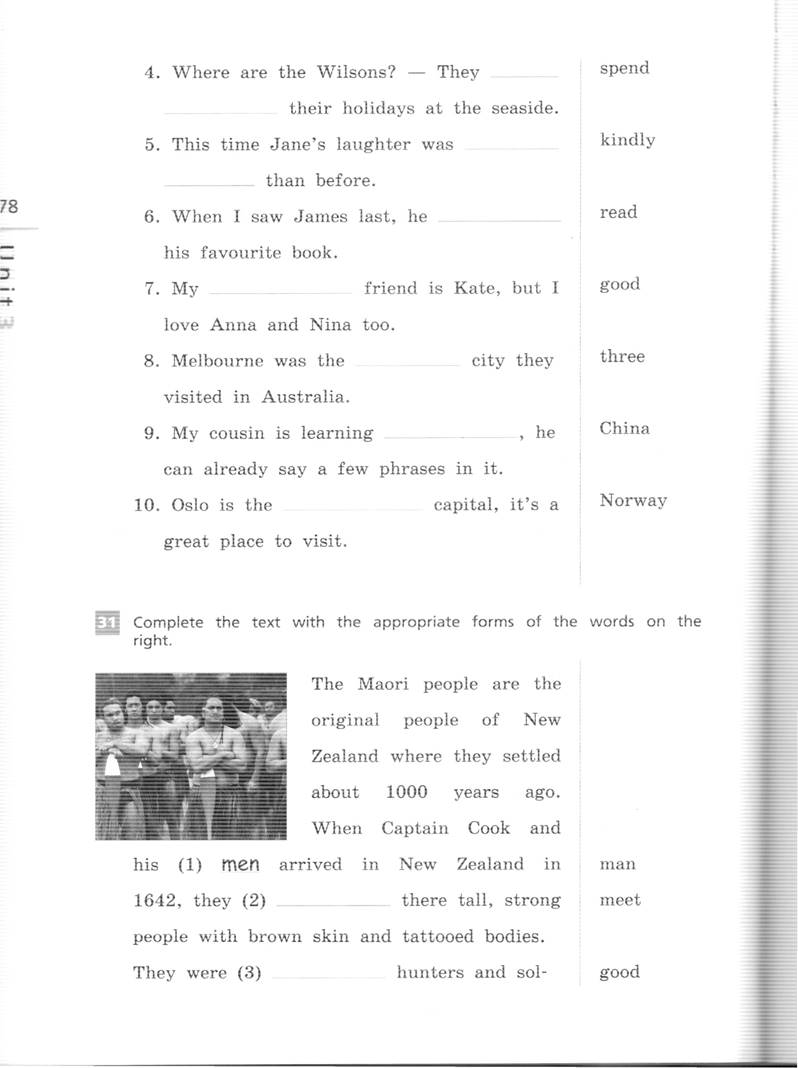
diers than the Europeans but they were also warm and friendly people. They lived in wooden houses and had wooden boats. They
|
birds and (5) |
catch, fish |
|
and (6) sweet potatoes for food. |
79 grow |
|
The Europeans (7) guns, ciga- rettes and diseases that were new to the |
bring |
|
Maori, and many of (8) died. |
they |
|
Today, most Maori (9) their lifestyle but Maori culture is still very strong. Many schools teach Maori language and train the children in the ways of (10) |
change |
|
grandfathers. |
they |
$êéWriting
Read the text "The Lion Country" and write 10 questions you would like to ask to know more about the country.
The Republic of Singapore [tsllja l po.•] is a small island nation in Southeast Asia. Singapore is also the name of the country's biggest island and its capital city. A legend says that a prince named the island Singapura, meaning "lion city", because he thought he saw a lion there.
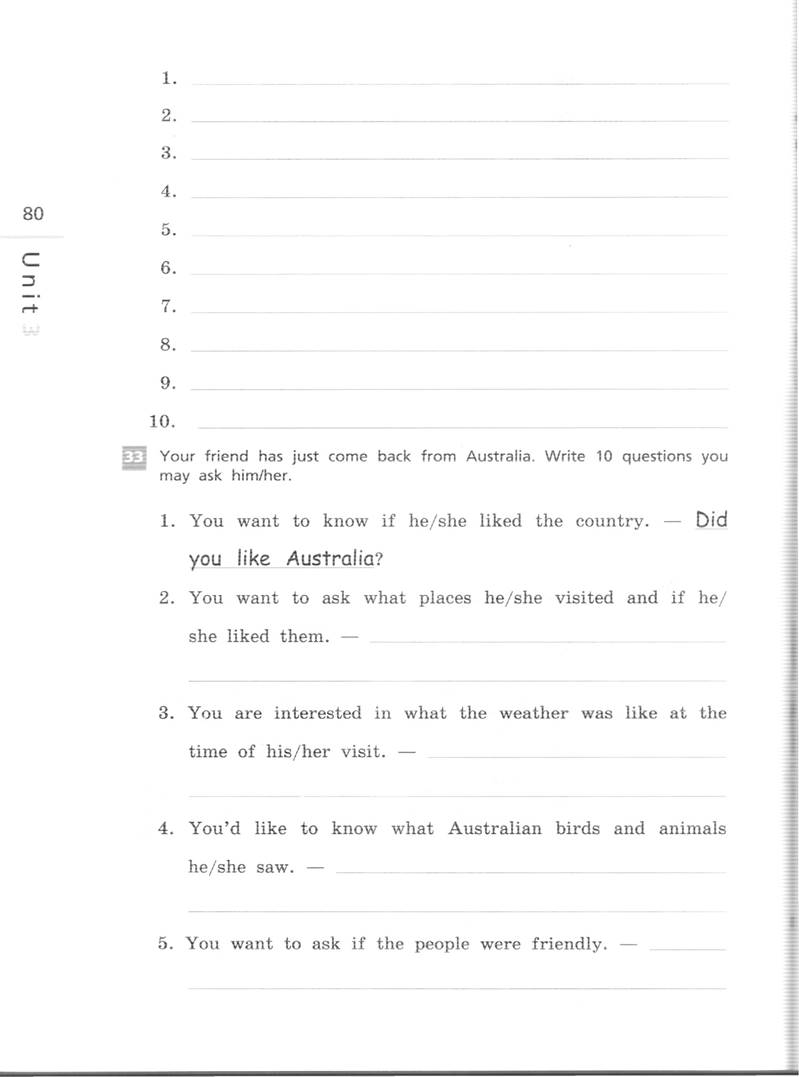
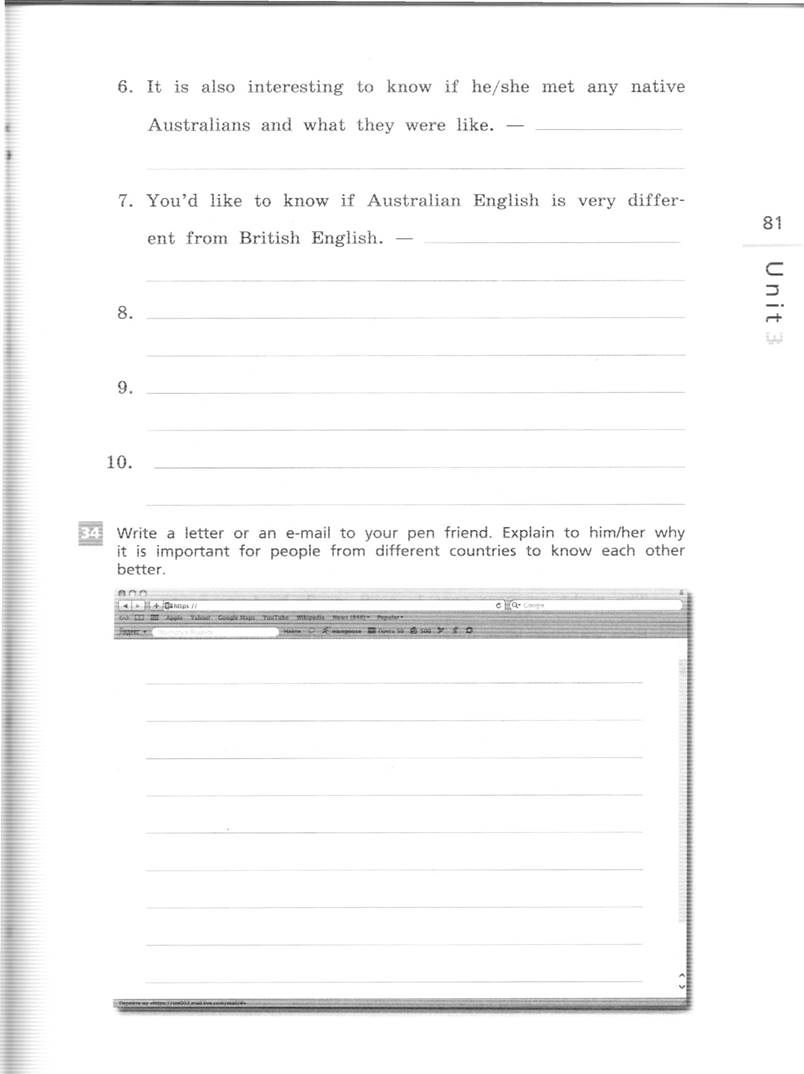
See if you know the right answer l
1. What causes a volcano to erupt?
a) magma b) water
c) dust d) none of the above
2. Which holiday in the US do they celebrate on the fourth c
Thursday of November?
a) Thanksgiving Day b) New Year's Day
c) Christmas Day d) Flag Day
3. Which is the second largest ocean in the world?
a) Pacific b) Atlantic
c) Indian d) Arctic
4. Who explored the South Pacific in the 1700s?
a) Magellan b) Christopher Columbus
c) James Cook d) Roald Amundsen
5. Where is Grand Canyon National Park?
a) Texas b) California
c) Arizona d) Florida
The right answers are: 1. a, 2. a, 3. b, 4. c, 5. c.
36 Here are three jokes mixed up. Put the lines in the appropriate order.
"Yes, sir, they're not very good swimmers."
b) "Well just eat the cheese and leave the holes on the side of your plate."
c) "Sit down, sir we serve anyone."
d) "Waiter, there's a dead beetle in my soup."
e) "Waiter, do you serve crabs?"
f) "I don't like cheese with holes."
Joke 3
1. 1. 1.
2. 2. 2.
1 See the answers on page 82.
![]()
Living Things Around Us
83
|
üListenin |
c
![]() Listen
to the text about New Zealand, (14), and decide which of the facts (1—6) are
true (T), false (F) or not stated (NS).
Listen
to the text about New Zealand, (14), and decide which of the facts (1—6) are
true (T), false (F) or not stated (NS).
1. ![]()
![]() The kauri l is the main
material to build houses in New Zealand.
The kauri l is the main
material to build houses in New Zealand.
2. Kauri trees grow in North Island.
3. There are a lot of wooden houses in Wellington.
4. All kauri trees have names.
5. ![]()
6. The kakapo parrot weighs more than
any other bird ![]() in New Zealand.
in New Zealand.
![]() Listen,
(15), and decide which of the facts is not stated in the text.
Listen,
(15), and decide which of the facts is not stated in the text.
1. ![]() Kiwi birds are not very big birds.
Kiwi birds are not very big birds.
2. For a long time kiwi birds did not have any enemies on the land where they lived.
3. Kiwi birds are disappearing.
4. The kiwi is the bird that is the symbol of New Zealand.
![]()
1 the kauri [ ikauari] — Ha3BaHV-re H3BeCTHoro HOB03eJ1aHACK01'O BHAa AepeBbeB
5. It is not easy to see kiwi birds because of their colour.
6. It is possible to say that kiwi birds are night birds.
|
Read the words in transcriptions, then listen and check, c [bri:ö] [twžn] ['similê] [Ibrelkobl] fin 'klu:drn] [saipo:t] [ikjuarias] [dSmest1k] ['relativ] [I lspeSali] ['mu:vabl] ['spelJas] ['rern,forlst] [tsalonltlflk] [hard] |
(16). |
Read the names of animals and plants and the word combinations with them, then listen and check, (17).
a) an ape, a beetle, a blackbird, a butterfly, a monkey, a caterpillar, a dragonfly, an insect, a ladybird, a lizard, a magpie, a nightingale
b) a strong ostrich, a wise owl, a funny penguin, a whiteand-brown pigeon, a tiny robin, a noisy seagull, a long snake, a grey starling, a fast swallow, a hard-working woodpecker, a white moth
c) a beech, a bluebell, a daffodil, an elm, a lily, a water lily, an oak, a pine, a shamrock, a sunflower, a thistle
d) a tall beech, an old pine, a fantastic lily, a wonderful bluebell, a strong oak, a water lily in the pond, spring yellow daffodils, tall elms in the forest, under the pine, sunflowers in the field
Read the words, word combinations and sentences, then listen and check, (18).
a) another, human, close, enjoyable, everyone, fur, hide, including, similar, someone, soil, species
b) a twin brother, to be close to the relatives, to be curious about plants growing in rainforests, including insects, especially domestic animals, common birds, similar problems, a spacious office, to breathe in deeply, an unusual species
c) He has paid for all of us. We have never had anything in common. Pirate Jack has hidden the money, no one will be able to find it. Different species of animals live in rainforests. Her parents supported her till she was
twenty-one. A narrow river flows down this beautiful valley. We have been to Canada but never to any other English-speaking countries.
Read the text and mark the sentences after it as true (T), false (F) or not stated (NS).
Chaftes Darwin: How it
85 At the age of 19, Charles Darwin went to Cambridge University to study religion, but he didn't like it. He didn't spend much time on books, what he loved to do was collecting beetles.
Finally, something happened to Charles that changed his life. A friend invited him on an expedition on his ship the Beagle. Without any clear idea about what he wanted to do with his life, Charles joined the expedition.
The voyage began on the 27th of December, 1831. It was a five-year expedition to incredible faraway places. Charles was not really a scientist and he felt terribly seasick but he still had a wonderful time on his voyage. He had a great chance to study lots of plants and animals.
When the Beagle arrived at the Cape Verde [V3:d] Islands in the Atlantic Ocean, Charles saw a tropical forest for the first time in his life. And he was surprised by the great number and variety of animal species. He started to collect butterflies, spiders, beetles, shells he loved everything. Charles decided to become a scientist.
Three years later, in 1935, the Beagle landed at the Galapagos [go t læpagas] Islands where Charles saw giant tortoises and other interesting animals. Charles found that each of the islands had its own kind of tortoise. The animals on different islands were a little different. Charles thought that it was strange. At that time people believed that every animal species looked the way God made it.
Darwin came home from his five-year adventure and began working hard. So much to do, so many questions to answer. He later said that the two years after his voyage were the busiest in his life. Charles started writing a book. He also started to think about the Galapagos animals and what he called the "transmutation of species", the slow changing of one species into another. Now we call it "evolution".
1. Darwin was not a good university student.
2. Darwin knew why he wanted to go on the expedition.
3. Darwin enjoyed the expedition.
4. When Darwin arrived at the Galapagos Islands, he already knew what he wanted to do professionally.
5. In London Darwin began to collect material for his book.
6. Darwin never used the word "evolution".
Read the texts (1—6) and match them with the titles (a— f) . There is c one title you don't have to use.
a) People's Relatives
b) They Are Fairly Different
c) Important Part of the Body
d) Origin of the Name
e) The Best-known Species
f) Their Habits
1. The word lemur [ I li:mê] comes from the Latin word meaning "a ghost". Perhaps this is because they move about silently at night and have large mysterious eyes.
2. Lemurs have lived on the planet Earth for a very long time, but you can find them only in two places on the island Madagascar (millions of years ago, the island of Madagascar broke away from the continent of Africa) and the nearby Comori Islands.
3. Some people think that lemurs belong to the family of squirrels or cats. But the truth is, they are more close to us, humans. They are primates.
4. Lemurs have big, bushy tails that wave in the air as a form of communication. These big tails also help them balance when they jump from tree to tree. But lemurs don't hang from trees by their tails, as some monkeys do. Some species of the lemur have longer tails than their bodies.
5. There are many kinds of lemurs. They come in different colours and sizes. The smallest species weighs only 30 grams. The largest species weighs 10 kilograms. In the past there were also very large lemurs which weighed 240 kilograms, but they have all died out.
6. Lemurs live and move about in groups. They like to sleep during the day and are active during the night. They eat nuts, fruits and berries. Sometimes they also eat insects.
1. 2. 3.
4. 5. Extra
Read the text and answer the questions after it.
Gerald Durrel, a popular British writer and the author of brilliant books about animals, was born in India in 1925. His mother often joked that his first word was "zoo".
When he was three years old, his family moved to Eng-
|
land, then to the Greek island of Corfu to get away from the terrible English weather. With his mother, his |
87 |
|
sister Margo, and his brothers, Leslie and Larry, Gerald spent five years on the island. That was the start of his long career as an animal expert. |
c |
They lived in an old villa. One day Gerald found a big scorpion in the garden wall. The scorpion had lots of light brown babies on her back. He put them into a matchbox and hurried home. It was time for lunch, so Gerald put the matchbox on the shelf... He began his meal, and forgot about his new pets. He suddenly remembered about them when he heard a noise from the sitting room. He ran there and saw his brother Larry with an open matchbox in his hand. And the scorpions were free!
Larry shouted "Help!" , the Durrels' dog went wild and the servant dropped a plate. The scorpion and her babies ran all over the room. Gerald had to catch them with a teaspoon, and put them back in the garden wall.
In 1939, the Durrels moved back to London because of the war. At the end of the war Gerald got a job in Whipsnade Zoo where he started looking after the lions and other animals.
On his 21st birthday Gerald decided to go on expeditions to collect wild animals for British zoos.
Back home in England he kept a lot of animals monkeys, squirrels, frogs and others in his sister's garden.
Gerald's brother Larry asked him to write about his journeys and voyages to different places. This is how Gerald Durrel became a famous writer. The title of one of his most famous books is "My Family and Other Animals".
1. When and where was Gerald Durrel born?
2. How many brothers and sisters did he have?
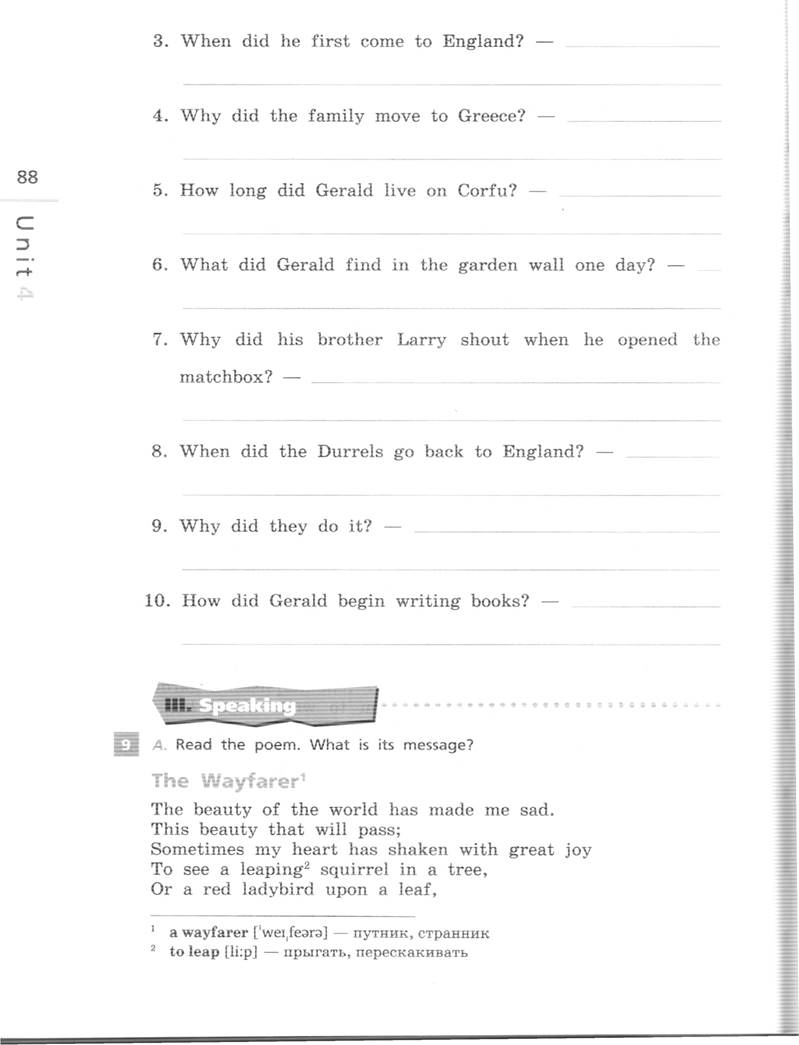
Or little rabbits in a field at eve — ning,
Lit by a slanting l sun.
And then my heart has told me:
|
These will pass, Will pass and change, will die and |
|
|
be no more, Things bright and green, things young and happy; |
89 |
|
And I have gone upon my way |
c |
Sorrowfu12
Work in pairs. Discuss the poem. Consider the following:
feelings the poet has and why he has them;
the three types of wild animals which have given him joy; the things the poet's heart has told him;
• if the lines in the poem rhyme4 , if it is always important; if you sometimes feel the same.
Speak about flora and fauna of the place where you live. Say:
Work in pairs. Complete the dialogue and act it out.
Have you got a pet, Phil?
(1) Yes I have. It's a dog.
Ùonažd: What is its name? How old is it?
1 slanting ['sla:ntll)] — K aaKarry
2 sorrowful ['soraufl] — negaJ1bHb1ìi, ropeCTHb1ñ
3 Pádraic Pearse (1879—1916) was an Irish teacher, barrister, poet, writer, and political activist who was one of the leaders of the Easter Rising in 1916. Following his execution along with fifteen other leaders, Pearse came to be seen by many as the embodiment of the rebellion.
't to rhyme [rarm] —
5 to protect [pra'tekt] — aa114H1uaTb
(2)
Ž)tmažd: So, it's a grown-up dog, not a puppy. (3)
I've had Pirate since he was born, for five years already. It's a pleasure to have a dog and a great responsi-
90 bilityl too.
c
(4)
I mean that you must look after your pet, feed him regularly, take the dog out, play with him and train him.
(5)
I do. I regularly take Pirate to the vet, usually twice a year. Dogs may have health problems and it's important to keep them fit.
Comment on these proverbs. Can you find their Russian equivalents? Birds of a feather flock together.
|
A bird in the hand is worth two An early bird catches the worm. |
in the bush. |
|
Spell the words. |
|
|
1 . [bri:ö] breathe |
9. [tostrltfi |
|
2. ['kjuarias] |
10. [trelatlv] |
|
3. [lispeJli] |
11. ['rnsekt] |
|
4. [tsalonltlflk] |
12. ['komon] |
|
5. ['srmlla] |
13. [satpo:t] |
|
6. |
14. ['prcban] |
|
7. [Intklu:dll)] |
15. [inaltll)gežl] |
|
8. ['hju:man] |
16. |
responsibility [rltsponsê lbllêti] — OTBeTCTBeHHOCTb
Correct the names under the pictures where necessary.
91
1. poppy 2. tulip 3. elm daffodil
4. oak 5. bluebell 6. shamrock
7. lily 8. water lily 9. pine
10. fir 1 1 . beech 1 2. lily of the valley
Complete the sentences with the new words from the box.
|
especially, similar, shamrock, scientific, hidden, curious, species, relative, bluebell |
breathe(2), close, included, humans,
1. A clover leaf with three parts is a shamrock. It is an
92 emblem of Ireland. 2. A is not a bell of
blue colour, it is a flower. 3. I came to my doctor. He
asked me to in and then to
out through the nose. He wanted to listen to my heart and
lungs. 4. Where have you my keys? Why have you done it? 5. Be careful when you
cross the street here. It's a dangerous place. 6. Rodger, is Uncle Harry your 7. Although the girls were not twins, their shoes and dresses looked
8. Everyone was about
the new student. 9. Men, women and children are
10. Do wolves and dogs belong to the
same of animals? 11. We
not only our relatives but some of our friends on the list of guests. 12. All of the pupils have to
do experiments in Chemistry classes.
16 Write the names of
1. five (or more) animals of white colour
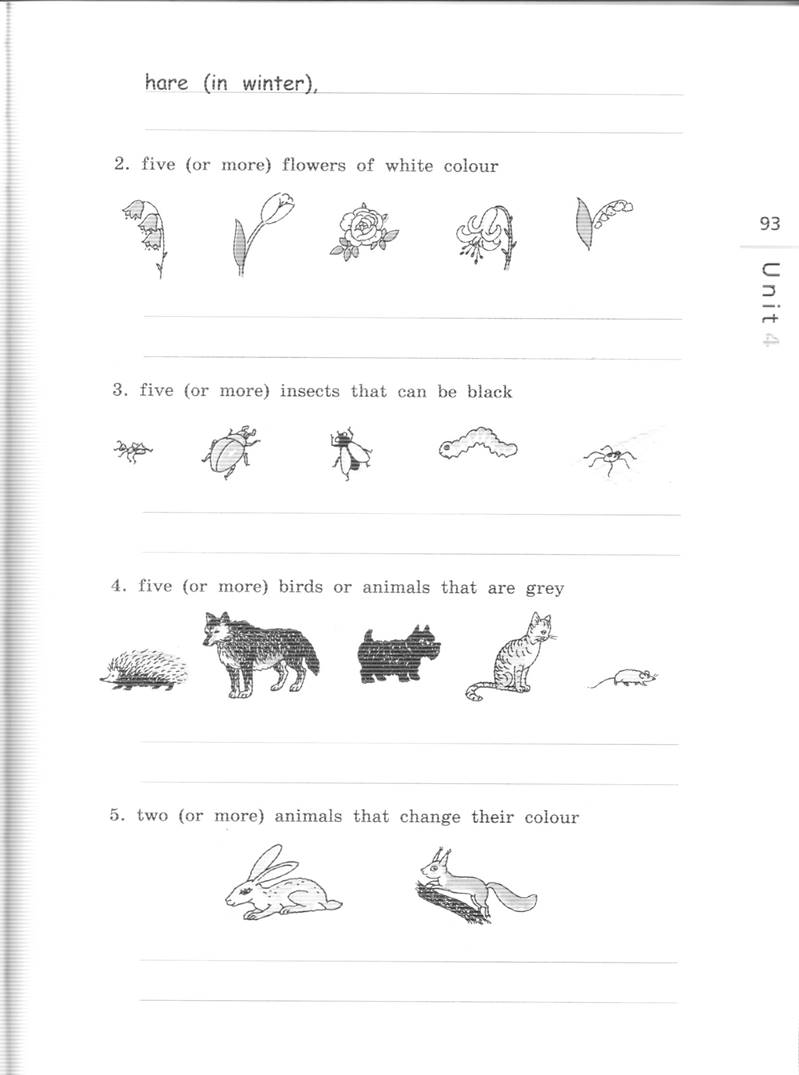
-Z Use the appropriate function words from the box to complete the sentences.
![]()
up, out(2), for, off, from, behind, till, about, to, in
![]()
1. My sister and me have always been very close to each
94 other.
c
|
2. He is really ill. He has been breathing coal dust l for many years. 3. It's now very common young people to use gad- gets wherever possible. 4. Mrs Wilson prefers to hide sad news her nu- merous relatives. 5. Johnny, do you think you have hidden the door? I can see you very well, dear. 6. How long is she going to support her children? think they should begin working. 7.
I have always
been curious that live and grow in the ocean. 8. The doctor asked me not to breathe for several seconds and then to breathe 9.
Actors usually
make 10. He is too far away. I can't make what he is saying. 11. I wanted to speak to Mr Stevenson but he made when he saw me.
|
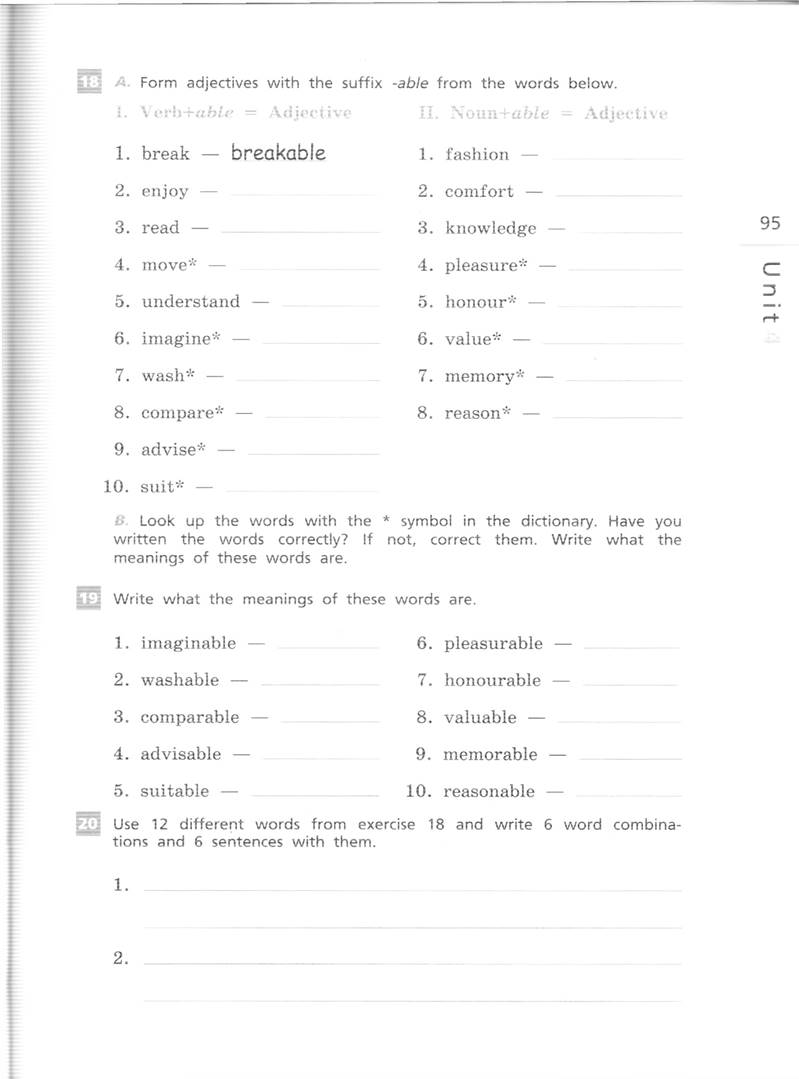
![]()
![]() 3.
3.
4.
96 5.
c
6.
7.
8.
9.
10.
11.
12.
|
3. |
My father told me that a nest with eggs |
|
|
|
|
in it was one of the most things in the world. |
beauty |
|
|
4. |
Once I found a nightingale's nest with |
|
97 |
|
|
six small eggs in a place in the middle of the field. I thought |
grass |
|
|
|
it was and of |
danger, |
|
|
|
the bird to build its nest on the ground. But they always do it. |
care |
|
|
5. |
During my early years I never had a mo- |
|
|
|
|
ment's or |
unhappy, |
|
|
6. The where we lived was |
ill; build |
|
|
|
far from the part of the town. |
centre |
|
|
|
7. Once on a day in winter |
snow |
|
|
|
I saw a white hare running in front of me. |
quick |
|
|
|
8. My father was the most |
wonder |
|
|
|
and father any boy ever |
excite |
|
|
|
had. He was a wildly person. And he was a fantastic storyteller. My favourite story was "The Big |
fun |
|
|
|
Giant", or "The BFG for |
friend |
|
|
short".
|
98 c |
22 23 |
9. I spent an morning in the forest watching birds and listening to their singing. 10.
Be you're holding is
Dogs and fish make (1) fantastic pets. They have something in common but they are quite (2) Both are (3
watch. Dogs like performing (4) tricks. They run and jump and follow you.
fish are fun to watch. They swim in their tanks and look just (7) You can play with a dog. Dogs are (8) true friends. Fish are not. On the
other hand, fish are (9) and don't need any (10) A. English people often use word combinations with the What do you think they mean? Write their Russian Look them up to see if your guess was right. 1. I'm going to travel round the world. Oh, to earth, it's
too expensive. |
enjoy care
the text. fantasy differ wonder
usual
colour tropic beauty real expense medicine noun "earth equivalents down. come down
|
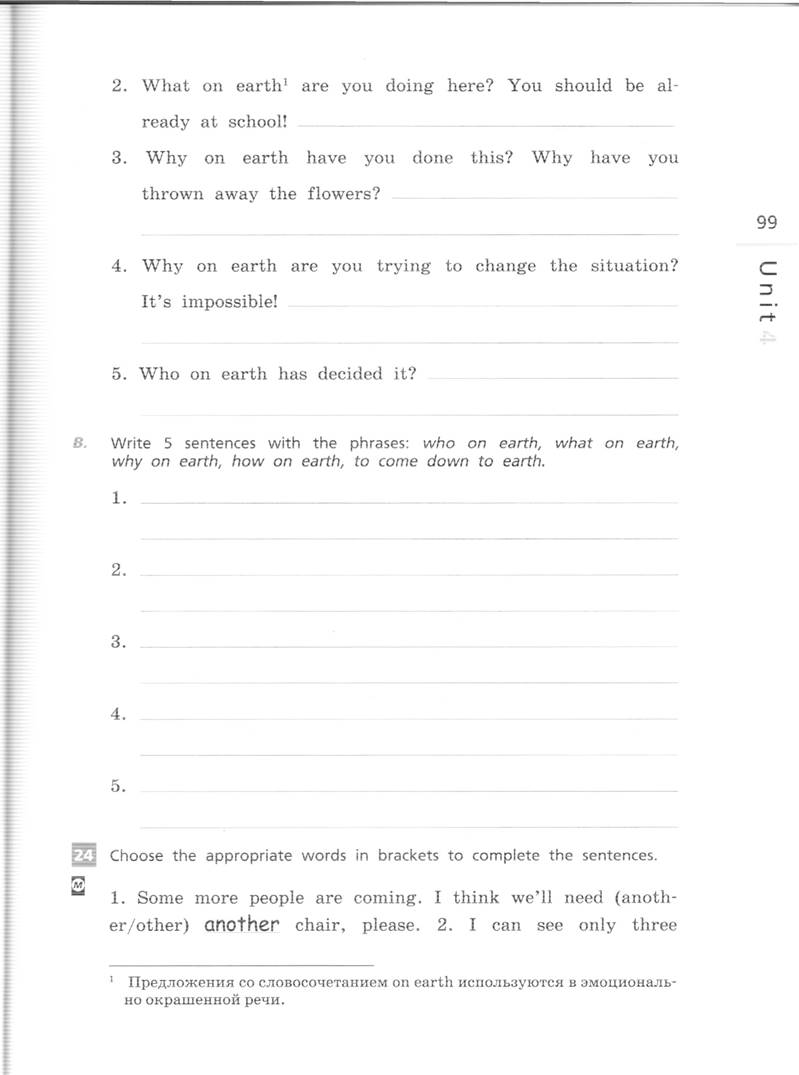
|
100
c |
photos. Where are (others/ the others) 3. Some metals are magnetic (others/ the others)
good. 6. Anna, can you tell (others/ the others) of your shoes is under the sofa, but where is (other/the other) should you
make (off/ up) go to school? It's not appropriate. 14. They made (off/out)
noisy in the room and I
couldn't make (off/out)
1. Somebody has stolen my bike. Someone has stolen my bike. 2.
Nobody will be
able to do that. |
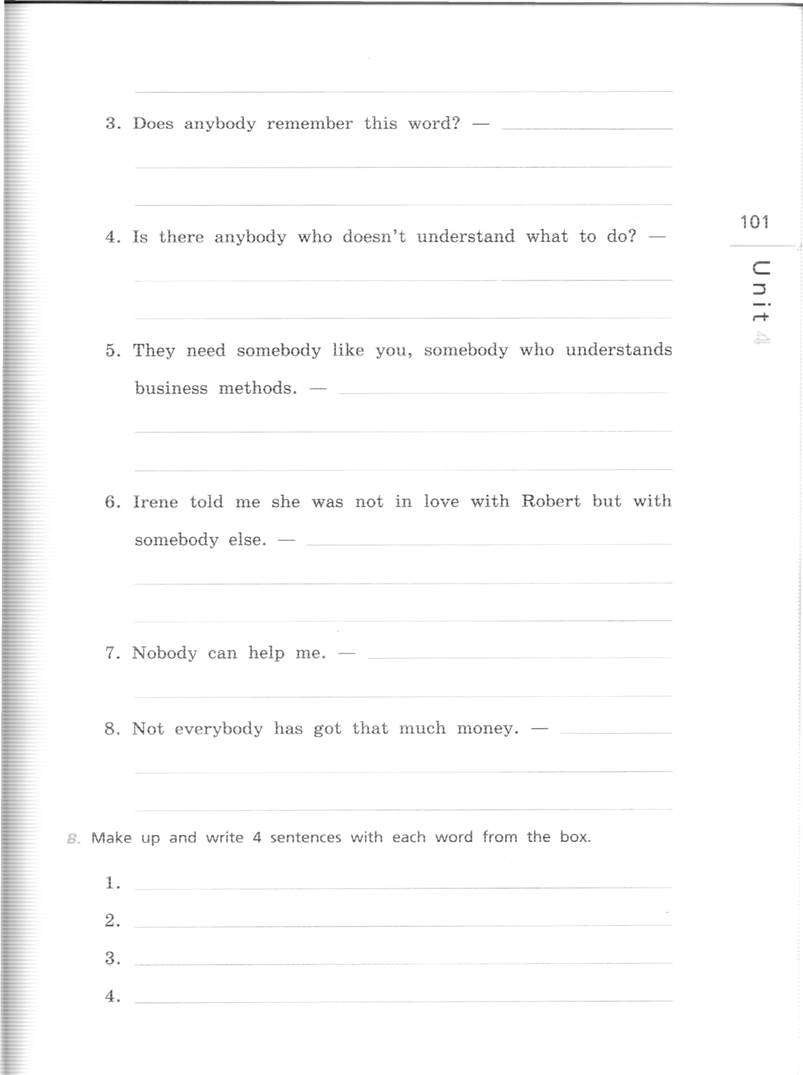
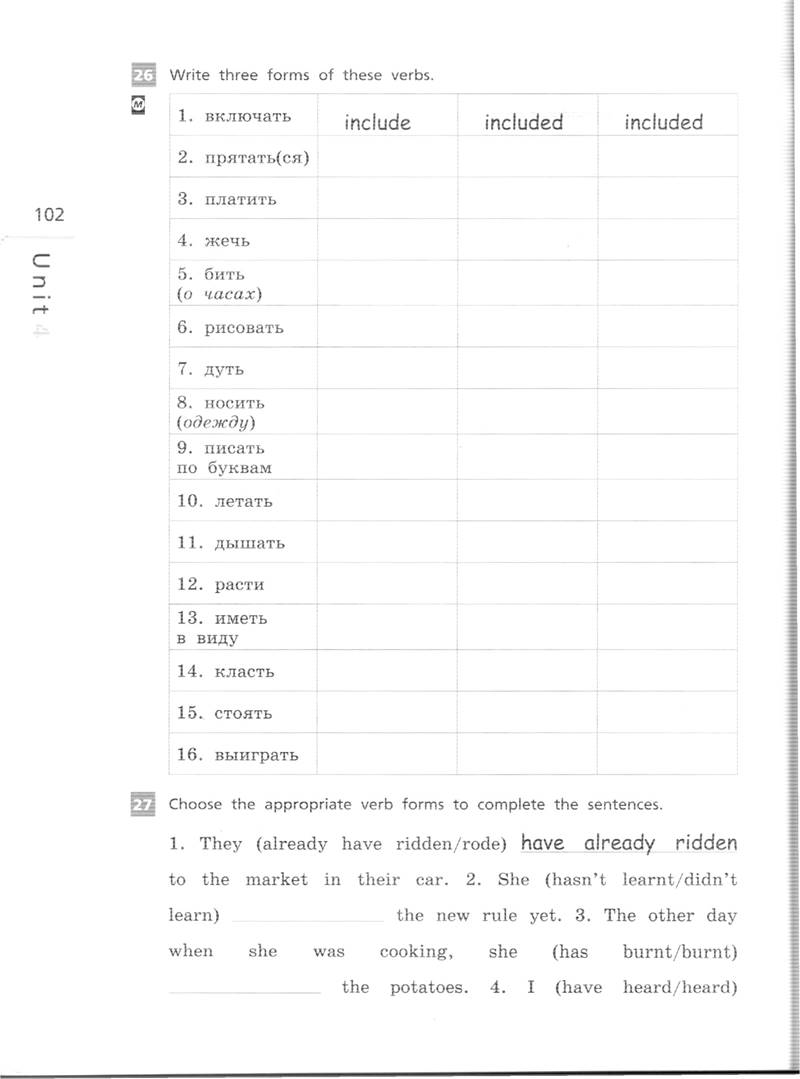
a very strange sound a minute ago. 5. We
never (have known/ knew) these facts. Can
you give us some details? 6. This year they (have won/won) two gold medals. 7. I (haven't forgotten/
103
didn't forget) your lie, and I will never
forget it. 8. When he was a child, he (has dreamt/dreamt)
to become a naturalist, but, you know, in
the end he (has become/became) a journalist. 9. I (have made/made) coffee. Would
you like to join me for a cup? 10. Sorry, dear, I (haven't
meant/didn't mean) to offend you.
11. Larry (has put/put) the disk on the
desk a minute ago. Where is it now?
28 Use the appropriate forms of the words on the right to complete the sentences.
1. Tree kangaroos live in the New Guineal forests. Their tails are longer than the they, long
bodies.
2. The mountain forests of northwest America
have the and the and old, large
the trees on the Earth. tall
3. Some of birds and animals which species
live in the tundra all the year round change colour. Arctic foxes, snowy owls,
1 New Guinea ['gmi] — H0Baq I'BVIHe51 (eocyôapcmgo)
snowshoe rabbits, stoats l and arctic hares turn white in late autumn, and they
|
change back to summer colours in spring. |
they |
|
4. The you go up a mountain, the |
high |
|
it gets. 5. Different animals in the savannah eat different. Giraffes feed on branches high in |
cold |
|
trees; antelopes feed on branches. |
low |
|
6. A desert is an area which has than 25 cm of rain, and very little plant life. |
little |
|
7. Many that live near the water |
fish |
surface2 are often blue, green or violet.
|
a stoat [stout] — ropHocrrañ a surface [k3:fis] — r10BepxHOCTb a |
|
ropHocrraii |
|||||
|
|
|||||||
|
stoat [staut] — |
|||||||
|
8. Bamboo in India, the Far East and China. It is one of the |
grow |
|
|
|||
|
growing plants, height [halt] can be about 30 me |
fast, it |
|
|
|||
|
tres. |
|
105 |
|
|||
|
9. The living thing on the Earth is the giant redwood tree, growing in the USA and Canada. |
large |
c |
|
|||
|
tree is 112 m high. |
tall |
|
|
|||
|
This is much than the statue of Liberty in New York, which |
tall |
|
|
|||
|
at 93 m. |
stand |
|
|
|||
|
|||||||
Complete the text using the appropriate forms of the words on the
Part I
One day my father came home and
|
|
(1) brought a small kitten with him. |
bring |
|
I |
(2) name dad (3) was Major. Major was just a skinny, mewing kitten with a tail like a mouse's. In a few months he |
it, say |
|
|
fairly bigger and stronger. He |
become |
|
|
was really the (5) cat in |
brave |
|
|
the block. When he (6) in the |
appear |
|
|
yard, all othercats suddenly (7) |
run |
|
106
|
off.
Every day Major (8) house for several hours. I loved Major and (9) Part 11 One day my dad asked me, "You (1) year, but
look, how fat he (3) I agreed. Every day Major (4) (5) (7) much more. My dad smiled, "Probably (8) cat will end up the (9) cat in the town." One night 1 (10) sounds,
"Peep, peep." They (11) (12) 1 (13) up and loo- ked into
the closet. Boy, what I (14) there? You won't believe, but there (15) Complete the sentences using the verbs in brackets in or in present perfect progressive. 1. It (snow) has been snowing all morning. snowing. 2. It just (stop) |
leave
notice
hear come
be present perfect And it is still snowing. |
107
|
Look, how
|
beautiful the trees are. 3. Jane (play) volleyball professionally for several |
|
years. 4. |
I'm sorry I'm late. How long you (wait) |
![]() stairs, cleaning her bedroom. She
(do)
stairs, cleaning her bedroom. She
(do)
![]()
![]() it
since morning. 6. I (read) c
it
since morning. 6. I (read) c
the story up to the end. I can't say I like it a
![]() lot. 7. Sue is in the garden. She
(plant)
lot. 7. Sue is in the garden. She
(plant)
flowers since 9 a.m. I don't know if she (plant)
all of them. 8. Hello, Betsy! What
on earth are you doing here? I am trying to find an English-French-Spanish Dictionary. 1 (look)
![]()
![]() for it all morning. 9. My cousin
(learn)German for five years but
for it all morning. 9. My cousin
(learn)German for five years but
11. Ron (read) this book for two
months. When do you think he will finish it?
Read the sentences and write in which of them the action expressed by present perfect progressive has finished (F) and where it is still going on (G).
1. Justin has been playing the piano for an hour already.
2. My hands are dirty because I've been planting flowers in our garden.
3. ![]() I'm really tired, Chris. How long are
we going to stay in this shop?
I'm really tired, Chris. How long are
we going to stay in this shop?
![]() We have been doing shopping since
morning.
We have been doing shopping since
morning.
4. — Why are your hands green?
I have been painting the benches in our garden.
5. You have been working on the computer for 3 hours. Don't you think you need a break?
108 6. Olga's sweater is too small for her. She has been wearing it since she was ten.
7. I have been listening to you for half an hour but you haven't even begun answering the question.
8. The children have been writing a test for nearly an hour. I hope they will finish it soon.
Write greetings cards to your friends and relatives. Social English Section can help you.
1. It is the 31st of December. You are writing to your parents.
o 0 0 0 M O o 0 M o M O Happy New Year dear Mother and Father!
Your son/daughter.
o o o
2. Your brother Tom has his birthday tomorrow.
0 O e o M 0 M 0 M O O
00
o o
3. It is the 8th of March. You are writing to your Aunt Rachel.
O O o
O o o O o O O o
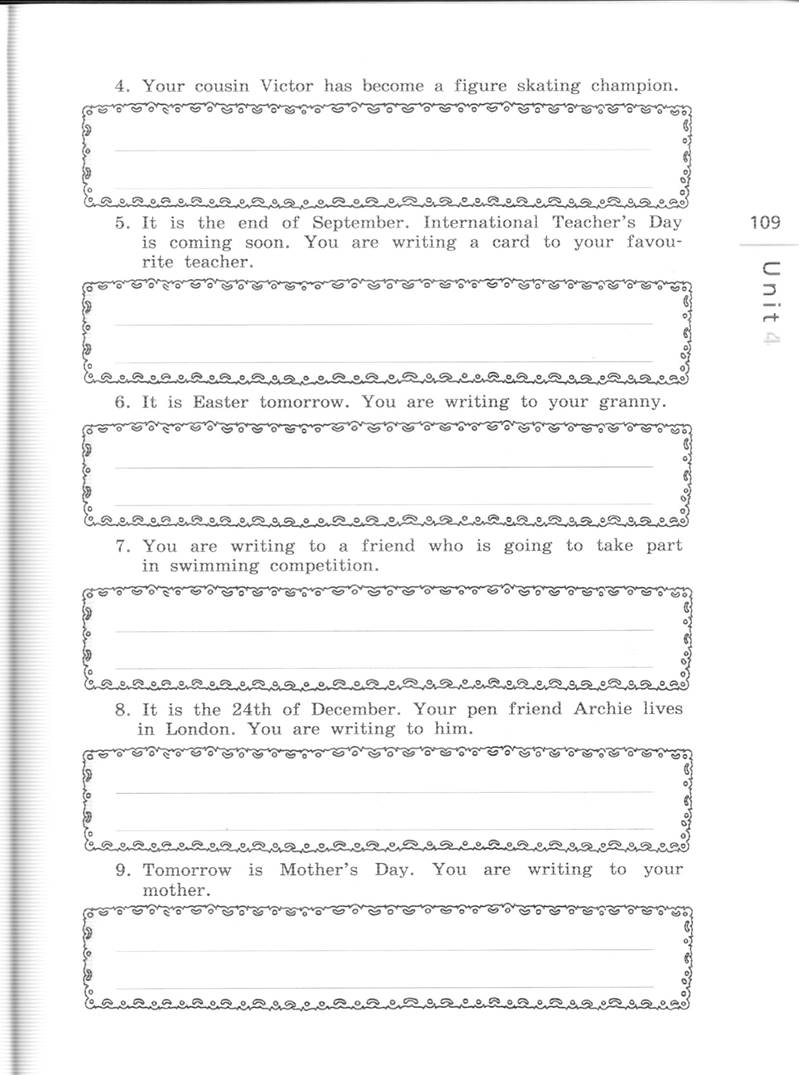
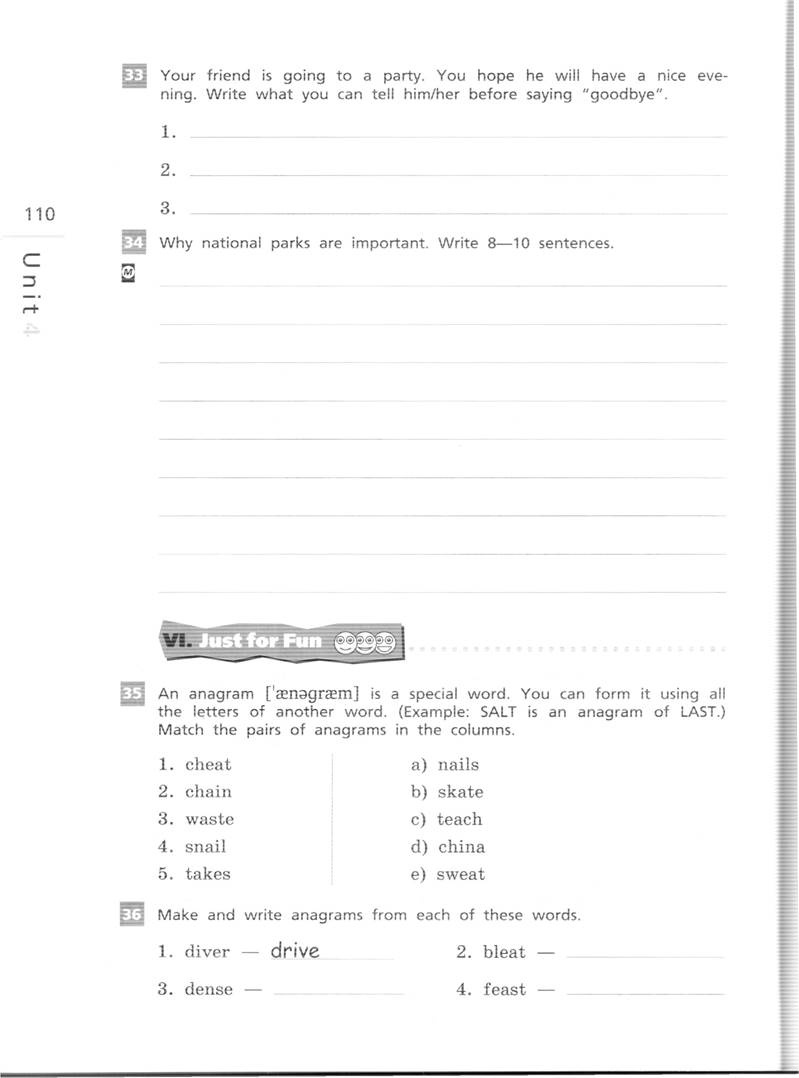
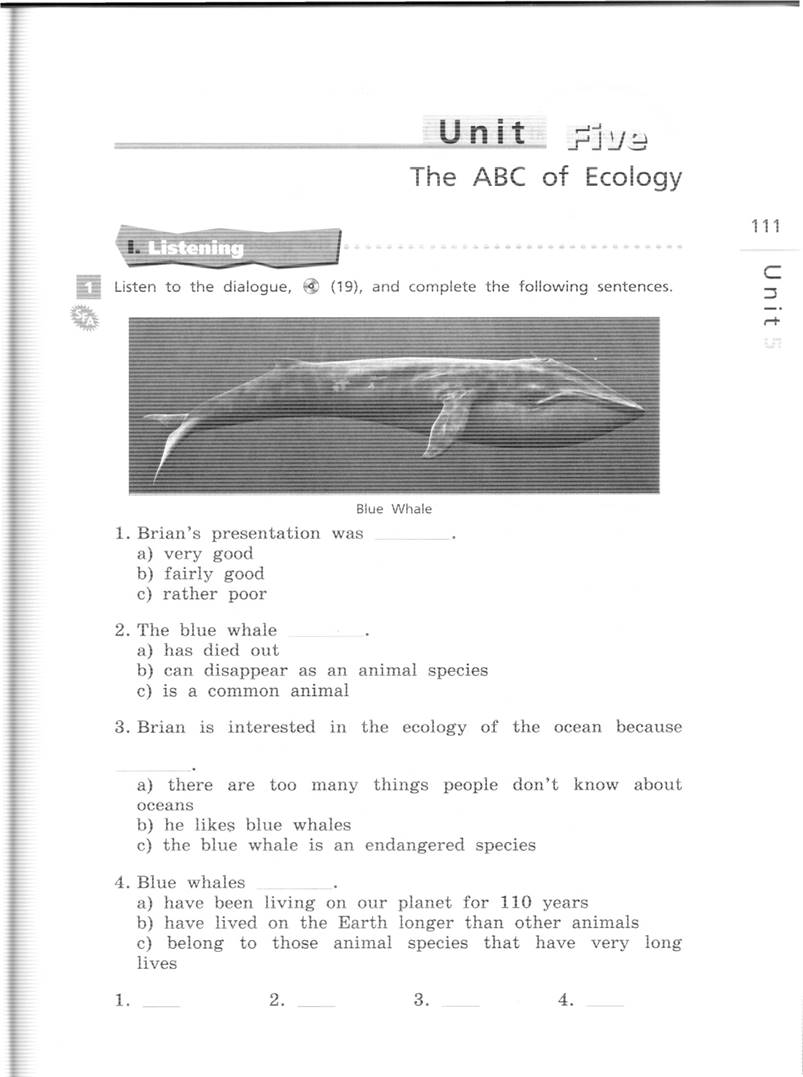
|
112
|
= Listen to the text, @ (20), and decide which of these facts are true false (F) or not stated (NS) in it. 1. Ecological problems have become some of the most important now. 2. People all over the world are trying to solve this problem. 3.
4. People are trying to keep their environment clean and beautiful. 5. Only big radical steps can help to protect our environment. 6. The text gives examples of only those rules that help to stop pollution.
Read the words in transcriptions, then listen and check, @ (21).
[Inesasri] [ritsponsabl] [pra'tekfn] [almAIJ] [hnfluans] [pmsn] [dllsknmfat] [Ikist11Jkt]
Read the words, word combinations and sentences, then listen and check, (22). a) nature, unpolluted, payment, disbelieve, endanger, pollution, disagree, enjoyment, law, member, dump, protect, factory, habitat, among, movement b)
c) I'd like to know more about the endangered species of animals living on our planet. Air pollution damages forests. People would like to live in an unpolluted world. What is necessary to save our environment? Everyone hates dishonest behaviour. Don't waste time, help Mother Nature now. That old film had a great influence on me. |
|
There is a great number of factories in this part of the city. By the way, I've taken down everything you said. No one will help us if we don't help ourselves.
Read the text and say which of the following is not mentioned in it.
|
Our planet is 4,600 million years old. Let's think of it as a person who is forty-six years old. We don't know |
1 13 |
|
anything about the first |
c |
seven years of this person's life. We also have very little information about the next thirty-five years. It was only at the age of forty-two that plants began to appear. Dinosaurs and great reptiles [ i reptallz] did not appear until one year ago, when the planet was forty-five. Mammals only arrived eight months ago. In the middle of last week apes became ape-like men and began to communicate with each other. Last weekend, the Ice Age covered the Earth.
Modern man has only lived on this planet for about four hours. During the last hour man began to work on land grow plants and keep domestic animals. The Industrial Revolution and the rise of large cities began just sixty seconds ago.
During those sixty seconds of biological time, modern man has turned a lot of land into a rubbish dump. In one minute he has killed hundreds of species of animals. He has damaged the soil of his planet, cut down its forests. Now modern man stands looking at the damage he has done to the planet like a child stands looking at the toys he has broken. What step will he make next?
1. The age of planet Earth.
2. The period of time when there was no life on the Earth.
3. The period when life began to develop.
4. The activity of man on the Earth.
5. The positive results of people's activity.
6. The negative results of people's activity.
No.
Read the text and complete the sentences after it.
Jason Taylor is a sculptor. He has made underwater sculptures which attract corals. This idea came to Jason when he was swimming in the Caribbean Sea and saw how badly tourists damaged a coral reef. Then Jason thought about making underwater parks of sculptures to attract swimmers. "That could give the real reef time to recover," he says. Over the past twenty years we have lost about 40% of the planet's natural coral reefs. Scientists say we can lose 80% by the year 2050. So Jason Taylor is trying to help our planet with his underwater art. To make his sculptures he 114 uses special eco-friendly materials, like limestone. They don't pollute the ocean and attract sea animals corals, lobsters, crabs, and shrimps.
One of the most famous of Taylor's underwater parks is in Mexico. There he has created a large artificial reef whose size is 420 square metres. Among its 400 sculptures there is a copy of a car. Taylor used a car for his work to show that cars pollute the air on our planet.
Divers like Taylor's underwater parks very much. Every time they visit a park, it looks a little different. "My sculptures change all the time," says Jason. "And this is what I like best, the most wonderful part of my work. One of my sculptures has grown long hair. Some underwater plant started growing on its head and now it has long and beautiful hair."
1.
a) to attract more divers to the Caribbean Sea
b) to save the Caribbean Sea from pollution
c) to save the real reefs from the divers
2. Taylor's underwater parks are ![]()
a) a kind of underwater art gallery
b) a home for sea creatures
c) a good place to learn to dive
3. Taylor has created
a) one big underwater park in the Gulf of Mexico
b) several underwater parks
c) several large underwater parks
4. Taylor's underwater parks
a) always develop
b) change from time to time
c) never change
1. 2. ![]()
3. 4.
![]()
|
|
Read the text and mark the sentences as true (T), stated (NS).
Scientists say that Lake Baikal is the oldest lake on planet Earth. Usually lakes don't live longer than a million years but this wonderful lake is more than 25 million years old! For scientists it is a living laboratory of evolution. Lake Baikal is also the deepest lake in the world, it is 1,637 metres deep from tom. With time the lake becomes wider and is a theory that Lake Baikal is the beginning ocean. The lake holds one-fifth of the planet's |
false (F) or not
top to botdeeper. There of a new fresh water |
115 c |
and this water is incredibly clean.
Lake Baikal is one of the most beautiful places on the Earth. Everyone who has been on its shores knows how unusual and how mighty it looks. The lake is very difficult to describe: its clear waters change colours all the time. The snows of Siberia come to Lake Baikal in early October. At the end of October ice begins to appear on its surface. In winter the ice gets very thick — well over a metre. (In 1904, during the Russo-Japanese War they laid a railway across the ice to carry guns to the front and the ice didn't break under its weight.) In April the ice begins to turn into water and the lake becomes so large that sailors and fishermen here talk of "going to sea".
![]() The water in the lake is never warm.
In summer its temperature is about +12 degrees. But a lot of people still enjoy
swimming in it. They say swimming in the waters of the lake is good for their
health.
The water in the lake is never warm.
In summer its temperature is about +12 degrees. But a lot of people still enjoy
swimming in it. They say swimming in the waters of the lake is good for their
health.
Lake Baikal is a living museum of water plants and animals. About 1,500 species of animals here are endemic. Endemic means that you cannot see them anywhere else in the world. The -lake is rich in life. Its waters move vertically, carrying oxygen to the very bottom, The lake still keeps a lot of secrets from people. One great mystery about the lake is how nerpa, the Baikal seal, appeared in the lake which is hundreds of kilometers from any ocean, and made the lake its habitat.
The lake lies among beautiful mountains. The Baikal Mountains on the north shore and the taiga belong to a national park. The greatest problem here is to keep all this natural
![]()
![]() beauty and protect the lake from
pollution. Every year the lake attracts more and more tourists, so the task is
not at all easy.
beauty and protect the lake from
pollution. Every year the lake attracts more and more tourists, so the task is
not at all easy.
1. Lake Baikal can help people to understand how life developed on our planet.
2. The size of the lake changes with time. 116
3. The water in the lake is very clean but cold, c so people don't swim in it.
4. The lake has a number of islands big and small.
5. The lake's flora and fauna make it unique.
6. Some ocean animals live in the lake.
7.
![]() Speak about why environmental problems
have become some of the most important nowadays. Mention the possible results
of:
Speak about why environmental problems
have become some of the most important nowadays. Mention the possible results
of:
: air,
water and soil pollution; ![]() global warming;
global warming; ![]() cutting down forests;
cutting down forests; ![]() extinction of plants and animals.
extinction of plants and animals.
![]() Speak about why we can solve ecological
problems only if we work
Speak about why we can solve ecological
problems only if we work ![]() together. Mention:
together. Mention:
![]() international cooperation;
international cooperation; ![]() ecological societies;
ecological societies; ![]() what everyone can do to help protect nature.
what everyone can do to help protect nature.
![]() Say as much as you can about protecting
wildlife. Use some of the following words and phrases:
Say as much as you can about protecting
wildlife. Use some of the following words and phrases:
•
extinct,
endangered and protected species; ![]() plants and animals;
plants and animals; ![]() can't protect themselves;
can't protect themselves; ![]() damage their natural habitat;
damage their natural habitat; ![]() disappear from the face of the planet;
disappear from the face of the planet;
![]() climatic changes make the problem more serious;
climatic changes make the problem more serious; ![]() study the problem;
study the problem; ![]() cooperate with scientists from other
countries;
cooperate with scientists from other
countries;
1
![]() make necessary national and international laws;
make necessary national and international laws; ![]() make international agreements;
make international agreements;
•
be responsible for
one's actions; ![]() help to survive.
help to survive.
![]() Continue
the dialogue and act it out.
Continue
the dialogue and act it out.
![]()
![]() I say, is it true that you've just
come back from India?117
I say, is it true that you've just
come back from India?117
![]() Yes, it is. It's been a fantastic
journey.c
Yes, it is. It's been a fantastic
journey.c ![]() I bet l ! But why India?
I bet l ! But why India?
![]() I've always been interested in this country and its culture. India is
also a place of great natural beauty with its high mountains, mighty rivers and
thick forests.
I've always been interested in this country and its culture. India is
also a place of great natural beauty with its high mountains, mighty rivers and
thick forests.
![]() And what is your greatest impression?
And what is your greatest impression?
![]() It's difficult to say. Let me think... Maybe the Jog Falls on the
Sharavathi River. This place is situated among wooded mountains and it is
incredibly beautiful.
It's difficult to say. Let me think... Maybe the Jog Falls on the
Sharavathi River. This place is situated among wooded mountains and it is
incredibly beautiful.
![]() One of the largest in India. It has four cascades of water that fall
across a rock wall.
One of the largest in India. It has four cascades of water that fall
across a rock wall.
![]() Wow! What else makes the place so special?
Wow! What else makes the place so special?
![]() It's a home to many species of plants and animals. By the way, the place
is becoming more and more popular with tourists.
It's a home to many species of plants and animals. By the way, the place
is becoming more and more popular with tourists.
![]() Do you think they will keep the place unpolluted?
Do you think they will keep the place unpolluted?
![]() How can they do it?
How can they do it?
![]() Yes, you're right.
Yes, you're right.
![]() Complete
the dialogue and act it out.
Complete
the dialogue and act it out.
![]() Look, do you always cycle to school?
Look, do you always cycle to school?
![]() I try to. (1)
I try to. (1)
![]() I know that the bicycle is the most eco-friendly transport but (2)
I know that the bicycle is the most eco-friendly transport but (2)
![]()
1 | bet! —
Mory ceõe rrpewraBHTb! ![]()
![]() It's no problem. I just put on warm or
waterproof clothes. By the way, there are countries where millions of people
use bikes to get to offices, universities and schools.
It's no problem. I just put on warm or
waterproof clothes. By the way, there are countries where millions of people
use bikes to get to offices, universities and schools.
![]() (3)
(3) ![]()
![]() Holland is a very good example. The country
is successfully solving the problem of air pollution.
Holland is a very good example. The country
is successfully solving the problem of air pollution.
118
Well, we all know how badly cars and buses pollute the c
air. If people don't use them, they will cut down on pollution.
![]() I'll think about it. Maybe (5)
I'll think about it. Maybe (5)
13 Read the text and complete the story.
![]()
![]()
![]() This
means that airplanes, vans and lorries burn fuel and pollute the air. People
can try to cut down on pollution by eating more local foods. The idea is to eat
90 per cent of our diet from the country where we live. It is better for our
health and for the health of our planet.
This
means that airplanes, vans and lorries burn fuel and pollute the air. People
can try to cut down on pollution by eating more local foods. The idea is to eat
90 per cent of our diet from the country where we live. It is better for our
health and for the health of our planet.
This may be an example of a healthy menu for the place where I live.
Breakfast: ![]()
Lunch: ![]()
Dinner:
Tea:
![]()
![]() These
words belong to Albert Einstein. Comment on them.
These
words belong to Albert Einstein. Comment on them.
: Learn from yesterday, live for today, hope for tomorrow.
• I never think of the future comes soon enough.
|
see with their eyes their minds. |
and think with |
1 19 A. Einstein c |
•
![]() Small is the number of people who
Small is the number of people who
![]() Spell
these words.
Spell
these words.
1.
['rnfluans] influence 10. ['fæktri] ![]() '2.
[P3.•sn]
'2.
[P3.•sn] ![]() 11. [saivarv]
11. [saivarv] ![]()
3.
[Ineseseri]
![]() 12. ['hæbltæt]
12. ['hæbltæt] ![]()
4.
[imu:vmant]
![]() 13. [pollu:Jn]
13. [pollu:Jn] ![]()
5.
6.
['stAdi]
![]() 15. [IneltSê]
15. [IneltSê] ![]()
7.
[In
tvalaranmant]![]() 16. [r/sponsrbl]
16. [r/sponsrbl] ![]()
8.
![]() 17. ['memba]
17. ['memba] ![]()
9.
![]() 18. [praltekSn]
18. [praltekSn] ![]()
![]() Complete
the sentences with the derivatives of the words on the right.
Complete
the sentences with the derivatives of the words on the right.
![]() 1.
The teacher thanked his pupils for their good behaviour during the school trip.
behave
1.
The teacher thanked his pupils for their good behaviour during the school trip.
behave
2. Nobody thought about the comfort
of living in a tent.
3.
The
child ran to his mother for protect![]()
4. The latest s in science of- develop
ten surprise us.
5.
![]() The animal
turned with a quick
The animal
turned with a quick![]() move
move
6.
|
120 |
water. |
|
|
c |
7. It was dark and the road looked |
danger |
|
|
8. She was about her age because she wanted to get that job. |
|
|
|
9. Mr Griffin is one of the most |
power |
|
|
10. Alice and Diana about everything. |
agree |
|
|
11. Wild animals are happier in their habitat than in a zoo. 12. Her story didn't sound true, we all |
nature |
|
|
it. |
believe |
|
|
13. I didn't get any real |
enjoy |
from the game.
![]() Complete the text with the derivatives
of the words on the right.
Complete the text with the derivatives
of the words on the right.
|
|
Christmas is the time of (1) happiness and |
happy |
|
|
(2) but it's not a good time for everyone. Take turkeys, for example. Every year millions of turkeys end up on a dinner table. But not Lofty. Lofty is |
enj oy |
|
|
bird. He was born on |
luck |
![]() 121
121
c
|
122 |
4.
He will help
you if you 5.
6. My friend's hobby is collecting
coins, he 7. Everyone wants to live and have a life. my homework when my cousin called to invite me to the skating rink. 9. It isn't a new backpack, 1 it since last year. 10.They say that Scotland has the number of people with red hair in the world. Complete the text with the appropriate forms of the right. Ants (1) have been on planet Earth for more than 140 (2) years, (3) than dinosaurs. All ants live in colonies but there are surprising differences in their way of life and their hab- its. One of the (4) kinds of ants is the "army ant". These ants go
|
ask man man collect long do have high words on the be million long interesting |
mean
|
out in armies of many (5) They kill and eat anything in their way: insects, snakes, lizards, birds... Now you may ask, "How can a little insect like the ant kill and eat everything in its way?" Well, |
thousand |
123 |
||
|
there are so many of (6) and if the creature (7) |
|
|
they not run |
c |
|
away, the army ants (8) even if it's a crocodile. |
|
it, |
kill |
|
|
Some army ants make black |
ants work |
for |
|
|
|
them just like slaves. If |
you ever |
(9) |
|
|
|
a colony of |
army ants, |
be |
meet |
|
|
careful! (10) |
ants will |
at- |
this |
|
|
tack any living creature |
and yes, that |
|
|
|
(11) you too!
Match the words with their descriptions.
1. extinct a) stay alive, not to die
|
|
|
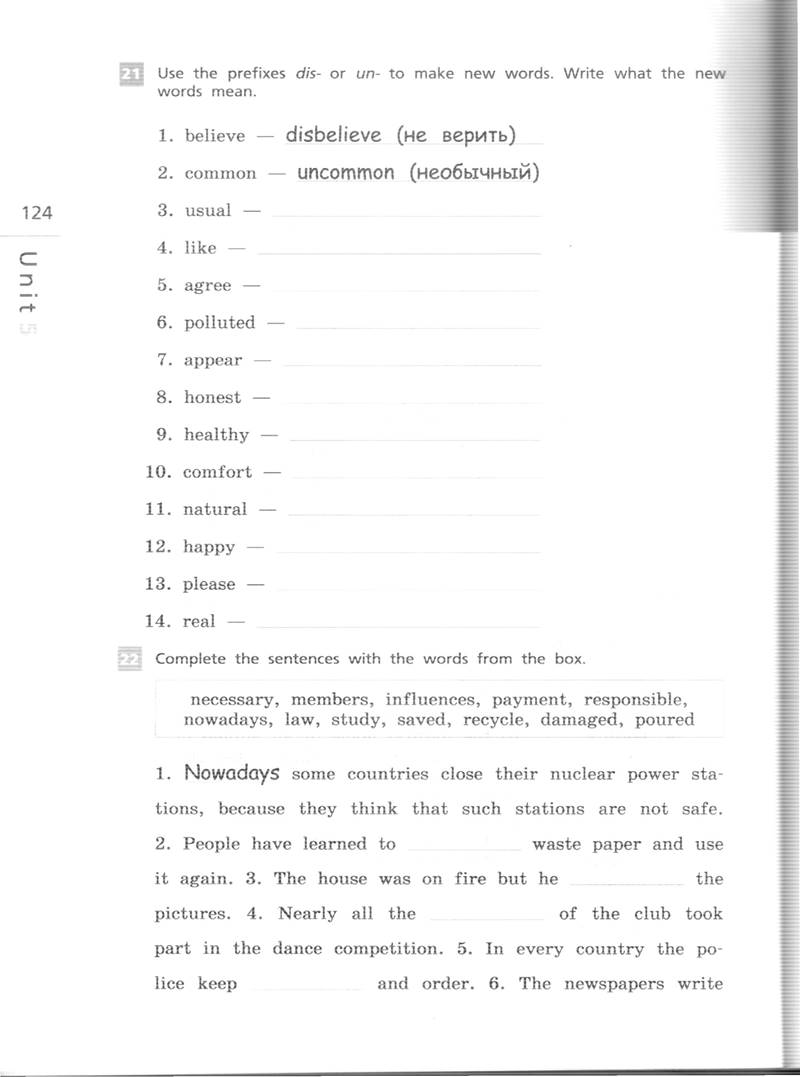
that last night the fire several buildings. 7. Is
it to have a visa to go to this country?
8. The weather often us: we usually feel bet-
ter when the sun is shining and the sky is cloudless.
9. We'll make one person for buying the food. 125
10. She the milk into a bowl and left the
bowl at the door. 11. Give yourself time to the problem carefully. 12. He gave me this book in
for my help.
Complete the sentences with the right prepositions where necessary.
1. We had a number Of ideas about how to spend our holidays. 2. My parents' words always had a great influence me. 3. It's really necessary her to spend
more time with her friends. 4. It's very bad that some factories pollute the environment. 5. Please pour some hot water my mug. 6. To stay here any longer will
be a waste time. 7. When I first read the book, it
didn't influence me at all. 8. Jack is a member
our ecological society. 9. The house stood in the
forest the green trees. 10. How can we save our planet danger? 11. We are all responsible
the work we are doing. 12. I'll tell you the truth but it
must be you and me. 13. In this street there are
two food shops and a cinema between. 14. I've lost my way again; it happens me every time I come to
a new place.
I![]()
Choose the appropriate words in brackets to complete these sentences.
A. 1. We agreed to meet (among/between) between
2 0'clock and 2:30. 2. She divided the work (among/between) all the pupils in the class. 3. The twins di-
126
vided the chocolate (among/between) them. c 4. I want to tell you something but it's (among/between) you and me. 5. The house stood (among/between) the trees in the middle of the little grove.
1. I quickly took (in/down) her name and ad-
dress. 2. That day I felt unwell and couldn't take (in/down) what the teacher was saying. 3. The plane took (off/ up) for Rome at 9:30. 4. He has taken (off/ up) the piano. 5. It's good manners to take (down/off) your hat when you enter a house.
6. There are a number of simple rules that I hope you'll take (up/in) 7. My brother took (up/ in)
painting only a year ago but he can already paint very well.
Complete this table of pronouns.
1
you yourself
he him
she it it we ourselves
you they
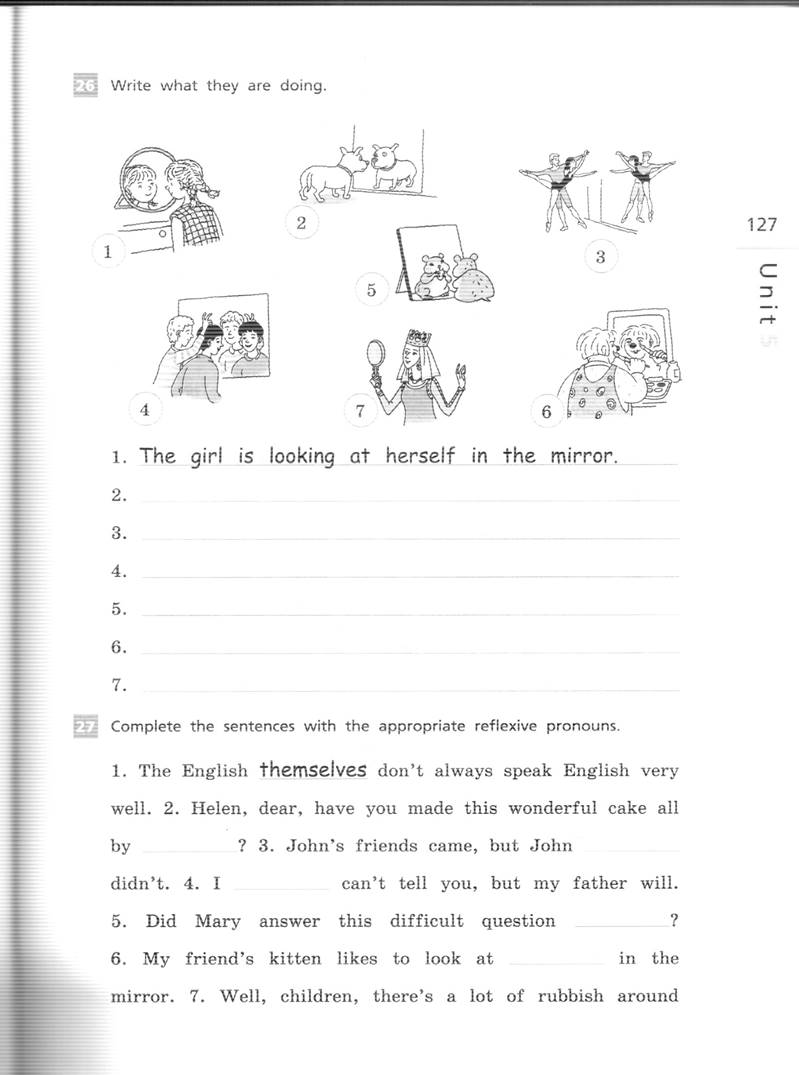
the school building, prepare for hard work.
8. Our parents were ready to help us, but we decided to do everything 9. The film is brilliant, I'm sure you'll enjoy girls. 10. I'm leaving you for just one
128
minute, George. I hope you will behave
11. This time the boys made a fire and put up the tent all
by 12. We didn't take part in the
match, we just watched it.
28 Complete the sentences with the appropriate reflexive pronouns where necessary.
1. There are many tasty things on the table. Help yourself l ! 2. Children should know how to behave in public. 3. Did you and your friends enjoy at the picnic yesterday? 4. My little brother likes to hide somewhere in the house and ask us to find him, it's his favourite game. 5. Don't ask me, I have no
idea about it 6. The girls bought
beautiful scarves and were very happy. 7. How is
your head? How are you feeling now?
8. You'll get a nice present if you behave
9. Dress quickly, we must leave the house in ten minutes not to be late. 10. It was very pleasant to
bathe in the river on a hot summer day.
11. My brother made the model of the ship
Help yourself! — Y1'01-gañcfl!
with his own hands. 12. Young children shouldn't live by somebody must look after them. 13. Every morning I make tea for my parents and
29 Use few, a few, little, a little to complete the sentences.
129 1. There are few people who know the truth about those events. 2. I'm sorry to say there's we can do to c help him now. 3. I have books that you may borrow, they will help you with your project. 4. Is there any
soup left? Yes, 5. He lives on his own and
friends visit him nowadays. 6. We hope our team will win: there are really good players in it.
7. It's a very difficult question, may I think
8. I'm afraid, we have information about the expedition. 9. May I have hot water to make a cup of tea, please? 10. I have nothing to say, but I have questions I'd like to ask. 11. There's milk in the bottle, you may have it if you want. 12. of you are old enough to travel on your own. Ask your parent to accompany you.
30 Choose the appropriate verb forms to complete the sentences.
1. Jack b money for a long time; he enough to buy a new bike.
a) has saved b) has been saving
2. The Smiths the farm since the 1950s.
a) have owned b) have been owning
3. Margo since she was a little girl. Nowadays she
does it professionally.
a) has sung b) has been singing
4. Don to become an ecologist and protect nature.
130
a)
![]() has always
wanted b) has always been wanting
has always
wanted b) has always been wanting
c
5. We Russian for many years but we often find the spelling of some Russian words difficult.
a) have learned b) have been learning
6. Becky pets, now she has a number of them.
|
a) has always loved b) has always been loving 7. Come and have tea with us, I a cup for you. a) have poured b) have been pouring 8. People about the problem of pollution for more than a hundred years. a) have known b) have been knowing 9. A number of good books a great influence on me. a) have had b) have been having 10. The flat looks so nice. a) Have you cleaned b) Have you been cleaning Use present perfect or present perfect progressive of the verbs in brackets to complete the sentences. 1. They (be) have been friends for many years and are very devoted to each other. 2.
We (not play) time, I don't remember its rules well. |
3. What are you laughing at? What (I say)
|
4. Jane looks tired, I think she (work) the garden. |
in |
|
5. This author (write) children's books |
for |
|
many years, a lot of people know and read them. |
131 |
|
6. What (influence) your decision to come an engineer? 7. Scientists at home and abroad (study) the problems of ecology for many years now. |
c be- |
|
8. The family (live) at the seaside since af- |
|
|
ter the war. |
|
|
9. I (know) Peter since we went to school |
|
together.
10. A number of old trees are lying on the ground. It's clear that a very strong wind (blow)
11. The young people (not meet) for two
years and are happy to see each other again.
12. She'd like to travel about Russia. She (have) this idea since she first saw Lake Baikal.
-Writing
32 Read the text and write 6 questions you could ask about the giant flower.
The largest flower in the world is Rafflesia. It can be 1 metre wide and weighs 10 kilograms! But it smells very unpleasant.
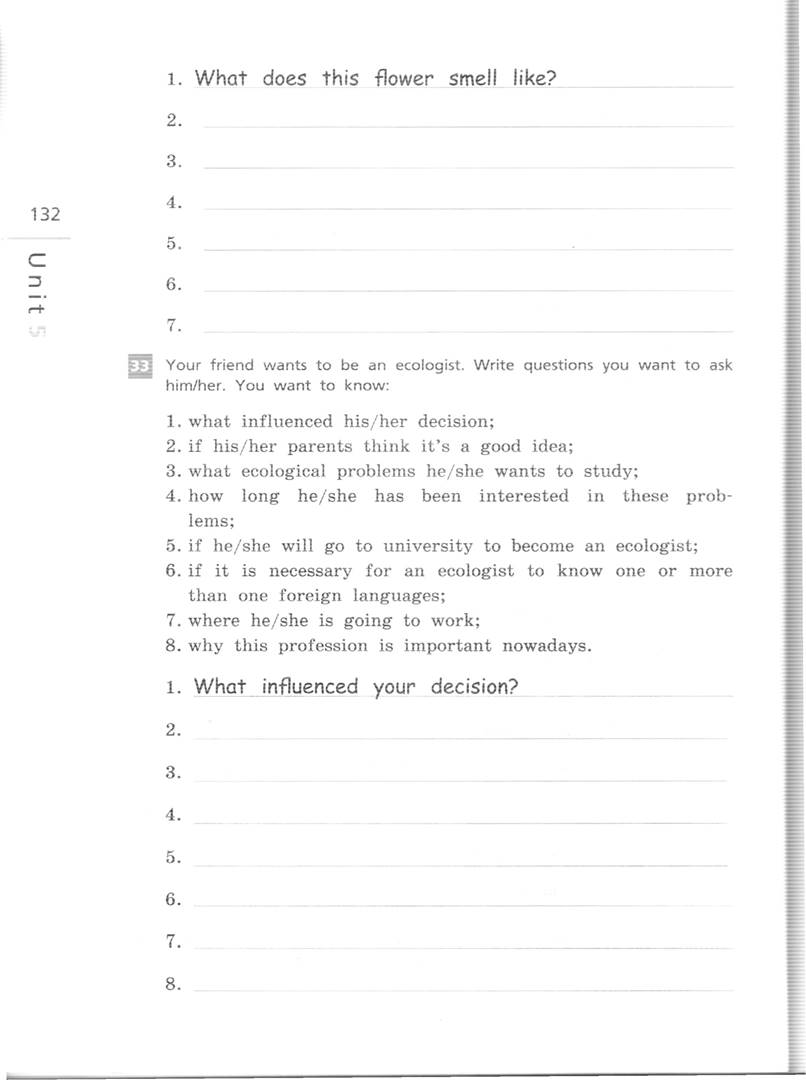
|
|
|
|
Hi! It's been a long time since I wrote to you. Sorry. In fact, I've been away on a school trip to one of the national parks. We stayed there three days sleeping in guest houses and walking about a lot. I've always been interested in wildlife so I quite enjoyed myself. I can say that I saw a number of interesting animals and learned some important things.
|
|
![]()
![]() 1. Sea snakes can dive 100 metres deep and stay under
water for up to 5 hours. Some of them can swim at the
1. Sea snakes can dive 100 metres deep and stay under
water for up to 5 hours. Some of them can swim at the
rate
of 1 metre per second. 2. ![]() can jump
can jump
5.5 metres up into a tree. 3. ![]() can
jump 134 over obstacles as high as 3 metres. Using their powerful
can
jump 134 over obstacles as high as 3 metres. Using their powerful
c
hind legs, they can travel as far as 9 metres in one huge
leap. 4. can swim faster than a cheetah
can run. Its top speed is 109 kilometres per hour.
5. sometimes leap straight into the air
from the tree tops to catch insects. These leaps may be up to 60 metres. 6. can climb incredibly steep
slopes, jump from rock to rock and leap across dangerous
ravines. 7. are fairly large animals but
they are extremely acrobatic. They can move through the trees faster than a man can walk on the ground. They can also walk along small branches high up in the air.
36 Here are three computer jokes mixed up. Put the lines (a—f) in the appropriate order.
a) It left its Windows open.
b) Data.
c) Made a website.
d) Why was the computer cold?
e) What does a baby computer call its father?
f) What did the spider do on the computer?
Joke 1 Joke 2 Joke 3
1. 1. 1.
2. 2. 2.
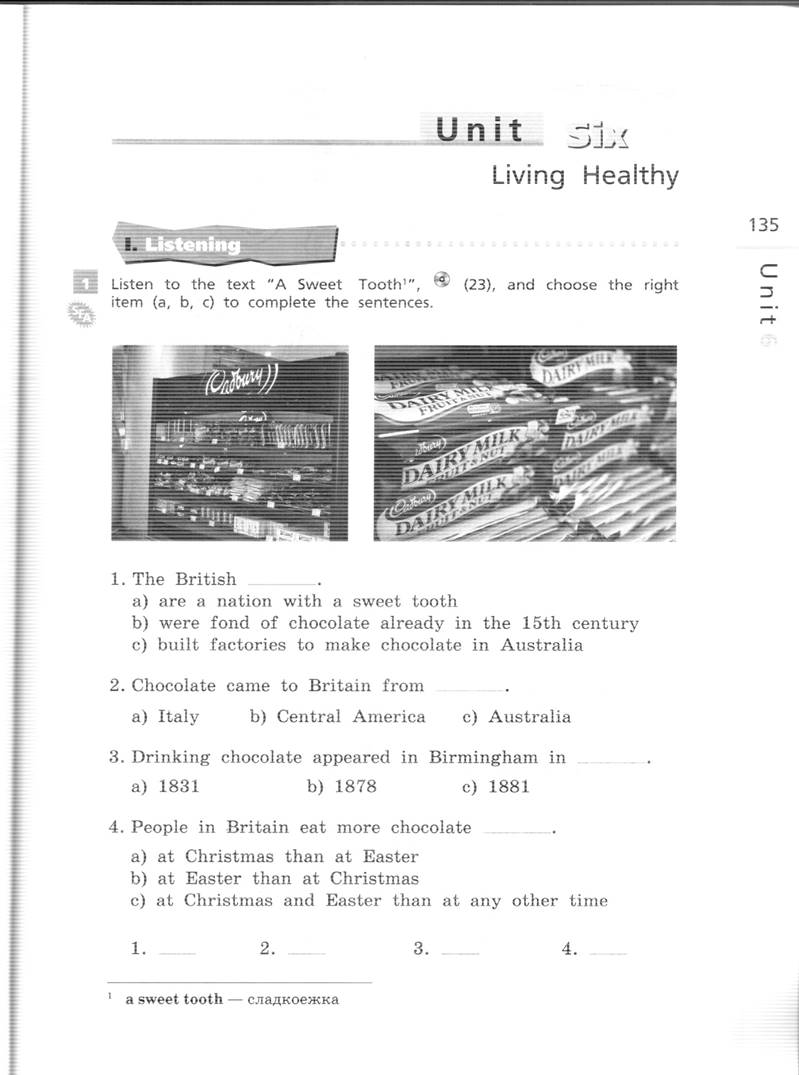
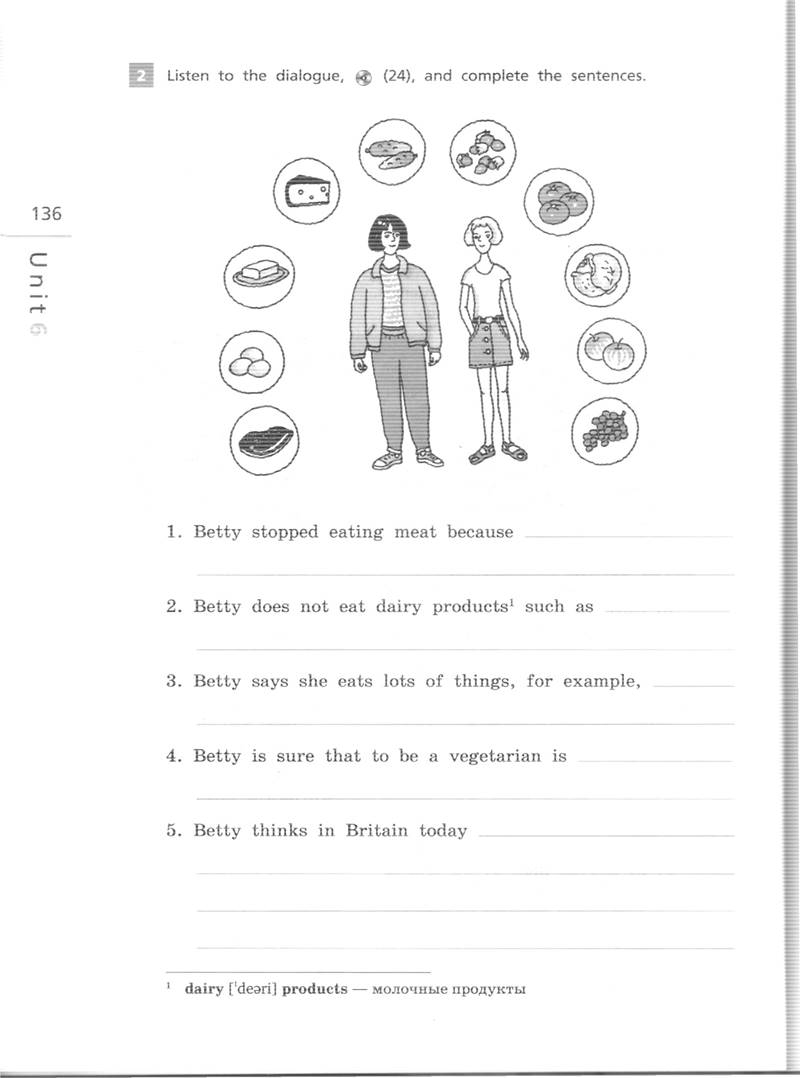
Read
|
[len9] |
[autbi:s] |
[medsn] |
|
|
[pelSnt] |
[prllskralbl |
[ha:mfl] |
|
|
['Jaolda] |
[9raot] |
['hederk] |
137 |
|
[rr'knva] |
['rarerk] |
[to:lmaust] |
|
|
[istnmak] |
[ISWDlao] |
|
|
Read the words in transcriptions, then listen and check, (25).
c
Read the words, word combinations and sentences, then listen and check, (26).
a) weakness, quickly, weigh, cough, enough, lung, sneeze, ankle, painful, knee, weight, freshness, stomach, hardly, wrist
b) a sore throat, a heart attack, to prescribe a medicine, to catch a cold, to do somebody harm, junk food, to come down with a cold, a medicine for a weak heart, to recover from earache
c) Has the doctor prescribed you anything for your earache? It really hurts me to swallow. Jack is recovering from a bad cold. Fast food can do a lot of harm to your health. They took Anna with stomachache. We hope you'll recover soon. If you have toothache, go to your dentist. Jill tries to control her weight. Take this medicine for your cough. What can cure him of this disease?
Read the texts (1—5) and match them with the titles (a—f). There is one title you don't have to use.
a) The Food from Abroad
b) The First Meal of the Day
c) Fast Food in Britain
d) Very Popular British Food
e) Typical Food at Different Times of the Day
f) Places to Have Meals
1. Some people like "to go to work on an egg" — they eat an egg for breakfast before going to work. But many more breakfast on cornflakes while others have toast with butter and marmalade. And, whatever they eat, most people drink tea or coffee.
2. And where do people eat their food when they are at home? Breakfast is usually a quick meal, eaten in the kitchen. They may eat dinner in the kitchen, in the dining room or the living room, often in front of the television. The British often have lunch at school or work.
3. Some people have their biggest meal in the middle of the day, some have it in the evening. The traditional meal is meat and two vegetables. The most popular meats are chicken, beef (from a cow), pork (from a pig) and lamb (from a young sheep). Vegetables grown in Britain, like potatoes, carrots, peas, and cabbage are very popular, but today you can buy vegetables from many countries all 138 through the year. Traditional British meals are sausages, beans l and mashed potat02 , stew (meat cooked with lots c of vegetables), and the Sunday roast.
4. Potatoes first came from South America. Farmers in Peru grew them from the 13th century on, and then the Spanish brought them to Europe in the mid-16th century. In the 17th century potatoes appeared in Britain. Potatoes are one of the most important foods in the British diet and today the British grow six million tons of potatoes every year. Some potatoes have red skins, some white. Sometimes people eat them with the skin, sometimes without. There are many different ways of cooking them.
5. Ice cream appeared in the country in the 1920s. People sold it from bicycles in the streets. Ice cream sellers shouted, "Stop me and buy one!" They rode around the streets playing music, people ran out and bought some ice cream. Nowadays ice cream has become very popular. People often eat it in cinemas and theatres in summer and in winter as a snack or as a dessert after the main dish, for example with a piece of hot apple pie.
1. 2. 3.
4. 5. Extra
Read the text and complete the sentences after it.
"Today's newspaper is tomorrow's fish and chips wrapper3 , " people said it in the second half of the nineteenth century. Why? Because many years ago sellers packed fish and chips in newspaper to keep them warm. This does not happen any more, for health rea-
1 a bean [bi:n] — 606
2 mashed potato [,mæSt pa l tertau] — KapT0(ÞeJ1bHoe mope a wrapper [iræpa] — 06ëprroqHaq 6YMara
sons, but fish and chips is still Britain's most favourite fast food.
Fish and chips appeared in the streets of London and other cities in the 1850s, and the first shops to sell them in the 1860s. The most popular kind of fish is cod l but other kinds of white fish are also possible. They cook fish in hot fat2 and eat it with chips on which people put salt or tomato sauce. Some people eat bread and butter with their fish and chips.
Fish and chips is very popular with holidaymakers at the seaside, even if the weather is so cold that they have to eat them sitting in their cars! Sometimes people choose fish and chips at the weekend as a change from cooking at home.
A favourite snack (quick food between meals) in Britain is the baked potato, or "potato in its jacket", which is a potato cooked with the skin left on it. "Potatoes in the jackets" have butter, cheese or beans on top. You can buy many other kinds of hot fast food today, for example burgers3 and fried chicken from the USA, pizza from Italy, and kebabs [kl t bæbz] from the Middle East. You may choose either to "eat in" or "take away".
Sandwiches (either bought or home-made) make a quick lunch and are also very popular. It is easy to take them to school or work. The word "sandwich" comes from a man John Montagu [ I montagju:]. He was the fourth Ear14 of Sandwich and lived in the eighteenth century in the English town of Sandwich. He liked to play games at the table for a long time without stopping for a meal. So his cook put some beef5 between two pieces of bread and made the first sandwich.
1 cod [kDd] — rrpecRa
2 fat [fæt] — 'Rup
3 a burger ['bg:ga] — 6yprep
4 an earl [3:11 — rpacþ
5 beef [bi:f] — 1'0BflAHHa
139
c
1. The British do not sell fish and chips in newspaper any
more because
a) it can't keep them warm for long
b) it is not a fashionable kind of wrapper
c) it can be dangerous for people
2. Fish and chips appeared first
a) in London and then in other cities of Britain c b) in some cities of Britain and then in its capital
c) in British cities in the middle of the 19th century
3. Fish and chips is
a) as popular with the British as "potato in its jacket"
b) more popular with the British than "potato in its jacket"
c) less popular with the British than "potato in its jacket"
4. invented sandwiches in the 18th century.
a) John Montagu, the fourth Earl of Sandwich
b) John Montagu's cook
c) The people of the English town of Sandwich
1. 2.
3. 4.
Read the text and complete it with the following phrases (a—g).
a) gas and electricity came into people's houses
b) harder to find and usually expensive
c) for example some sugars and fats
d) an island between the North Sea and the Atlantic Ocean
e) in Britain in the middle of the 20th century
f) from the eleventh to the fifteenth century
g) can buy everything under one roof
Britain is (1) For those who live near the sea, fish and shellfish have always been important. Before people had fridges to keep food cold and fresh, they started to keep fish from going bad by salting, drying or smoking it. One thing which has changed is the way some people think about some foods. For example, shellfish l like oysters were
shellfish [iJellfiJ] — MOJIJIIOCK
fairly cheap and quite ordinary. They were popular with poor people because anyone could go to a beach and pick
|
them up, for free. Today they are (2) They have become special. In older days those who lived away from the sea first ate |
|
|
wild animals, but then they began keeping sheep, cows and chickens on farms. Farmers grew fruit and vegetables. Dur- |
141 |
|
ing the Middle Ages, (3) ships brought sugar, nuts and things from far away. When sailors went to foreign places, they brought back more kinds of food. At first only rich people could buy the things brought from overseas, but slowly they became cheaper and easier to find. When (4) , cooking became much easier. Thanks to fridges and freezers people could keep food much longer. The diet of many British people is quite different to that of their parents. Today we eat bananas and oranges and can buy them all the year round but it was very difficult to find them (5) Nowadays we have many more foods to choose from and new ways to cook them, like microwave ovens. But we have less time for shopping and cooking. These days we drive to supermarkets where we (6) Some forty years ago people walked to their nearest shops almost every day. They went to the baker's for bread, to the butcher's for meat, to the greengrocer's for fruit and vegetables and so on. We also know more about health and the body today. Children grow up learning that some foods are good for us while others, (7) are bad. Some people have tries to change their diet to eat healthier food and most shopping centres have health food shops which sell lots of different natural foods. Some people, called vegetarians choose not to eat meat at all. 1. 2. 3. 4. |
c |
5. 6. 7.
|
Speaking |
Speak about the things that can help people to live healthy. Use the following word combinations.
|
|
• to be physically active |
• to sleep enough time |
|
|
to take a lot of exercise |
• not to watch television a |
|
|
to do morning exercises |
lot |
|
|
to join a sports club |
• not to spend hours before |
|
c |
• to go to the swimming |
the computer |
|
|
pool |
to keep to a healthy diet |
|
|
• to go to the gym regu- |
•e to say no to harmful hab- |
|
|
larly |
its |
e to spend much time outdoors
Say what it means to lead a healthy life. Mention the following:
healthy lifestyle;
• healthy eating habits; appropriate time to spend on work and relaxation;
• no to harmful ways.
10 Work in pairs. Complete the dialogue and act it out.
Well, what seems to be the problem?
Rob: (1) I think I have a sore throat doctor.
So, it hurts to swallow, doesn't it?
(2)
I practically can't eat.
Open your mouth wide. I would like (3)
well, it's rather red.
doctor?
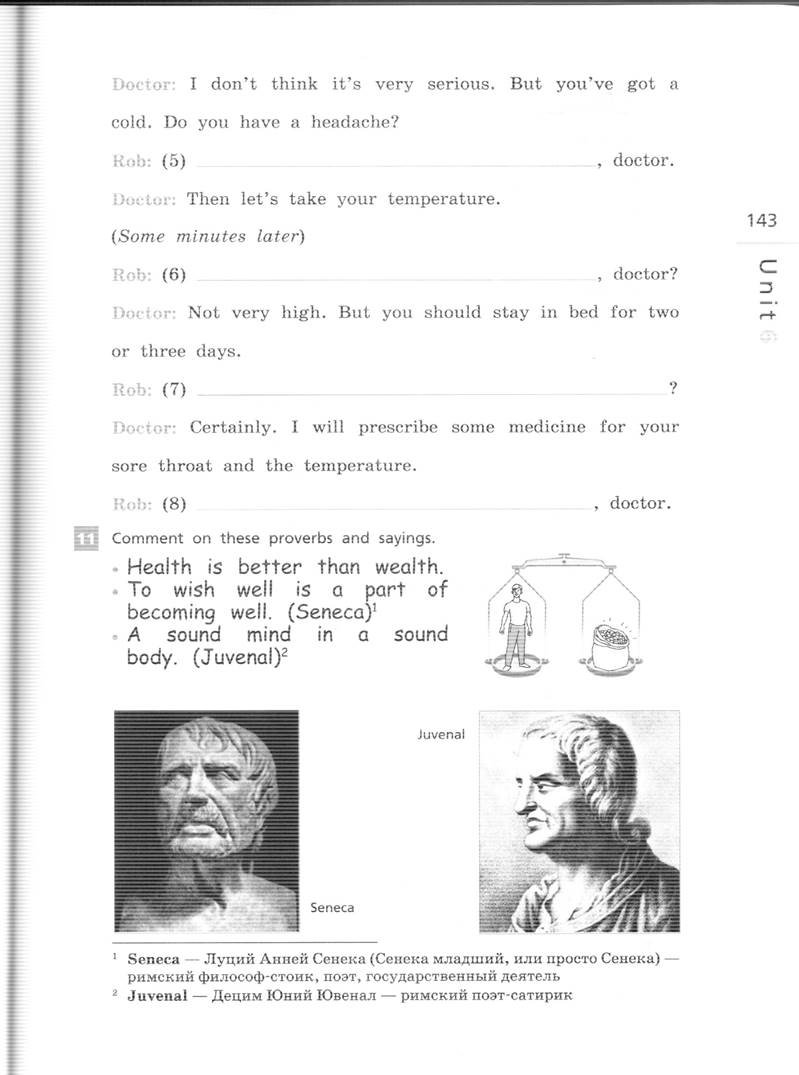
of- English—
Spell the words.
|
1. [welt] — weight |
9. [kDfi |
|
2. [lg i zærnžn] |
10. [nst] |
|
3. ['kvwkli] c |
11. [ni:] — |
|
4. [ao'bi:s] |
12. [priskralb] |
|
5. [1 nnf] |
13. [liarelkl |
|
6. [isthmak] |
14. [sni:z] |
|
7. ['Jouldo] |
15. [medsn] |
|
8. [Oraut] |
16. [hen |
13 Use the new words from the box to complete the sentences.
ankle, pain, cure, heart, meal, prescribe, swallow, sneezing, habit, coughing, toothache, weight, wrist
1. Do you usually eat at home or go out for a meal in the evening? 2. I think you should give up your harmful —s. 3. Doctor, can you something
for my pain in the left side? 4. How long have you been like that? And how long have you been smoking? 5. When you have a , you should go and
see a dentist. 6. I have had a cold since Monday. Can you
|
me of it, doctor? cold. I am coughing and running a high temperature. view, she should put on throat. She says it hurts her |
7. l am coming down with a and I think I am 8. Lily is too thin. In my 9. Betsy has a sore to 10. Brenda |
has a weak Yesterday she had a strong
in it and they took her to hospital. 11. Russian-speaking people never say they wear watches on their
12. I fell and have twisted l my left
145
Use the appropriate function words from the box to complete the sentences.
for, of, in, with, by, to, from, up, on, off, down
1. Larry is slowly recovering from his bad cold.
2. Well, what's the menu? 3. Smoking and taking drugs are dangerous people's health. 4. The weight the box was about three pounds, less than one kilogram and a half. 5. Rebecca has been studying medicine four years. 6. Phil says he has a strong pain his right side. 7. I would like to cure you your bad cough. First of all you should give smoking. 8. What medicine has the doctor prescribed your sore throat? 9. I am not sure I like Paul very much. He always walks his nose the air. 10. Chris is taking this medicine his earache. 11. Don't eat too much pizza. You will put
weight. the way, pizza is low vitamins.
12. Our football team brought the opponents their knees. 13. Little Rick is really a pain the neck.
1 to twist — BblBHXHYTb
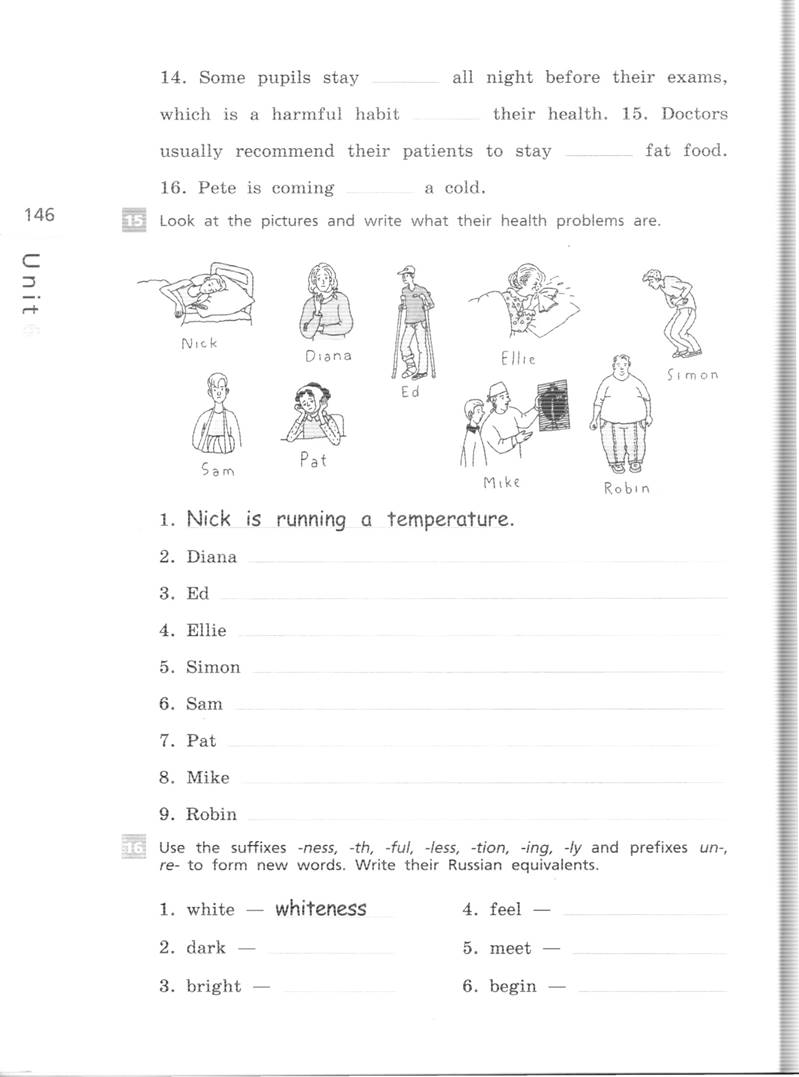
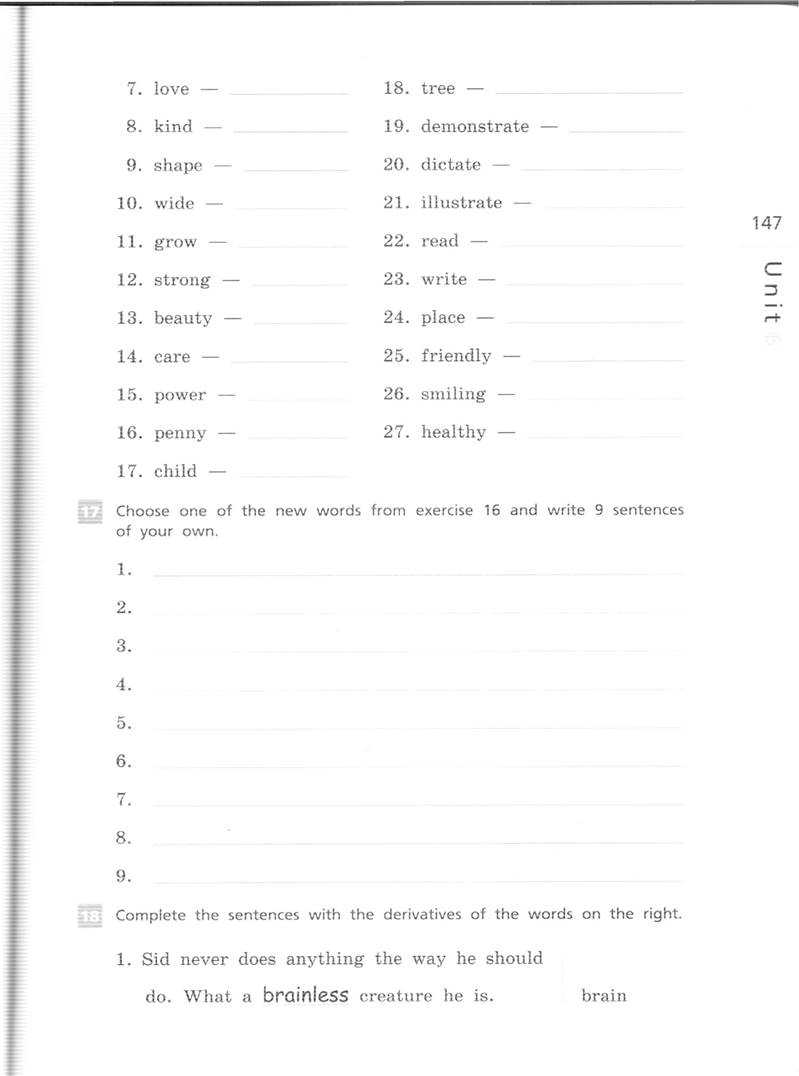
2. People should get rid l of their
|
|
habits. |
harm |
|
148 |
3. The was not easy but now the patient is recovering. |
operate |
|
|
4. It is to eat so much sugar. |
danger |
|
c |
5. John is a student of a college. |
medicine |
|
|
6. Lucy's is not very serious |
ill |
|
|
but it is very |
pleasant |
|
|
7. The of the football field is 110 metres. |
long |
|
|
8. The atmosphere was nice. |
real |
|
|
We could see and |
please, |
|
|
faces everywhere. |
smile |
|
|
9. Doctors have little about this disease. |
inform |
|
|
10. The air in the room was |
smoke |
not fresh at all.
![]() A healthier and happier
A healthier and happier
lifestyle is within reach of everyone. You (1) Simply simple
![]() to get rid — H3ÕaBHTbCfl
to get rid — H3ÕaBHTbCfl
|
follow should sensiblel and easy rules. To enjoy a high level of (2) it is important to eat adequate food, have enough rest and (3) Every (4) person
the work of your lungs, heart and blood |
well relax health regular physical |
149 c |
(7) (8) speak- circulate,
ing, aerobic exercises may give you very general good results.
![]() Rewrite the sentences using the phrases from the box .
Rewrite the sentences using the phrases from the box .
![]()
a real pain in the neck, has got a heart of gold, have her finger in every pie, walks with his nose in the air, a good head on his shoulders, eyes bigger than his stomach, to bring the country to its knees
![]()
1. ![]() She will do anything for anyone. She
is extremely kind and helpful. She has got a heart of gold.
She will do anything for anyone. She
is extremely kind and helpful. She has got a heart of gold.
2. My little sister won't leave me
alone. She is really a big problem.![]()
3. John is full of self-importance. He
is absolutely sure that he is better than other people.![]()
4. When my little cousin comes to me, he
always says he will eat everything that he can see on the table. ![]()
![]()
1 sensible ['sensabl] — pa3YMHb1ii
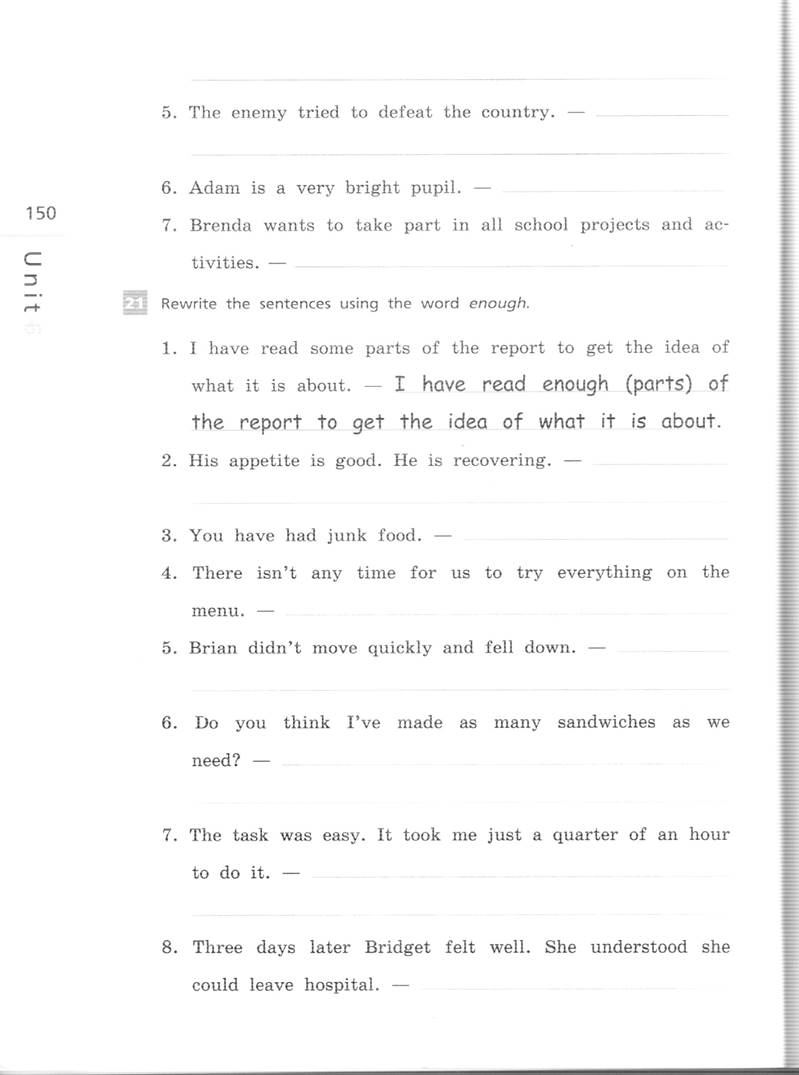
9. I didn't have so much time because I had to finish the project.
10. Bruce spoke loudly for everybody to hear his words.
151
|
Rewrite the sentences. Begin them with the word |
what. |
|
c |
||
|
1. How healthy the teenager What ager! 2. How harmful your habits are! 3. How quick the worker is! 4. How hard these jobs are! 5. How bitter l the medicine is! 6. How long our meals are! 7. How boring the meeting was! 8. How dangerous the operation is! |
a healthy |
teen- |
|
||
|
|
|
|
|
||
|
Rewrite the sentences. Begin them with the word how. |
|||||
|
1. What a clever answer it is! HOW clever swer 2. What slow runners they are! 3. What a quick meal it was! 4. What a long recovery it was! 5. What a bad cough you are having! 6. What fine weather we are having! 7. What a powerful river the Volga is! |
the |
an- |
|
||
8. What tasty dessert we had!
1 bitter ['bita] — ropbKHii
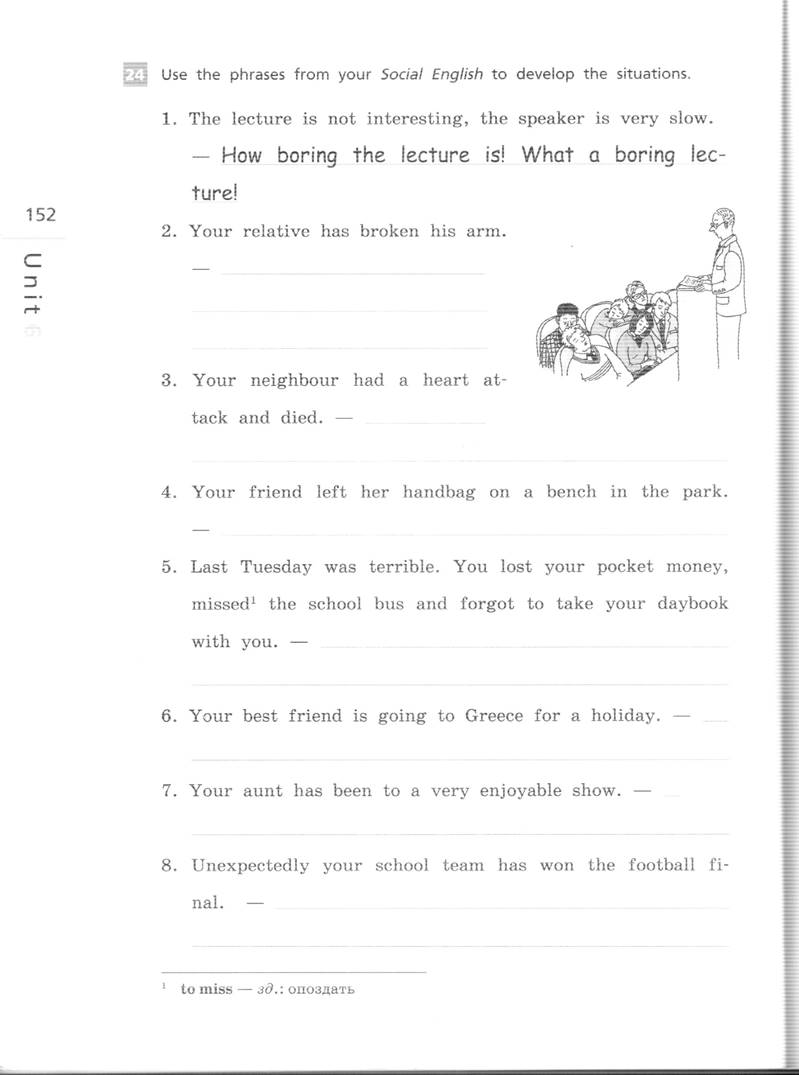
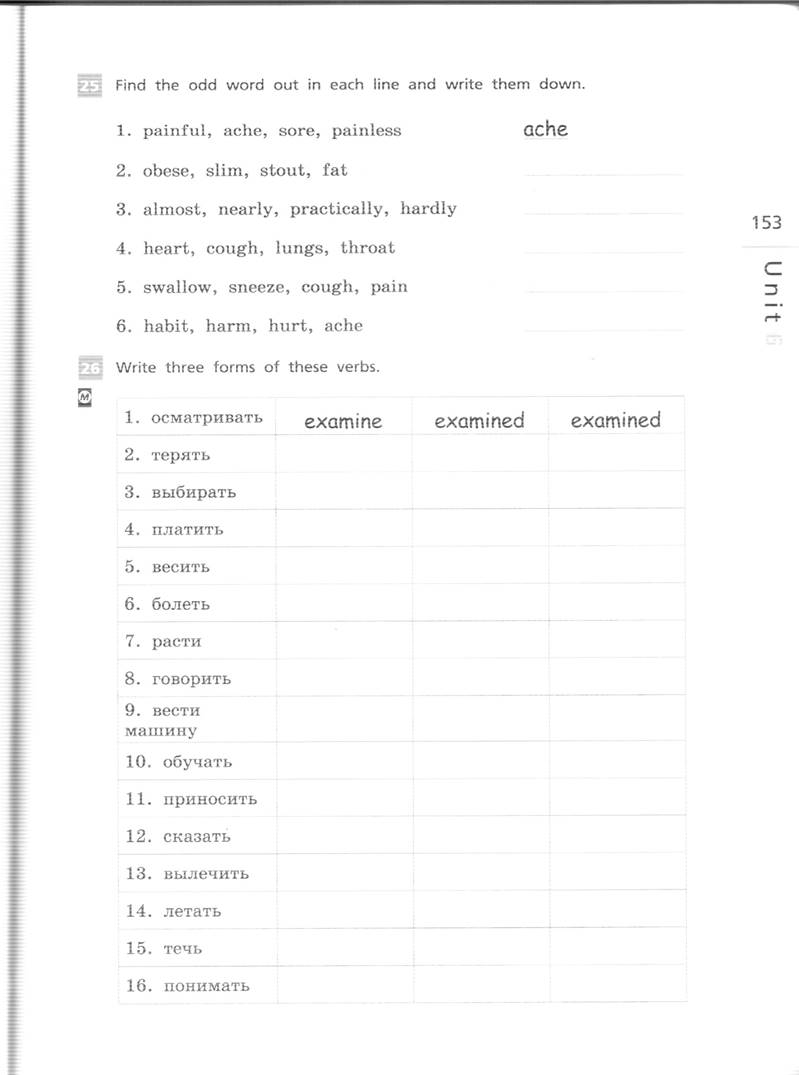
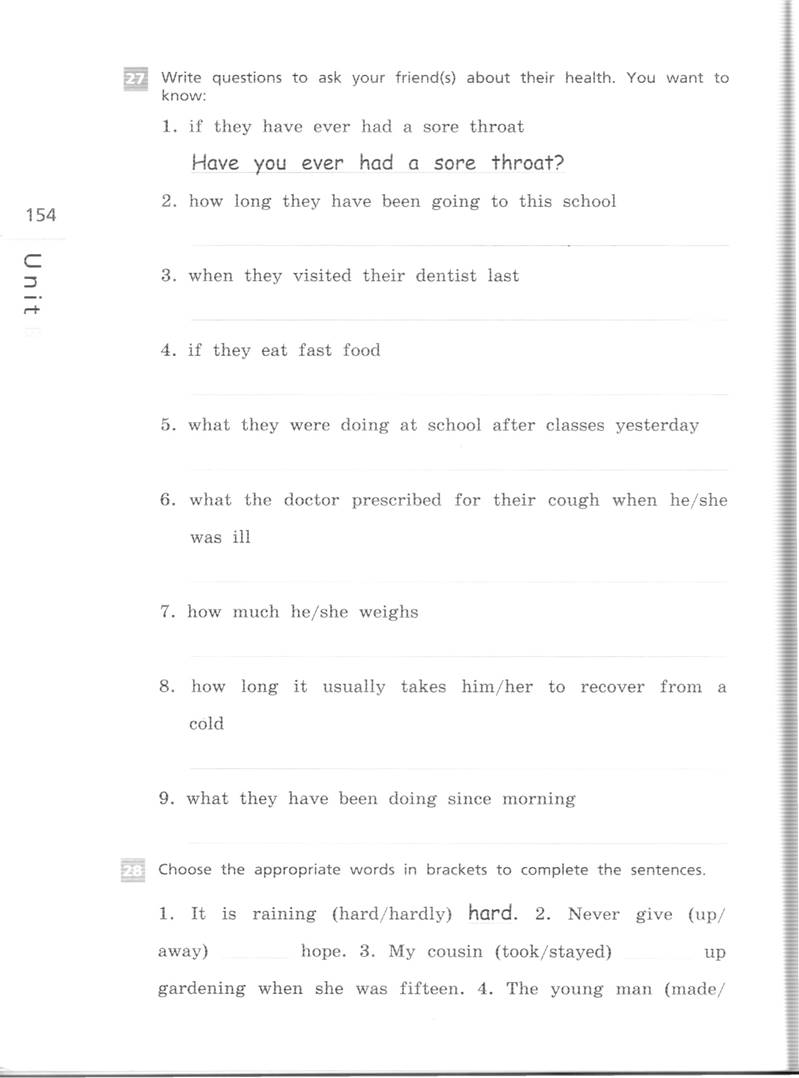
took) off with my mobile. 5. The film was very interesting and I (gave/stayed) up till 2 a.m. in the morning. 6. I can't (give/make ) out what she is
trying to explain. 7. Haven't you finished the job (yet/still)
? 8. The damage to Emma's health was (such/so) 155 big! 9. The (sick/ill) boy lay on the sofa.
10. Every winter she (comes/gets) down with the
cold. 11. Ellie has been cleaning the flat for two hours and she is (yet/ still) busy. 12. After the operation the patient could (hard/ hardly) move. 13. Don't forget to (weigh/weight ) your bags at the airport.
Choose the right forms of the verbs in brackets to complete the sentences.
1. My sister and me (think/ thinks) think that dailyl exer-
cise (is/are) very important for people.
2. The number of obese people in America (is/are) growing. 3. Mary (will play/play)
|
the piano at the party. 4. How |
long have your parents |
|
(had/been having) |
this farm? 5. We (lis- |
|
tened/were listening) |
to the piano pieces |
|
by Bach at that time yesterday. 6. |
Jenny is very tired. She |
|
(has washed/ has been washing) |
since noon. |
|
7. I (know/ have known) |
Peter all my life. |
8. We always (wanted/ have wanted) to
1 daily ['delli] — e'KeAHeBHb1ii
|
156 c |
come to London. And now we (came/ have come) here! 9. Greg (has not bought/ has not been buying) any vegetables yet. 10. When Emma (will come/comes) we (will discuss/ discuss) all the details. 11. Mum, the doctor (has not come/did not come) yet. 12. Anna (has been/is) a member of this club for several years. 30 Use the appropriate forms of the verbs in brackets to complete the story.
The father (teach) (3) the son to swim and ride horses. At the age of
three Sigurd could swim, at the age
Olaf
(feel) (5) proud of his son.
Sigurd's mother was a wonderful sto- ryteller and she often (tell) (6) her
children interesting tales about the birds and animals of their
1 a Viking— BHKHHI' |
land. Sometimes Sigurd's father (speak) (7)
to the children before they (go) (8) to bed in the evening. The children (sit) (9)
on the benches and (listen) (10) about their father's travels to strange 157 lands. The lands (have) (11) such wonderful
names...
Use the appropriate forms of the words on the right to complete the letter.
Dear Rachel,
|
1 (1) am writing to you to say that the |
write |
|
|
things (2) a bit better. Yesterday |
get |
|
|
the doctor (3) |
and (4) |
come |
|
that he |
(5) |
say, |
|
my cough. He prescribed |
some medicine for |
not like |
|
it and (6) milk with honey. |
me to drink hot |
tell |
|
Rachel, 1 (7) |
this doctor all |
know |
|
my life, I think. He is |
absolutely sure that |
|
|
the (8) |
thing for any dis- |
good |
|
ease is milk and honey. |
I hate drinking hot |
|
|
milk, and I (9) |
it. 1 (10) |
not do |
|
in bed since |
Tuesday, practically |
lie |
|
unable to do anything. I never (11) like this before. I don 't know what |
be |
|
|
(12) to me, but I hope the |
happen |
|
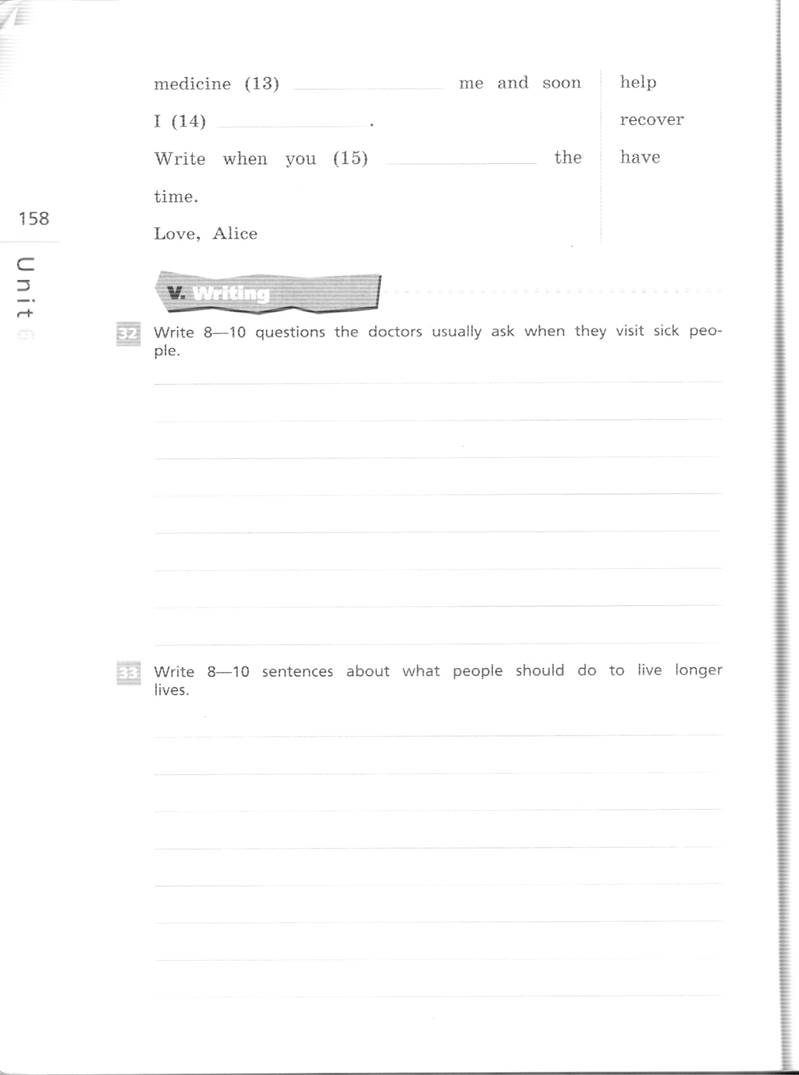
00 e @ • @
See if you know the right answer. [10]
1. Of all the bones in the human body, where is the small-
a) wrist b) ear c) ankle d) lips
159
2. Who invented the thermometer?
a) Galileo b) Faraday c) Edison d) Copernik
3. How many bones are there in the human body?
a) 106 b) 206 c) 306 d) none of the above
4. Which specialist is a children's doctor?
a) neurologist b) radiologist
c) dermatologist d) pediatrician
5. Which of these diseases doesn't start because of a virus?
a) a common cold b) hepatitis
c) poliomyelitis d) malaria
The right answers are: 1. b, 2. a, 3. b, 4. d, 5. d.
Here are two jokes mixed up. Put the lines in the appropriate order.
a) ''NNTell, every time mother talks about the wedding father says: "Poor man."
b) "Why?"
c) (returning): "She said to tell you it was none of your business. "
d) "Is the man your sister is going to marry rich?"
e) "Jimmy, run over and see how old Mrs Smith is this morning?"
f) "Why? What on earth did you ask her?"
g) "I don't think so."
h) "Just what you told me. I said you wanted to know how old she was."
160
![]()

|
В Е Р Т И К А Л Ь Учебно-методический комплекс О. В. Афанасьева, И. В. Михеева, К. М. Баранова Английский язык 5 класс О. В. Афанасьева, И. В. Михеева, К. М. Баранова Английский язык 6 класс О. В. Афанасьева, И. В. Михеева, К. М. Баранова Английский язык 7 класс О. В. Афанасьева, И. В. Михеева, К. М. Баранова Английский язык 8 класс О. В. Афанасьева, И. В. Михеева, К. М. Баранова Английский язык 9 КЈ№СС lSBN 978-5-358-14677-8
|
Учебник рекомендован Министерством образования и науки РФ К каждому курсу выпускаются рабочая программа рабочая тетрадь для учащихся книга для учителя диагностические работы
лексико-грамматический практикум электронное приложение на www.drofa.ru и аудиоприложение
методическая поддержка на www.drofa.ru
|
[1] a blackberry [blækbari] — effceBHKa
[2] an eggplant [ l egpla:nt]
—![]()
[3] a pineapple ['pamæpl] — aHaHac
[4] a booth [bu:ð] — õyažca
[5] pricey ['pražsi] — Aoporoii
[6] visible [ luzobl] — BHAHMb1ii invisible [Inluzabl] — HeBHAHMb1ii
[7] to wind up [ twayndnp] — 1104BOAHTb (o vacax)
[8] to wind up — 3ð.: 3aKaHt1HBarrb
[9] an essay [ teser] —![]()
[10] See the answers on page 159.
Материалы на данной страницы взяты из открытых источников либо размещены пользователем в соответствии с договором-офертой сайта. Вы можете сообщить о нарушении.